A Cornered Lion: Chapter 7-The Long Bloody Road
Game: Hearts of Iron III
Published: 2019-12-24, edited: 2020-01-30
Comments thread
Part of the campaign:
A Cornered Lion
Previous part:
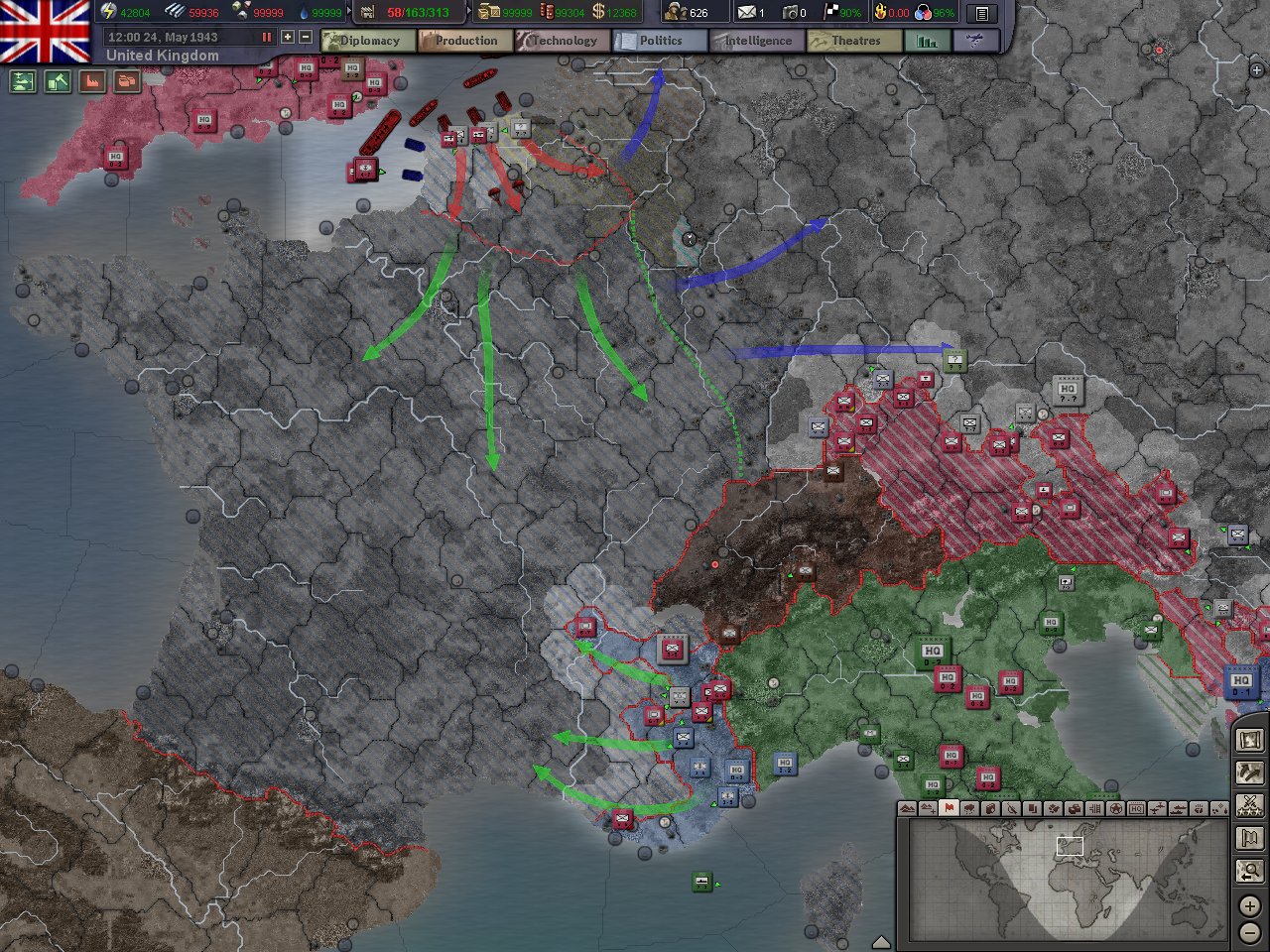
May 1943.
The war in Europe is reaching its climax.
In the west on the beaches of France, an invasion is being led by our brave Royal Marines. The whole might of the Royal Navy and the RAF is behind them. Meanwhile, our troops are pouring over the Alps into southern Germany and France. The cities of Stuggart and Munich are on the front lines and the cities of Nice and Toulon have been liberated.
In the east, allied forces are waging a brutal war of attrition against the remaining Axis forces in the Balkans. Meanwhile, Soviet Forces have reached the border with Poland and have linked up with some of our divisions in Romania.
Now it is merely a matter of driving the Axis forces back to Berlin and ending the war. But how long and how many men it will take to get there remains to be seen.
The war in Europe is reaching its climax.
In the west on the beaches of France, an invasion is being led by our brave Royal Marines. The whole might of the Royal Navy and the RAF is behind them. Meanwhile, our troops are pouring over the Alps into southern Germany and France. The cities of Stuggart and Munich are on the front lines and the cities of Nice and Toulon have been liberated.
In the east, allied forces are waging a brutal war of attrition against the remaining Axis forces in the Balkans. Meanwhile, Soviet Forces have reached the border with Poland and have linked up with some of our divisions in Romania.
Now it is merely a matter of driving the Axis forces back to Berlin and ending the war. But how long and how many men it will take to get there remains to be seen.
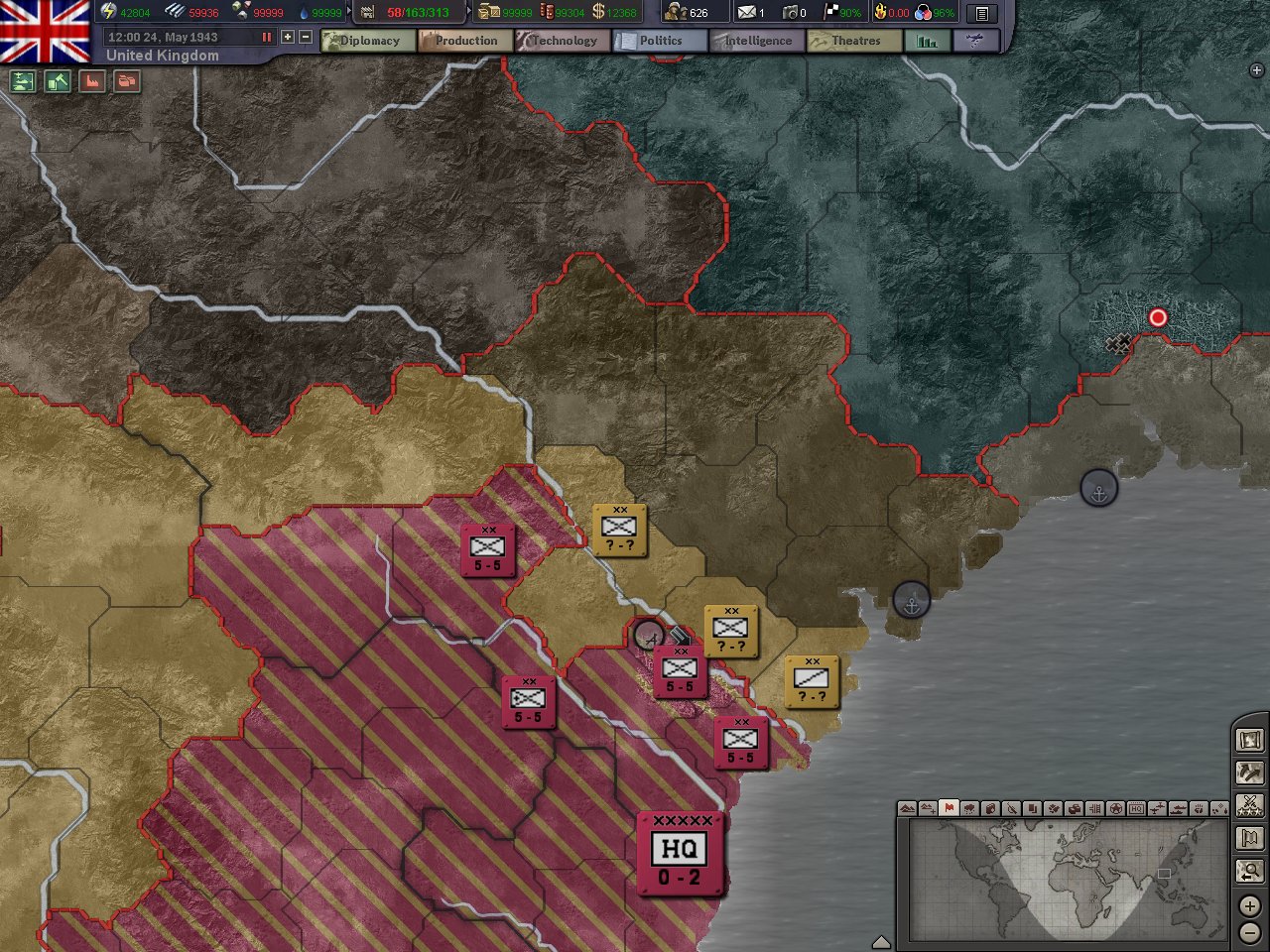
In the Far East, our troops remain locked in a bitter stalemate with the Japanese. The Japanese have over 25,000 men stuffed into the small pocket outside Hanoi and are dug in deep across the banks of the Hanoi River. Major operations in the far east are put on hold while all supplies are sent to Europe for Operation Juno and the drive to Berlin.
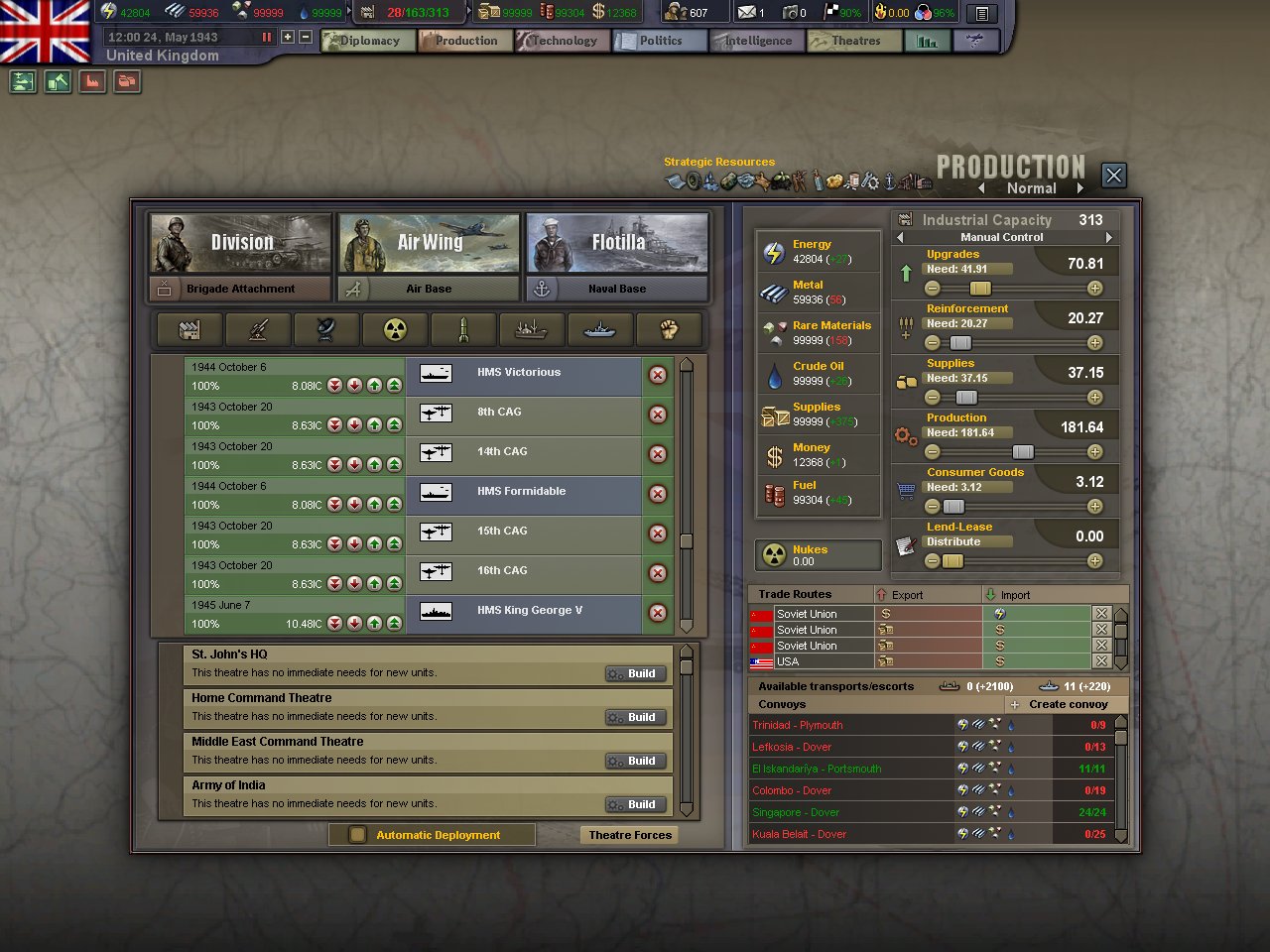
As the war continues new ships are constantly needed to wage the fight. And as a nation that has always prided itself on its navy; it is only right that the Royal Navy be at the forefront of naval technology.
Two new carriers, HMS Victorious and Formidable are ordered and construction begins immediately in Liverpool. While new and modern battleships HMS King George V, Prince of Wales, Duke of York, and Anson are laid down in Newcastle.
These new ships are all expected to be finished in the new year or in 1945 and not expected to see action in the European theater, but none the less these new ships will be vital to the defense of our Empire in the post war years. Besides, who knows how long it will take to subdue the ferocious Japanese Empire.
Two new carriers, HMS Victorious and Formidable are ordered and construction begins immediately in Liverpool. While new and modern battleships HMS King George V, Prince of Wales, Duke of York, and Anson are laid down in Newcastle.
These new ships are all expected to be finished in the new year or in 1945 and not expected to see action in the European theater, but none the less these new ships will be vital to the defense of our Empire in the post war years. Besides, who knows how long it will take to subdue the ferocious Japanese Empire.
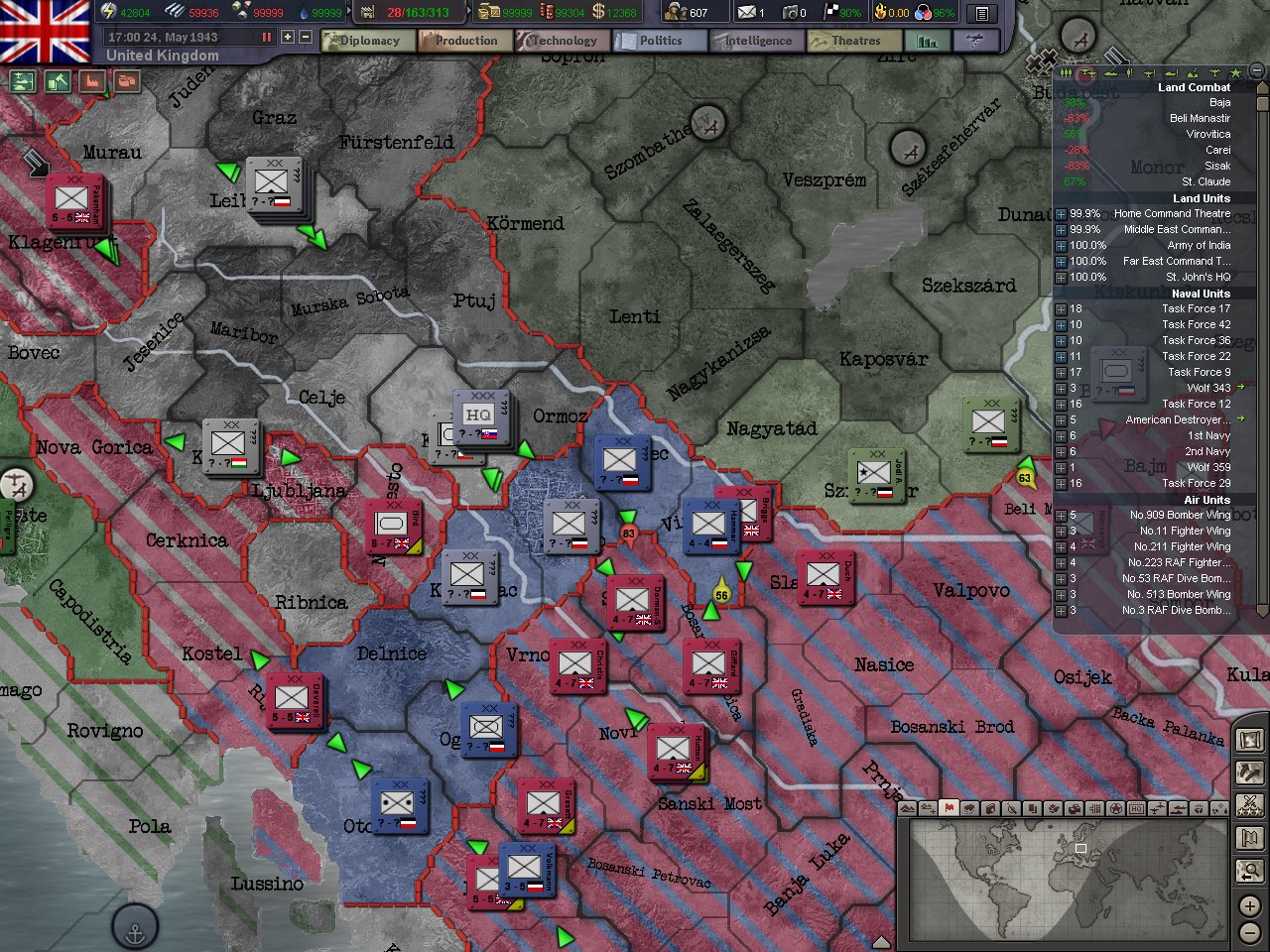
As the landings around Calais take place, fighting in Croatia is reaching its peak.
The Battle of Zagreb is reaching a new height as the German and Croatian forces begin to realize that they are close to being encirlced as British troops from the Alps begin to move behind them.
The Battle of Zagreb is reaching a new height as the German and Croatian forces begin to realize that they are close to being encirlced as British troops from the Alps begin to move behind them.
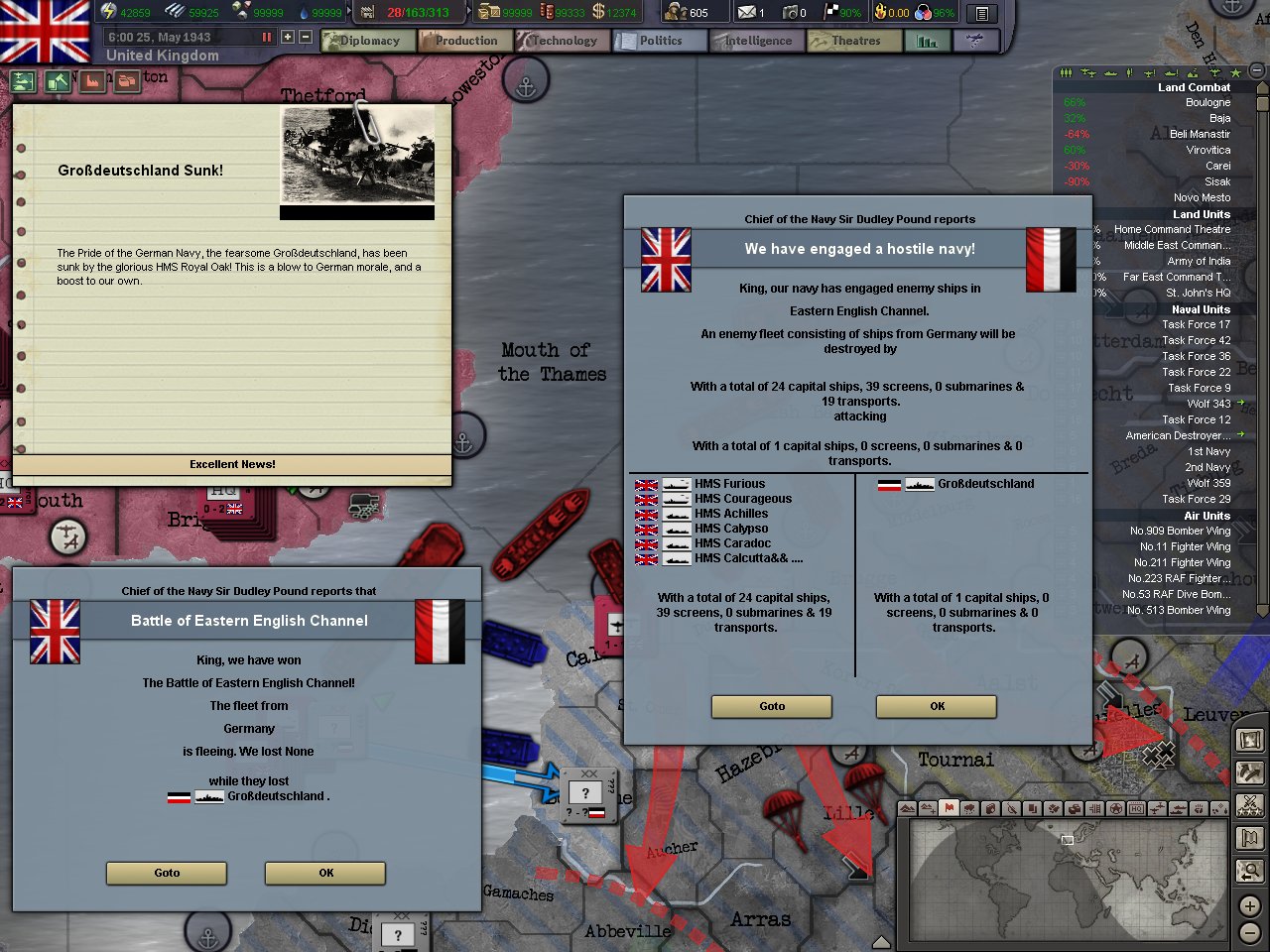
As news of our invasion of France is sent throughout the German war machine, the Axis response is formed. The Kriegsmarine is ordered to sea with their few remaining ships and the Luftwaffe is sent to the skies to contest the beaches and landing sites.
The German battleship Grobdeutchland sailed alone, into the fog and smoke of our landing sites. Having already been spotted by RAF scout planes there was no surprise in this attack.
The ship sailed into oblivion alone and without escort. The big guns of Hood, Queen Elizabeth and Rodney opened up and bombers from Ark Royal flew in to make bomb runs. The engagement lasted all of 15 minutes but was recorded in Admiral Mountbatten's war diary as the most brave act of sacrifice he ever witnessed during the war.
The German battleship Grobdeutchland sailed alone, into the fog and smoke of our landing sites. Having already been spotted by RAF scout planes there was no surprise in this attack.
The ship sailed into oblivion alone and without escort. The big guns of Hood, Queen Elizabeth and Rodney opened up and bombers from Ark Royal flew in to make bomb runs. The engagement lasted all of 15 minutes but was recorded in Admiral Mountbatten's war diary as the most brave act of sacrifice he ever witnessed during the war.
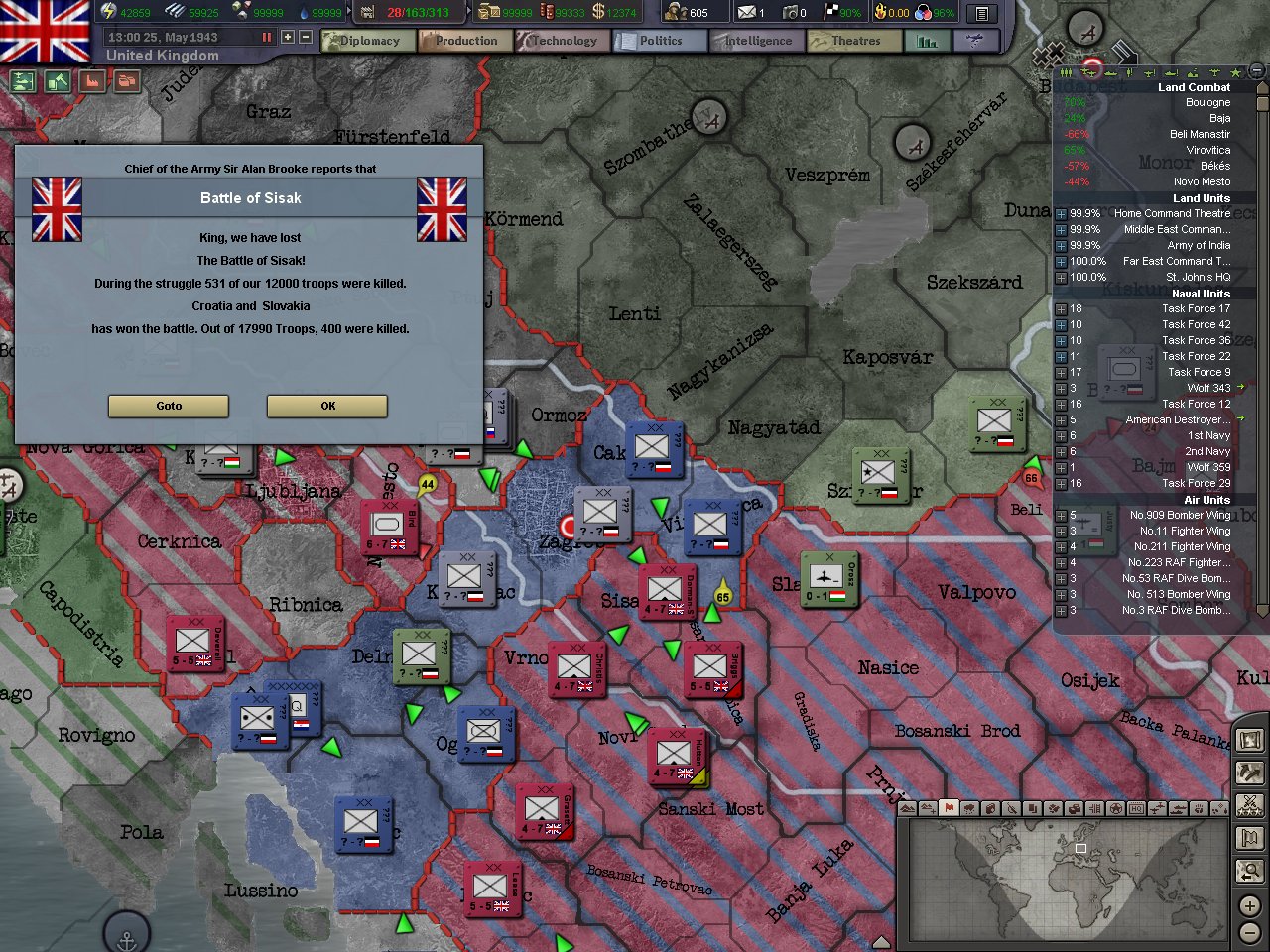
In the Balkans our forces suffered a series of defeats. Our troops had managed to carve a small pocket into Hungarian territory at a heavy cost, but everywhere else, in eastern Hungary and Croatia, our troops were forced back by savage fighting.
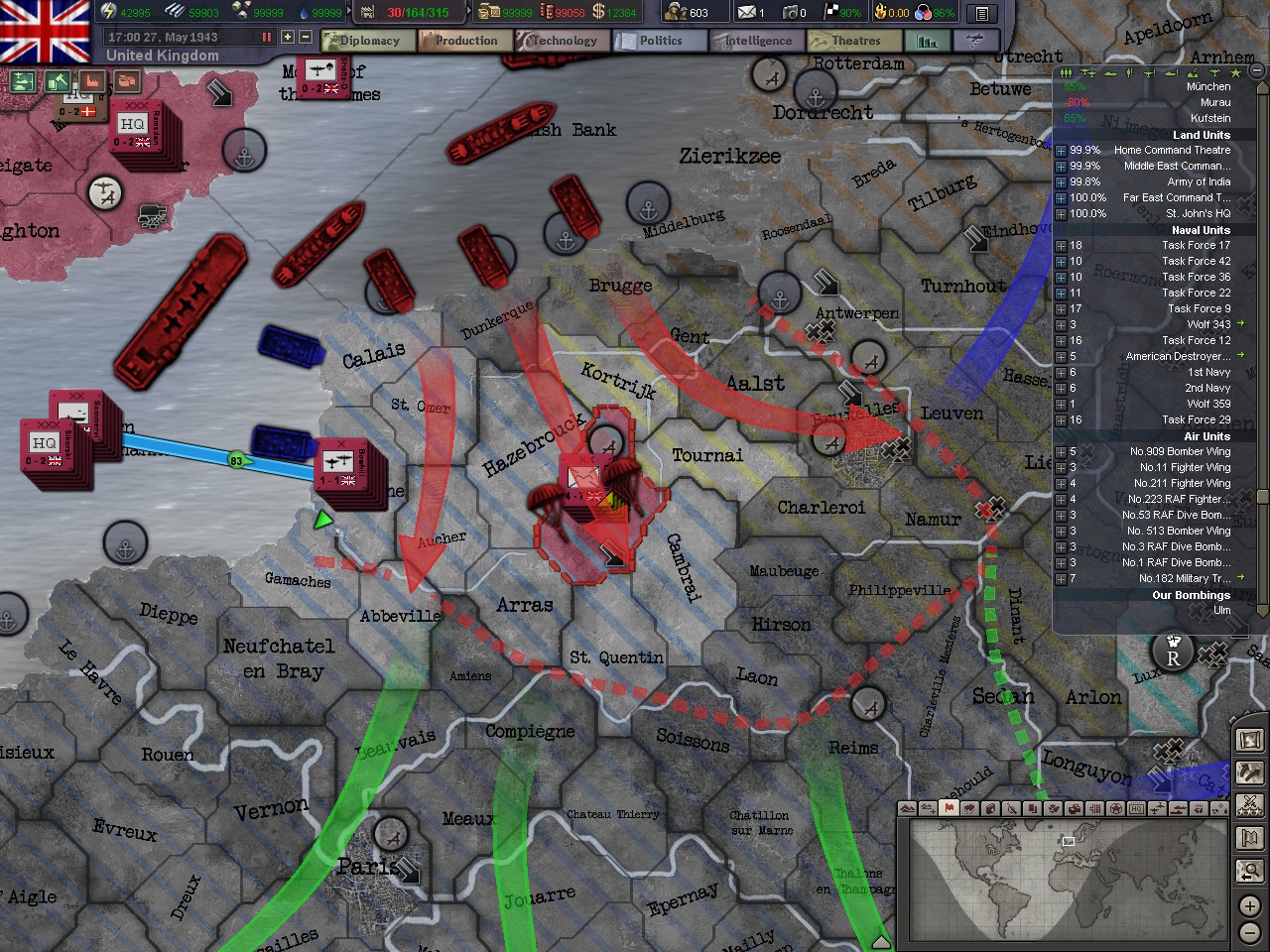
As our men still fought to secure a wide enough beachhead to bring whole divisions of Royal Marines ashore, the Paras landed on their objective. Their plan was to secure a line and be a water break for enemy reinforcements attempting to rush the beaches. Our Marine forces would have to hurry once they broke out of the beaches to link up with our Paras before their supplies ran out.
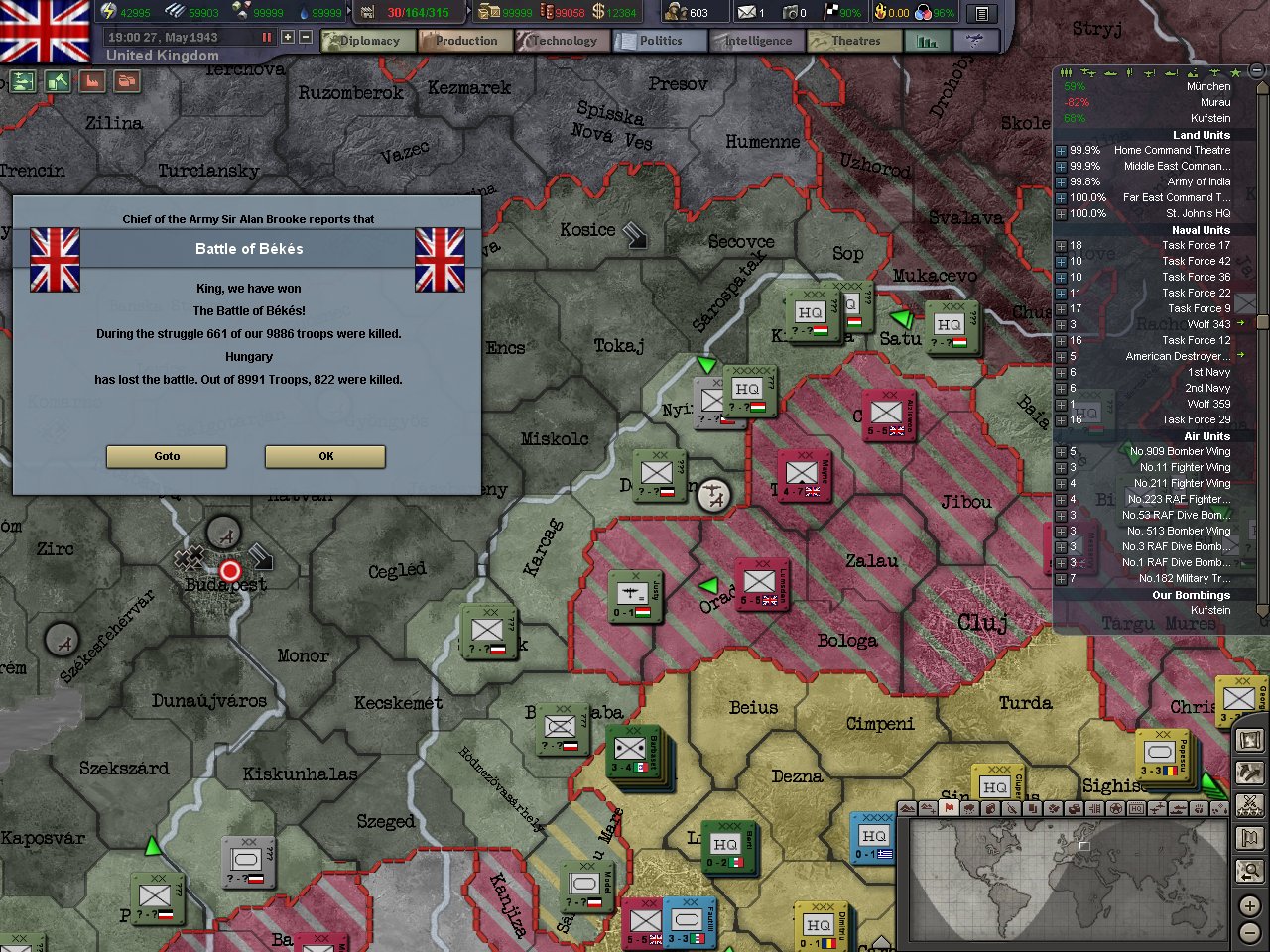
The Axis puppet nations were proving to be tough opponents. Even though the Axis lines here were held by only two corps of pure infantry, they had the advantage of terrain and defense and were making us pay for every yard that we advanced.
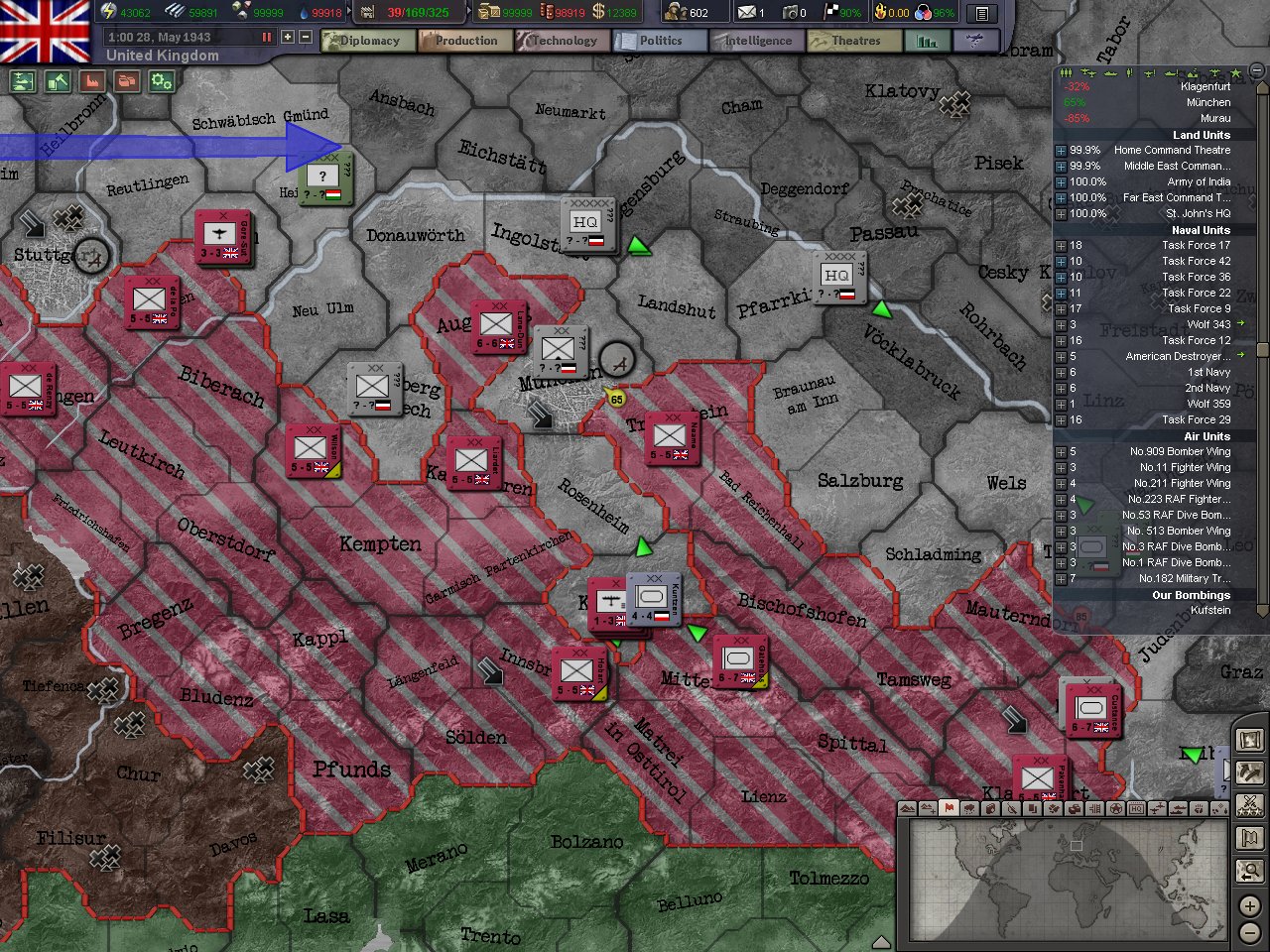
RAF bombers and fighters once again proved their worth as they destroyed German troops dug into the Alps. A German armor division had been holding back our advance in the center of our lines. It took nearly three days of continuous sorties by the RAF and several night attacks before we were able to throw back and dislodge the enemy panzers.
Even though the German lines here were thinly held and stretched. Our troops couldn't simply go around them for fear of leaving flanks open to the Germans. And with the disaster of the 1st Gurkha's still fresh in the mind of GHQ in London, no chances were taken and our troops could only advance once their flanks were clear.
Even though the German lines here were thinly held and stretched. Our troops couldn't simply go around them for fear of leaving flanks open to the Germans. And with the disaster of the 1st Gurkha's still fresh in the mind of GHQ in London, no chances were taken and our troops could only advance once their flanks were clear.
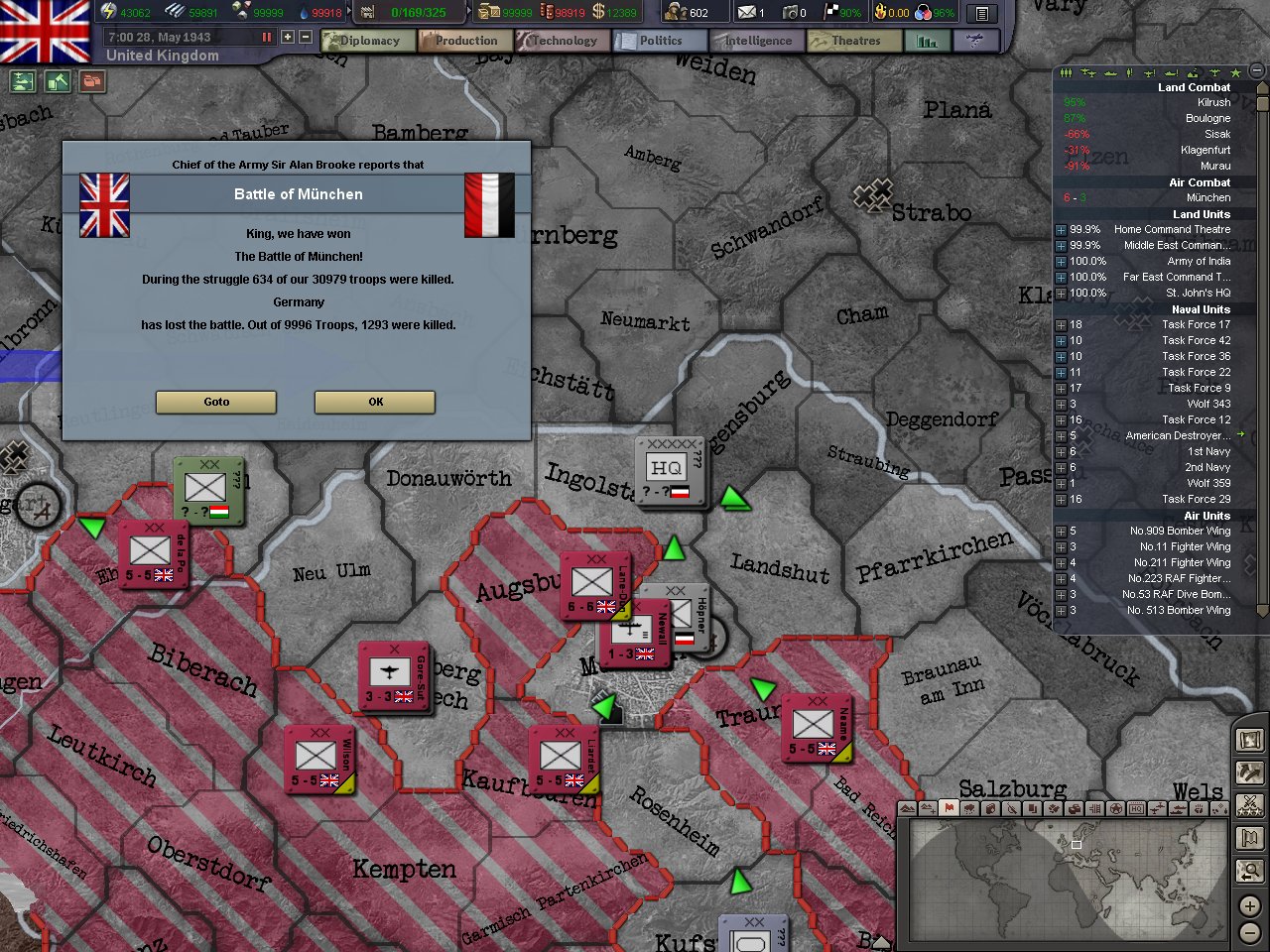
Great news came out of the heavy fighting in the Alps though. Both the cities of Munich and Stuggart fell on May 28th. The news of the capitulation of these major German cities would surely have Herr Hitler in a rage in Berlin!
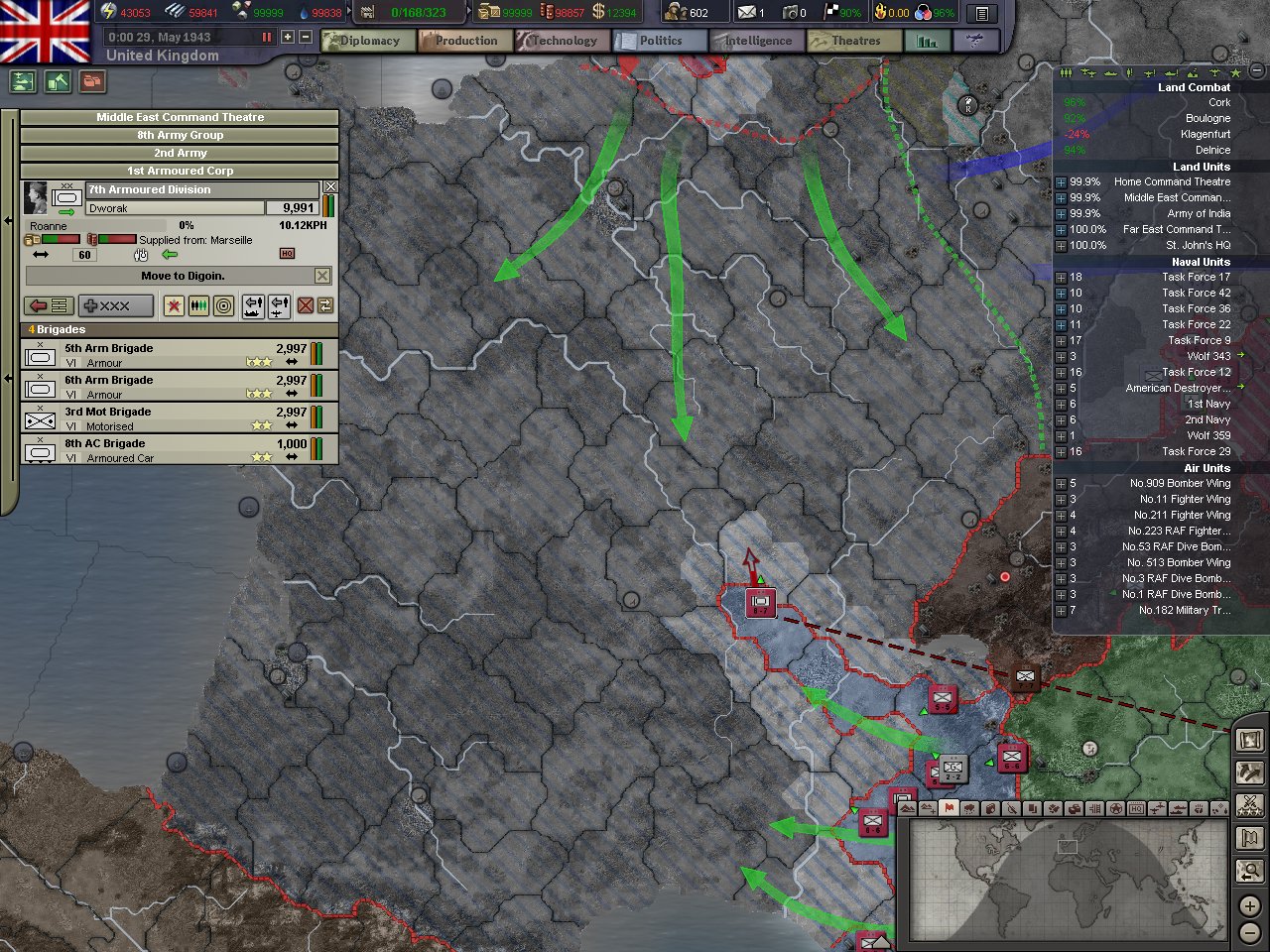
In France it was open season for the 7th Armored Division!
Having broken out of the French Alps, the men of the 7th Armored had found no Germans ahead of them and were ordered to drive to Paris and the beaches beyond!
Having broken out of the French Alps, the men of the 7th Armored had found no Germans ahead of them and were ordered to drive to Paris and the beaches beyond!
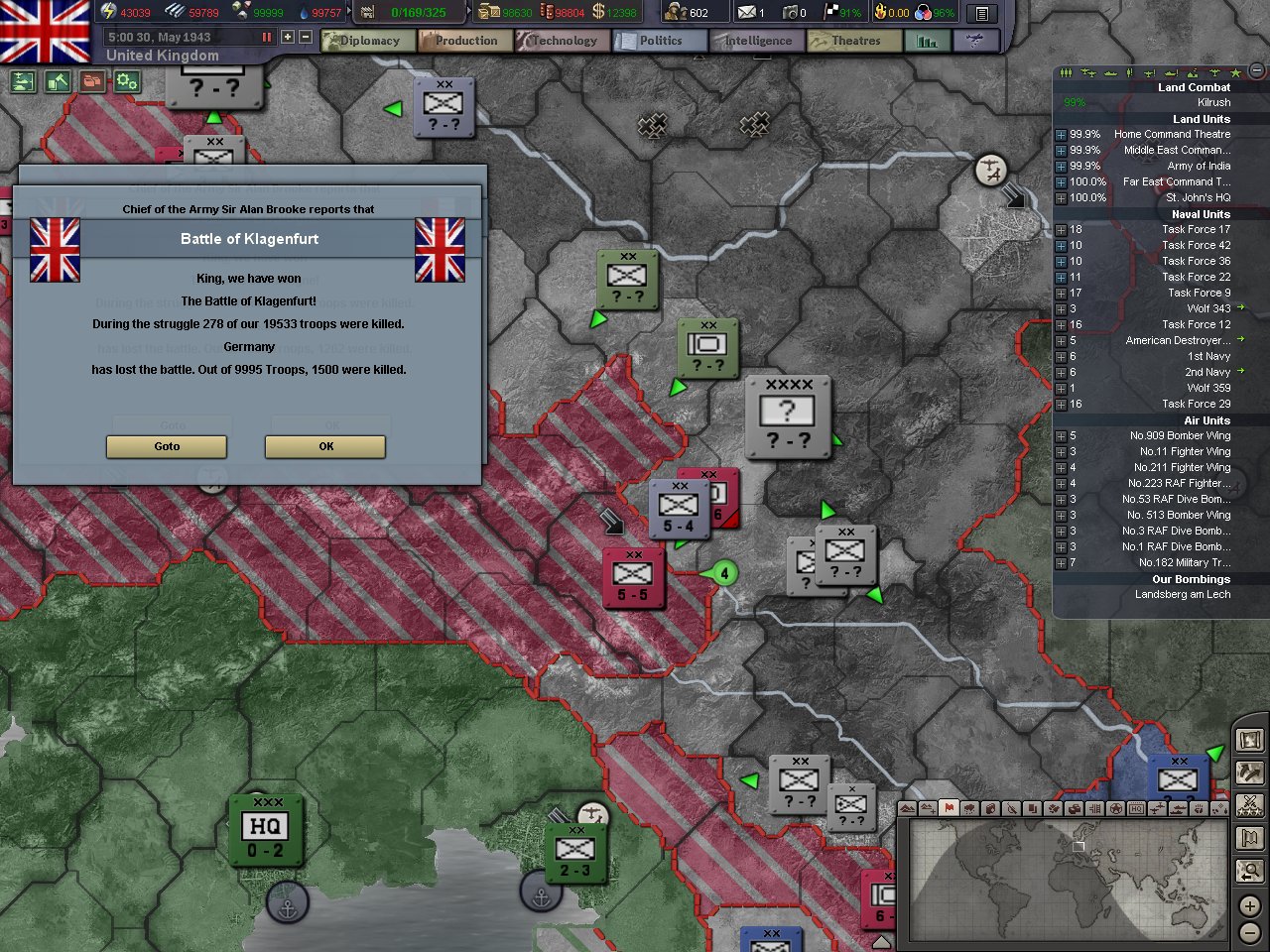
Empire troops fought a valiant defensive action in the German Alps.
Three German Divisions and a Slovakian Division were trying hard to turn back our advances in southern Germany and were practically throwing themselves at our lines. But our men held true and our lines did not waver or break. Massive German causalities were recorded with little to our own.
Three German Divisions and a Slovakian Division were trying hard to turn back our advances in southern Germany and were practically throwing themselves at our lines. But our men held true and our lines did not waver or break. Massive German causalities were recorded with little to our own.
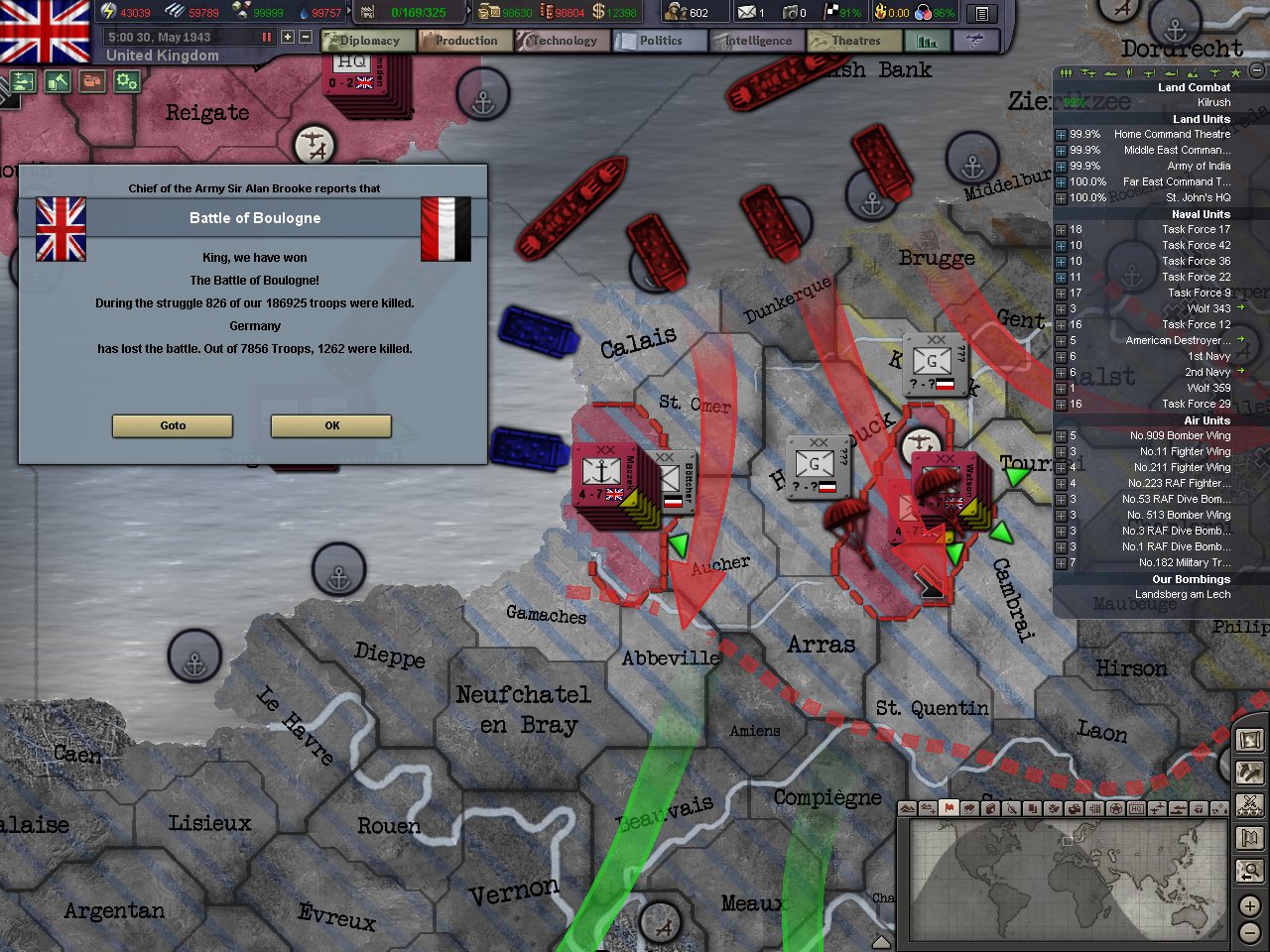
Finally, six days after the landing and already behind schedule, the first phase of Operation Juno can finally get underway. The capture of Calais and Dunkirk were given top priority so that men and materials could be brought in on to the continent. Three German static garrison divisions would have to be pushed out of the way and fought out of the area.
Royal Navy carriers and battleships would remain in the channel for a few more weeks to provide support but once the first phase line was secure these ships would return to port to prevent destruction from the still dangerous Luftwaffe.
Royal Navy carriers and battleships would remain in the channel for a few more weeks to provide support but once the first phase line was secure these ships would return to port to prevent destruction from the still dangerous Luftwaffe.
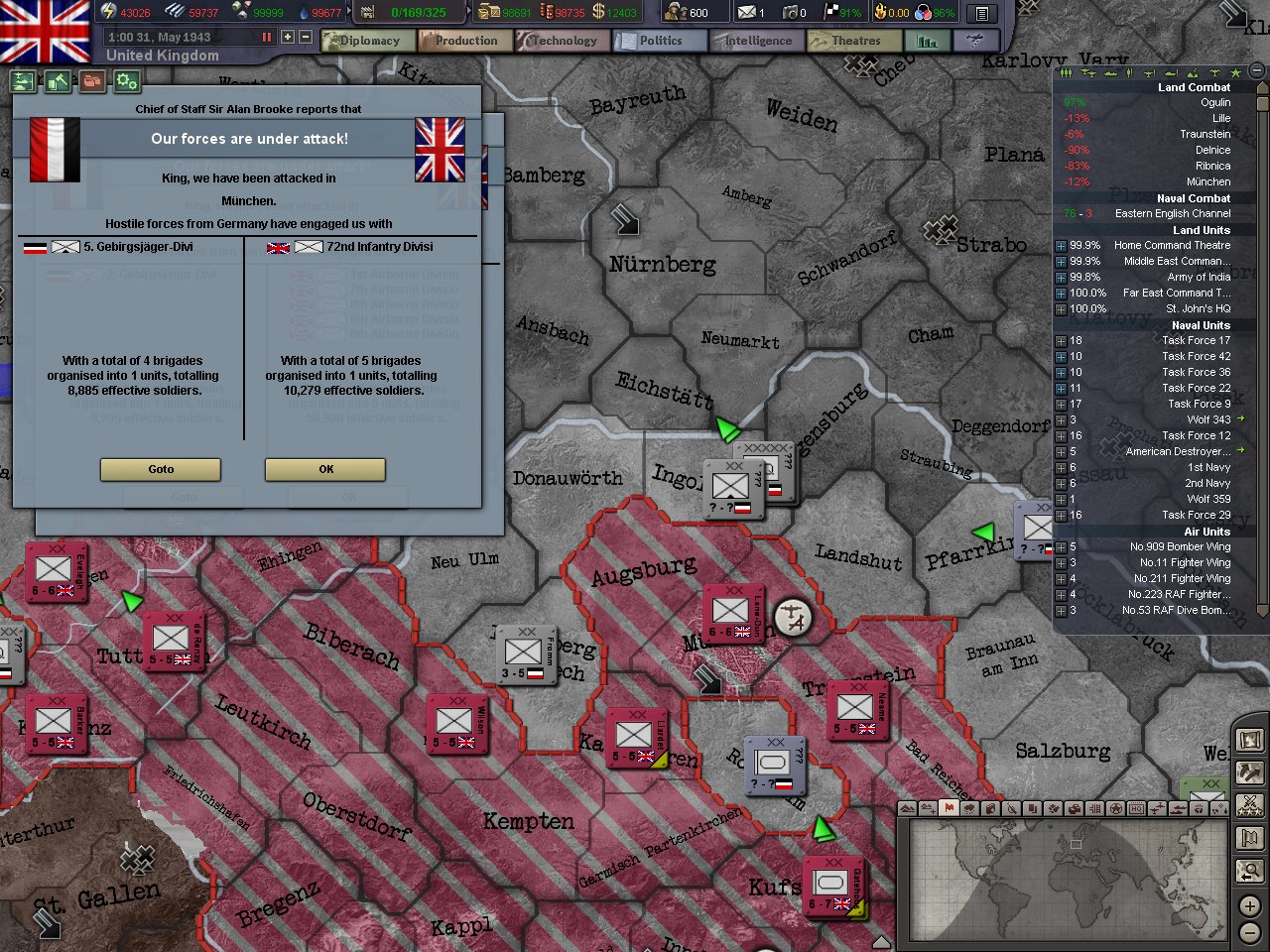
With our troops occupying the city of Munich, bells are rung across the Empire. A German counterattack to retake the city is seen off and the Germans retreat just south of Nurnberg and establish a defensive line on the river.
Along with the capture of the city came the news that a German armored division had been surrounded. The news came to the relief of Allied command as we had no armored units to meet the Germans in the Balkans or southern Germany. So destroying any and all panzer divisions we found was a top priority.
Along with the capture of the city came the news that a German armored division had been surrounded. The news came to the relief of Allied command as we had no armored units to meet the Germans in the Balkans or southern Germany. So destroying any and all panzer divisions we found was a top priority.
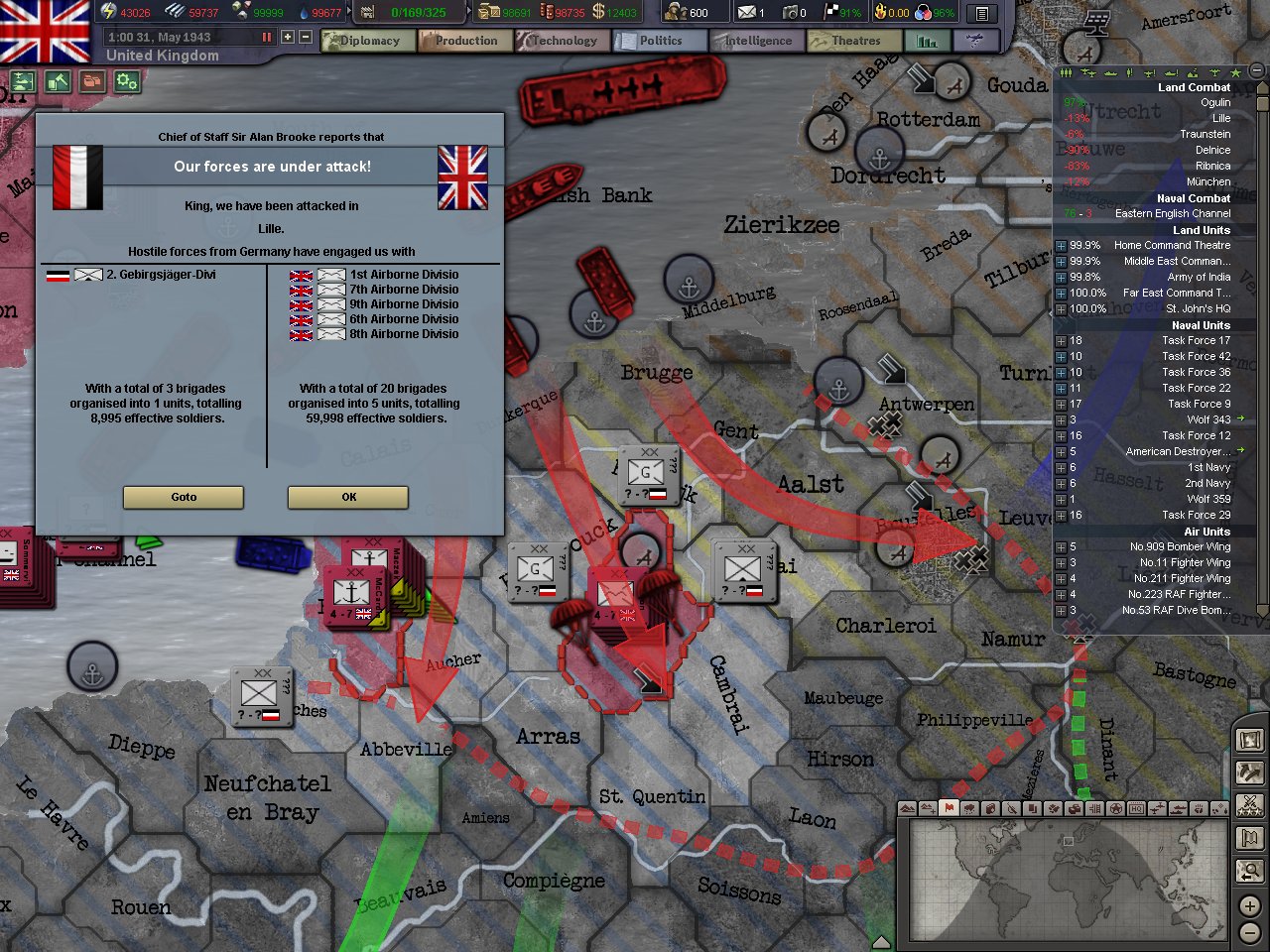
In France a German mountain division attacked our Paras.
The elite German mountain troops were attempting to reinforce their garrison divisions that were forming a scattered line to the west of the landing sites. The delaying of this elite unit would help speed up our forces getting off the beach.
The elite German mountain troops were attempting to reinforce their garrison divisions that were forming a scattered line to the west of the landing sites. The delaying of this elite unit would help speed up our forces getting off the beach.
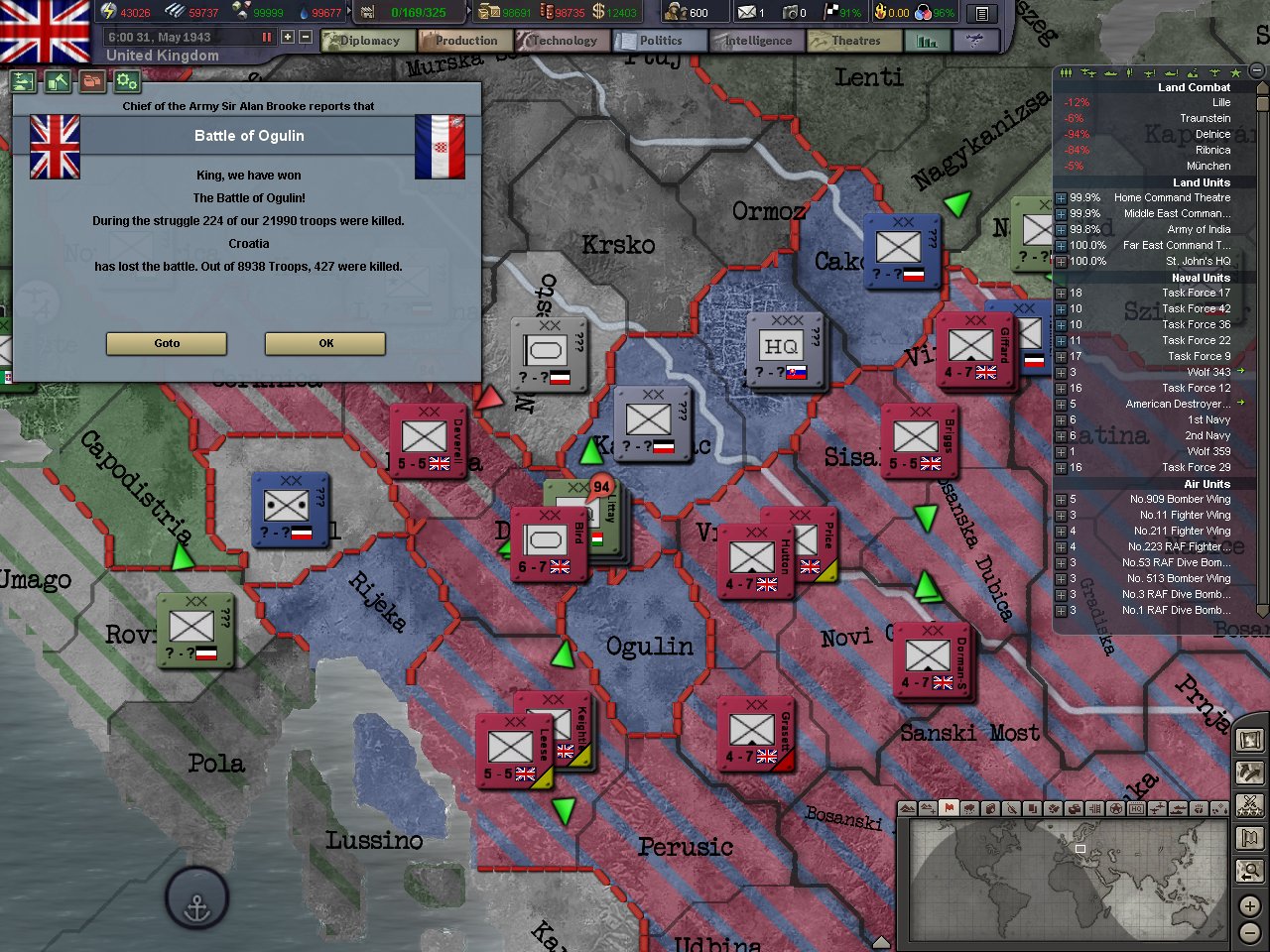
In the Balkans, further developments took place around Zagreb.
A panzer division was surrounded and destroyed in Ogulin and fierce Axis counterattacks were hammering our lines in the area. The Battle of Zagreb was becoming some of the fiercest fighting since the early days in Greece in 1941.
A panzer division was surrounded and destroyed in Ogulin and fierce Axis counterattacks were hammering our lines in the area. The Battle of Zagreb was becoming some of the fiercest fighting since the early days in Greece in 1941.
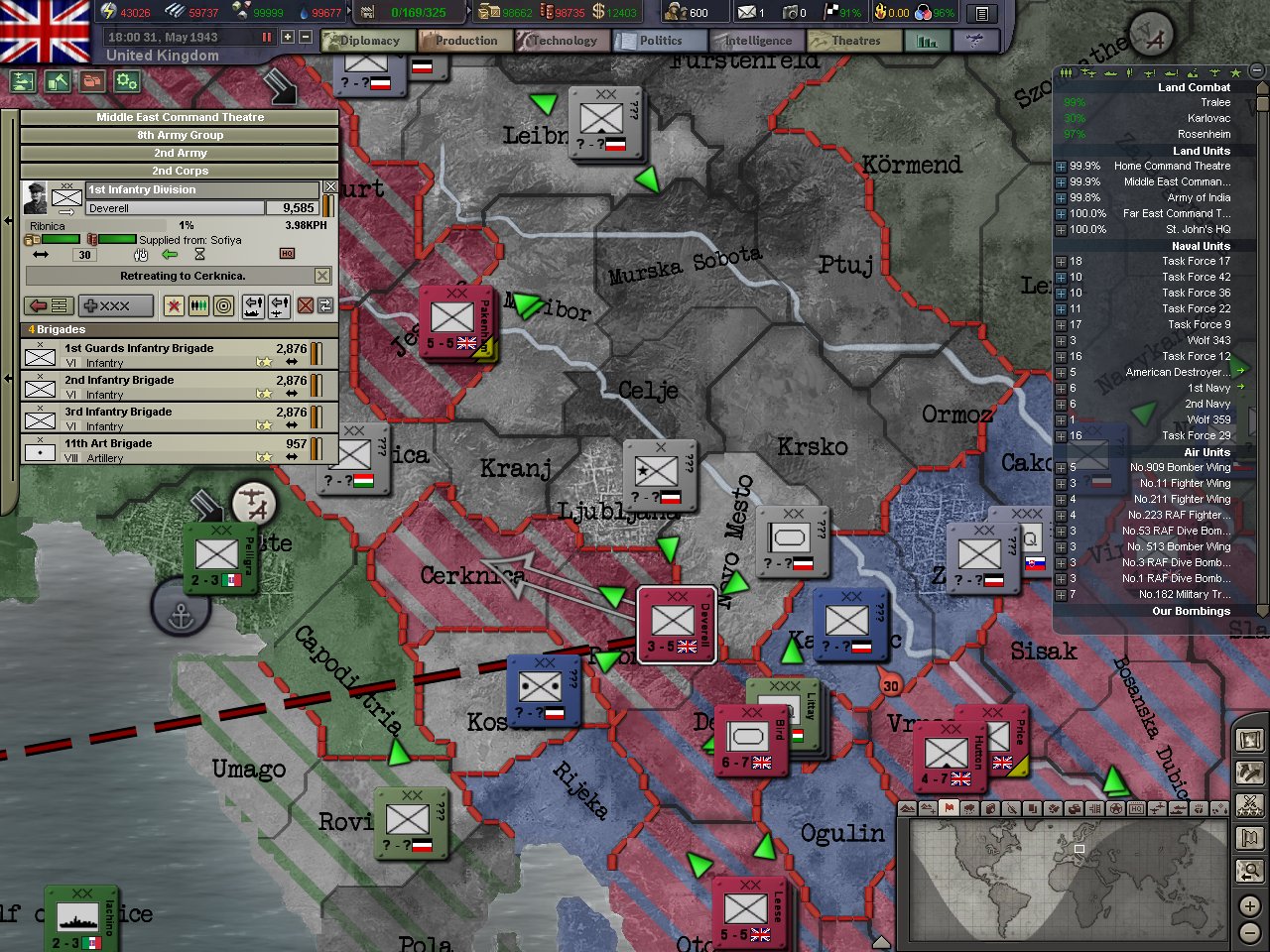
The 1st Infantry Division was forced to call off it's drive south to the Balkans and retreat back to Italy after it came under attack from a heavy panzer division, and an elite SS division. German heavy tanks and the fanatical soldiers of the SS were punishing our care free advance. Attacks that had gone unsupported against the weaker Axis forces would have to be tidied up and made with artillery and armor support where we could provide it.
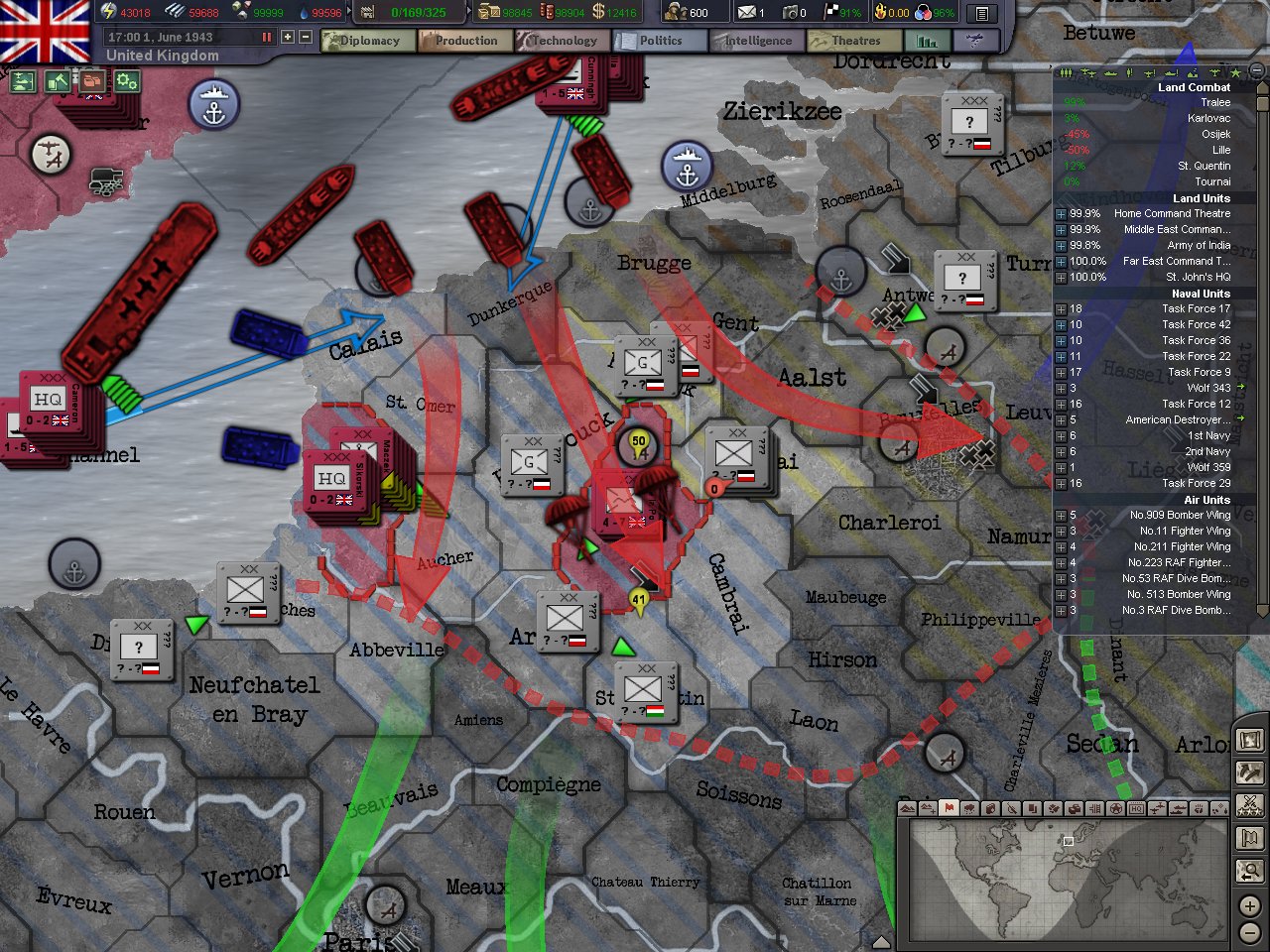
With the two Commando corps ashore south of Calais, two secondary landings were made by two infantry corps.
Patrols and reconnaissance flights had alerted us that the ports of Calais and Dunkirk were only defended by small units of Volkstrum and wouldn't stand up to a combined arms invasion.
The Paras were also being hit hard from every flank. Unable to punch out and secure their objectives, the Germans had done a good job of bringing troops into the area and stopping our boys from breaking out and securing the red line. Marines were now being given new orders to link up with the Paras before their small pocket was squeezed tighter.
Patrols and reconnaissance flights had alerted us that the ports of Calais and Dunkirk were only defended by small units of Volkstrum and wouldn't stand up to a combined arms invasion.
The Paras were also being hit hard from every flank. Unable to punch out and secure their objectives, the Germans had done a good job of bringing troops into the area and stopping our boys from breaking out and securing the red line. Marines were now being given new orders to link up with the Paras before their small pocket was squeezed tighter.

Churchill tanks of the 5th Armored Brigade, 7th Armored Division, advance across France
The 7th Armored Division keeps its advance rolling!
Having broken out of the French Alps, the 7th Armored Division has rolled without opposition north towards Paris and the beaches where our brave Marines and Paras do battle.
Now, within 100 kilometers of the City of Light more and more crowds come out to cheer the brave men of the 7th as they steamroll through occupied France.
The 7th Armored Division keeps its advance rolling!
Having broken out of the French Alps, the 7th Armored Division has rolled without opposition north towards Paris and the beaches where our brave Marines and Paras do battle.
Now, within 100 kilometers of the City of Light more and more crowds come out to cheer the brave men of the 7th as they steamroll through occupied France.
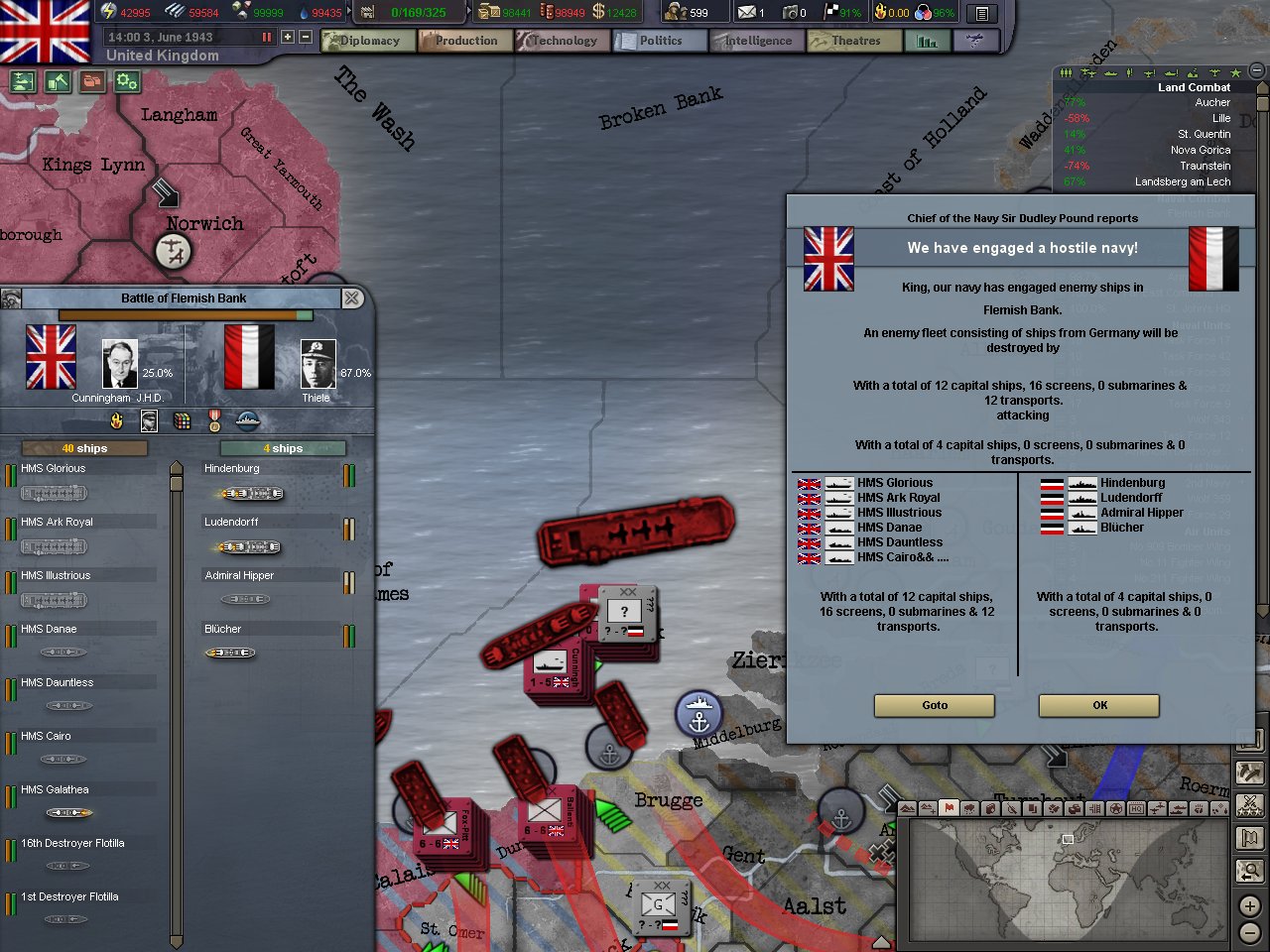
When news of even more landings on Hitler's Atlantic wall reached Berlin, the Kriegsmarine was once again ordered out to sea to stop the landings. The modern battleships Hindenburg and Ludendorff and two light cruisers plunged head first into the fleets protecting the landings!

The battleship Ludendorff is struck by shells from the battleship Queen Elizabeth, June 3 1943
Planes from the Glorious had spotted the German ships advancing and the fleets were well prepared in a battle line to meet the advancing Germans.
Three carriers were on station and had majority of their fighters and bombers in the air and ready. There were only 3 battleships on station, the Queen Elizabeth, Royal Sovereign, and the Hood. The German ships came steaming out of the mid day sun straight at our battle lines. Bombers dived in and made torpedo and bomb attacks, while the big guns of our carriers and even our heavy and light cruisers fired salvos and got in on the action. The result was the destruction of the Ludendorff and both supporting cruisers, and the crippling of the battleship Hindeburg. Which only escaped the battle due to night arriving and Luftwaffe fighter planes arriving to attack our carrier planes.
Task Force 9 Vice-Admiral Dunbar-Naismith was commended for his actions in defeating the Kriegsmainre attacks and quickly organizing the defense using both the carriers and capital ships to great affect.
Planes from the Glorious had spotted the German ships advancing and the fleets were well prepared in a battle line to meet the advancing Germans.
Three carriers were on station and had majority of their fighters and bombers in the air and ready. There were only 3 battleships on station, the Queen Elizabeth, Royal Sovereign, and the Hood. The German ships came steaming out of the mid day sun straight at our battle lines. Bombers dived in and made torpedo and bomb attacks, while the big guns of our carriers and even our heavy and light cruisers fired salvos and got in on the action. The result was the destruction of the Ludendorff and both supporting cruisers, and the crippling of the battleship Hindeburg. Which only escaped the battle due to night arriving and Luftwaffe fighter planes arriving to attack our carrier planes.
Task Force 9 Vice-Admiral Dunbar-Naismith was commended for his actions in defeating the Kriegsmainre attacks and quickly organizing the defense using both the carriers and capital ships to great affect.
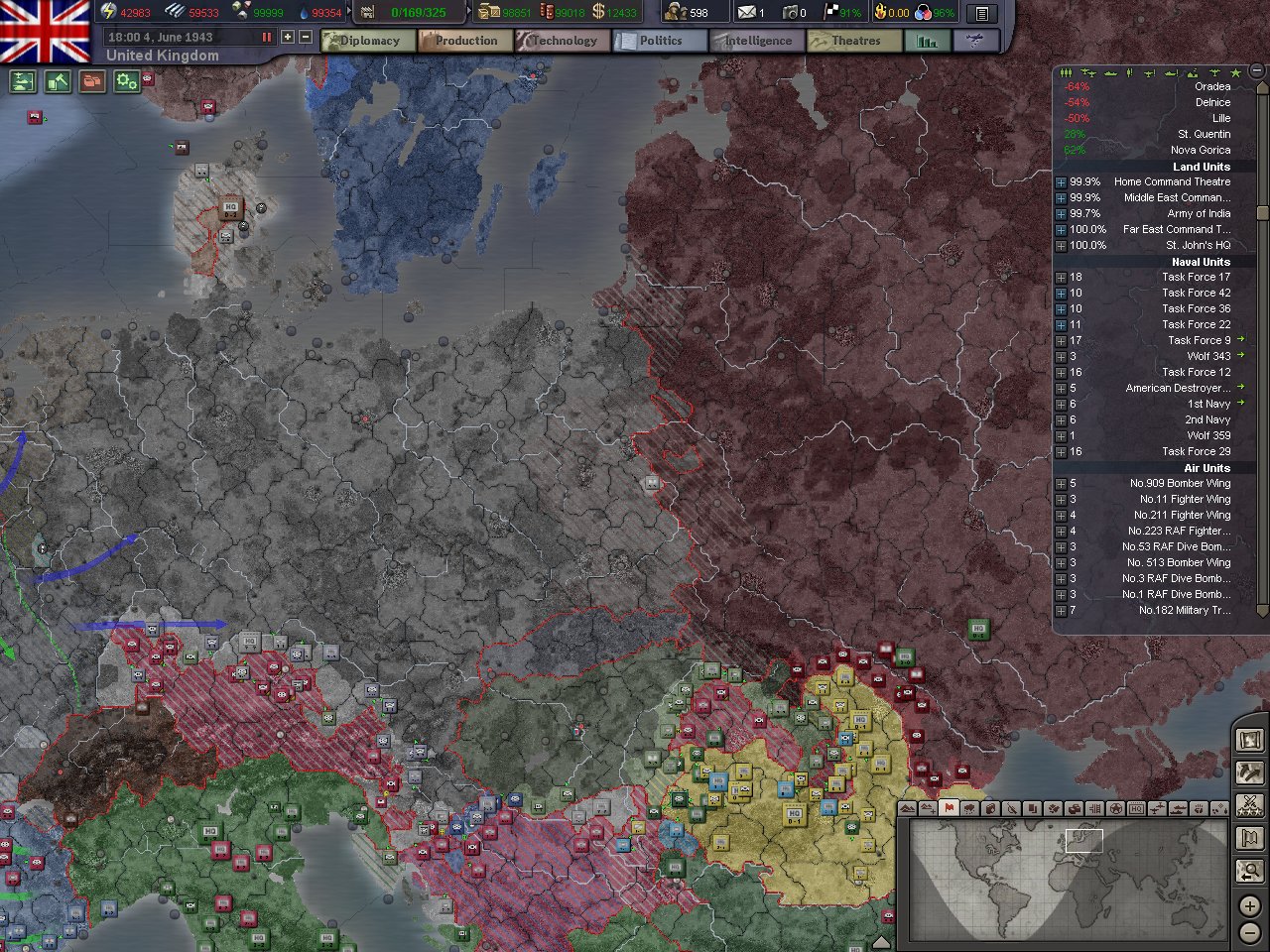
By the beginning of June the front in the east was still being fought with utter brutality that shocked us at the War Ministry.
The Soviets were pushing their way over the Polish border and were only a 100 or so kilometers from Warsaw. Pushing back the whole German eastern front with massive tank and infantry formations.
As the days went by and the situation in the east of Europe developed. Senior members of Parliament, mainly the Prime Minister and his close allies along with the King himself urged and ordered GHQ in London to take Berlin before the Soviets could. They demanded that British pride must be upheld by seizing the capital of Berlin and that it would position us and the Empire at the forefront for post-war negotiations.
The Soviets were pushing their way over the Polish border and were only a 100 or so kilometers from Warsaw. Pushing back the whole German eastern front with massive tank and infantry formations.
As the days went by and the situation in the east of Europe developed. Senior members of Parliament, mainly the Prime Minister and his close allies along with the King himself urged and ordered GHQ in London to take Berlin before the Soviets could. They demanded that British pride must be upheld by seizing the capital of Berlin and that it would position us and the Empire at the forefront for post-war negotiations.
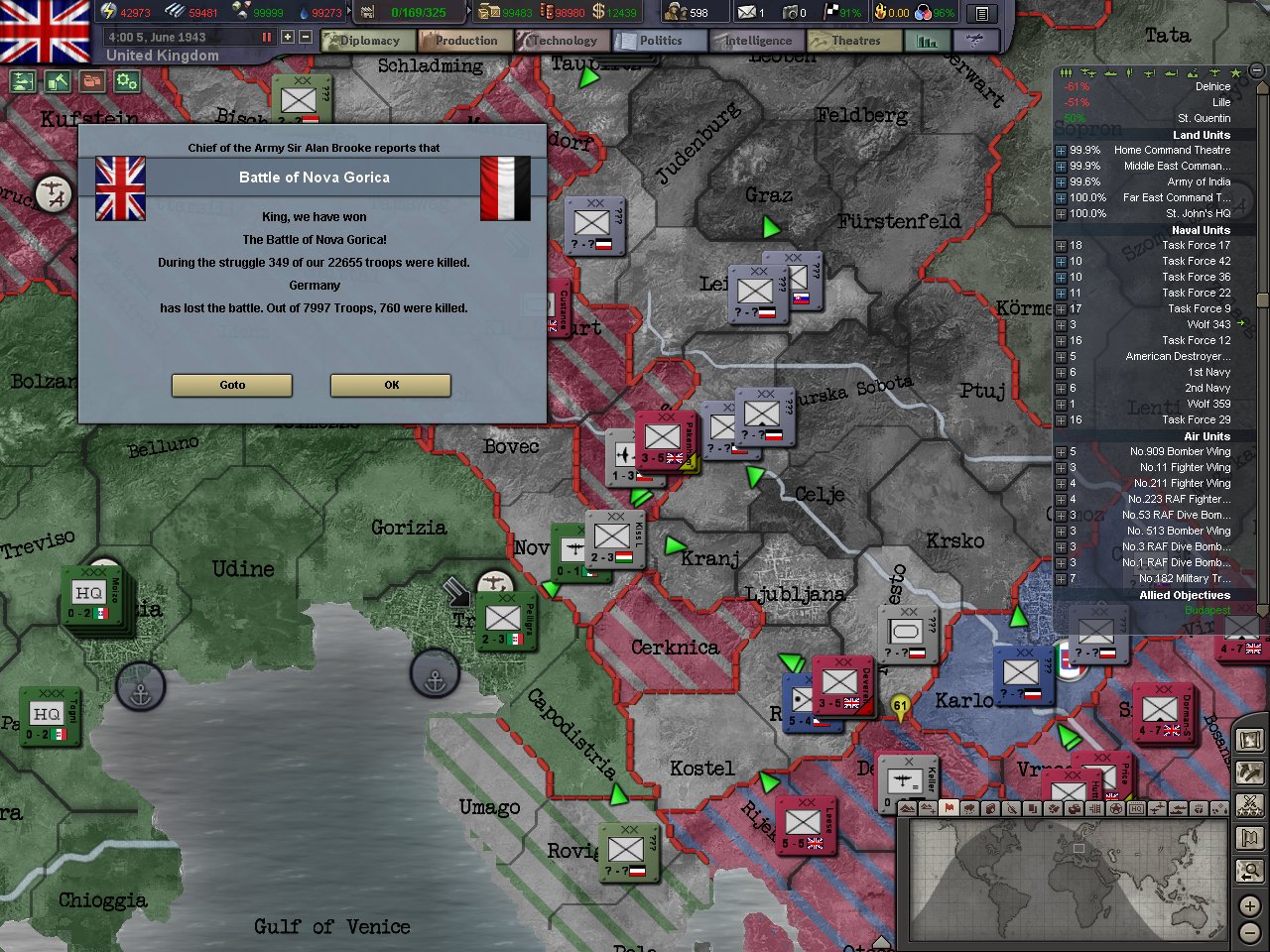
Since the finishing of the war in Italy, the Italian army had mainly been reforming and reorganizing itself after the beatings it took during the two years it was in the Axis. This was their first real combat engagement against their former allies and it helped stop a German thrust trying to get behind our Alps line. If we could get reliable Italian support in the Balkans it would make advancing much easier.
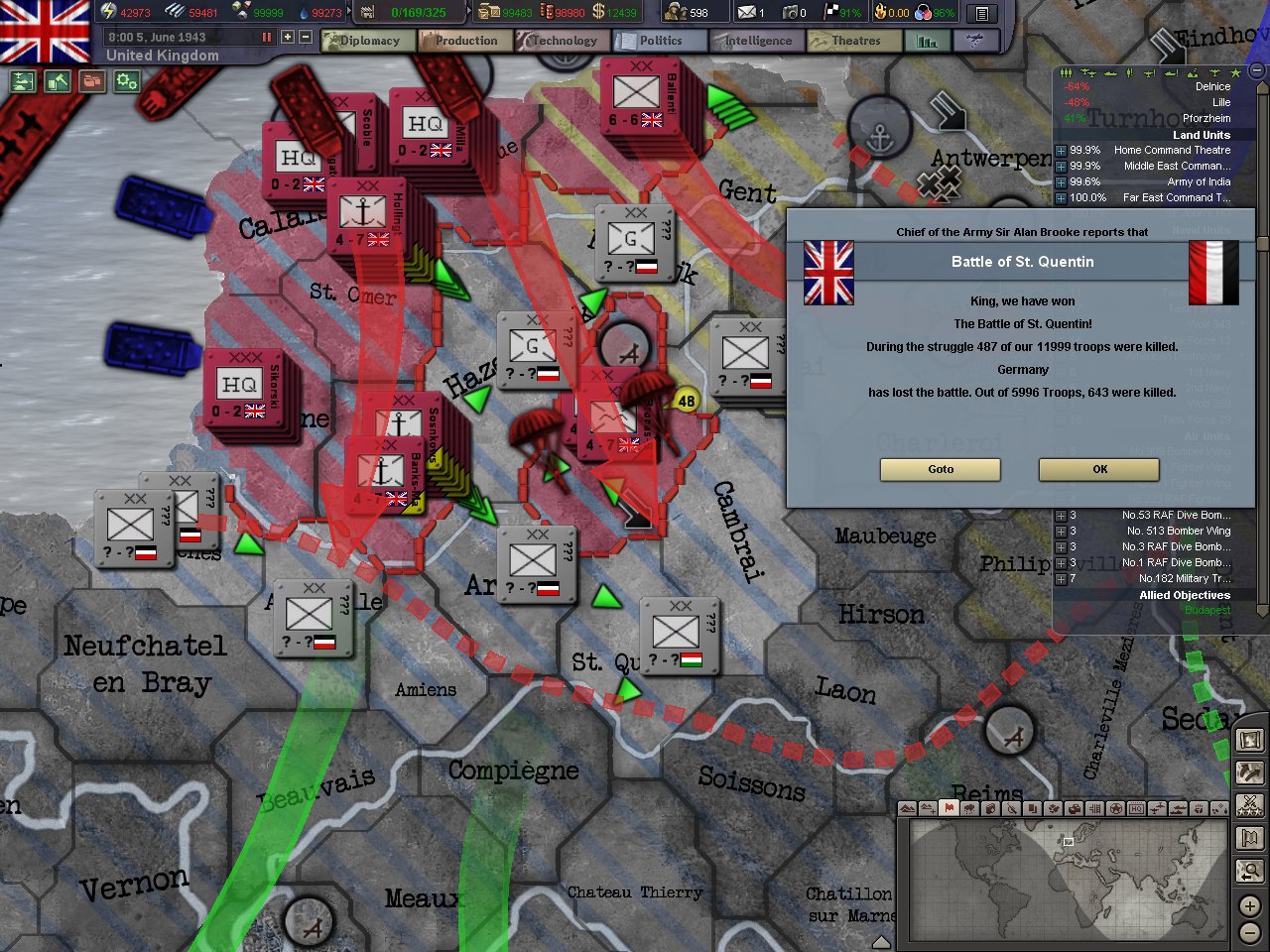
In France our Airborne troops finally managed to make some gains in the direction of St Quentin and pushed back an Axis division. At the same time Marines from the landings on the coast were closing in on being able to link up with the Airborne pocket.
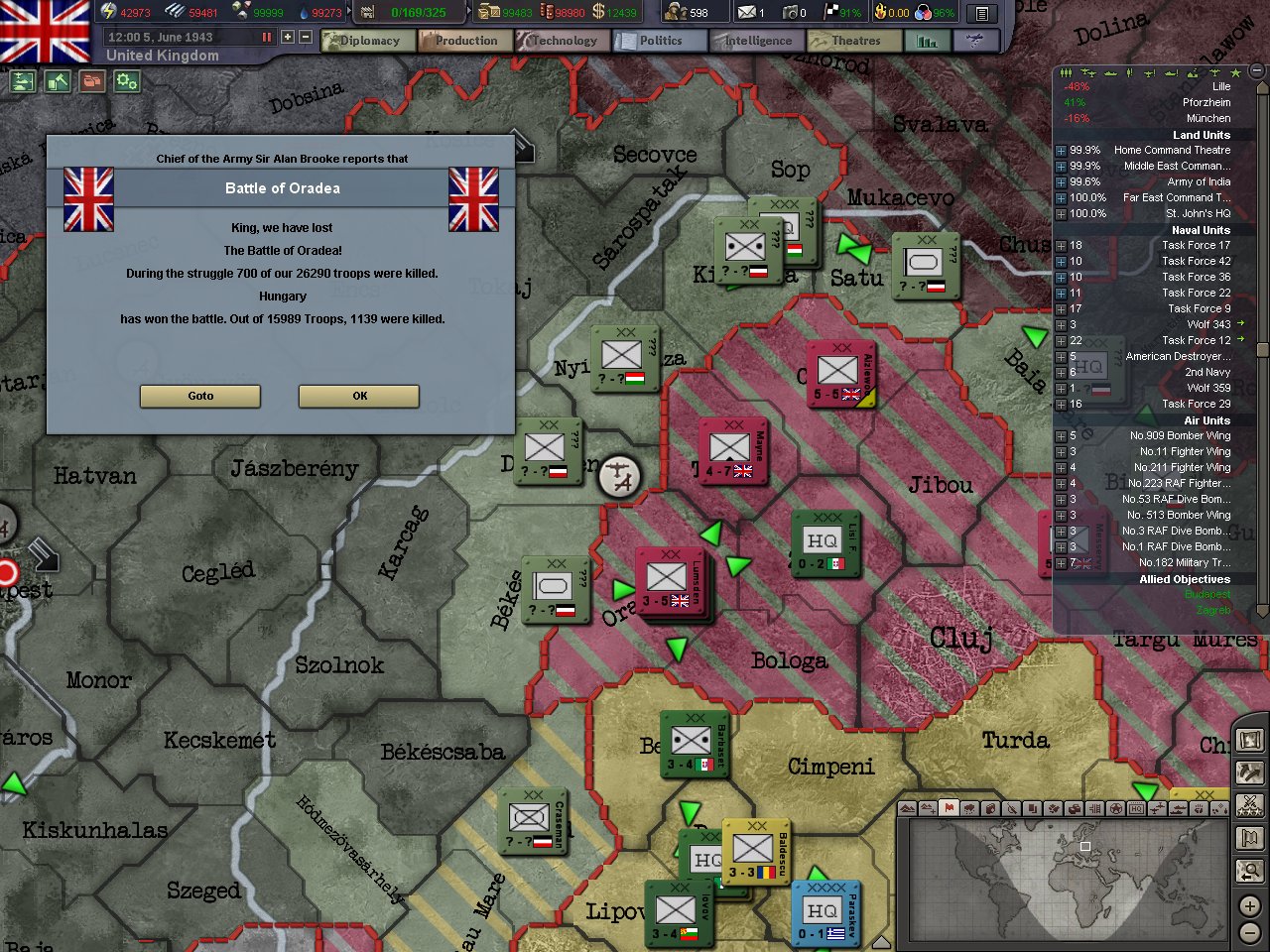
In Hungary a brutal lesson was finally hammered home. Advancing in Hungary and Croatia was costing us too many men. Operations would soon be restricted and all major efforts towards advancing in the European Theater would be restricted to France and southern Germany. Advancing in the Balkans was becoming to bloody and costly. Attacks would only be made when our forces held an advantage over the Axis forces. Outcry from the Public and Parliament over the death tolls from the three corps that had been battling in Greece and the Balkans for two years was becoming louder after every battle.
The 1st and 2nd Mountain corp had both been in continuous fighting since February 1941. Casualties were extremely high in both corps and the reputation of the Greek and then subsequent Balkan fighting was that it was a meat grinder. Where young men fought and died.
The 1st and 2nd Mountain corp had both been in continuous fighting since February 1941. Casualties were extremely high in both corps and the reputation of the Greek and then subsequent Balkan fighting was that it was a meat grinder. Where young men fought and died.
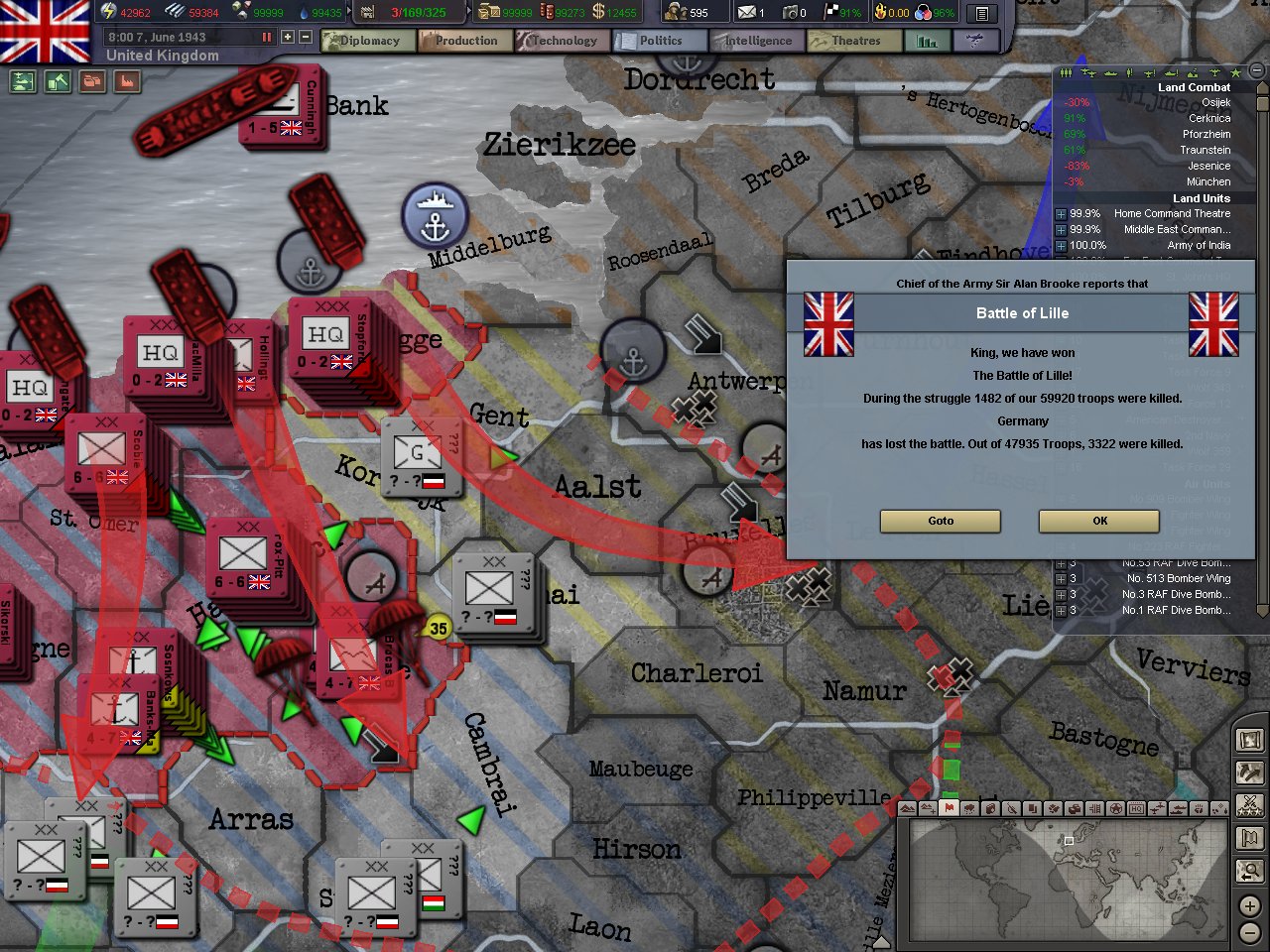
A day after the victory at St Quentin Marine forces finally linked up with the Paras.
The arrival of relieving forces was greeting by cheers and elation. Supplies and ammunition were brought to the Paras and wounded were quickly ferried from field hospitals to the beaches, and then back to England.
With the relieve of the Paras the fighting was from far over. A race was on to see who could gain the favorable ground and the always valuable bridges that were few and far between in the area.
Majority of the infantry forces that were planned for the invasion were now across. Almost two full armies, 10 corps had been landed in France in the matter of two weeks and more would follow. With the ports secure the tanks of the waiting armoured corps could make the channel crossing and give us the lethal hammer head for a break out into the plains of France!
The arrival of relieving forces was greeting by cheers and elation. Supplies and ammunition were brought to the Paras and wounded were quickly ferried from field hospitals to the beaches, and then back to England.
With the relieve of the Paras the fighting was from far over. A race was on to see who could gain the favorable ground and the always valuable bridges that were few and far between in the area.
Majority of the infantry forces that were planned for the invasion were now across. Almost two full armies, 10 corps had been landed in France in the matter of two weeks and more would follow. With the ports secure the tanks of the waiting armoured corps could make the channel crossing and give us the lethal hammer head for a break out into the plains of France!
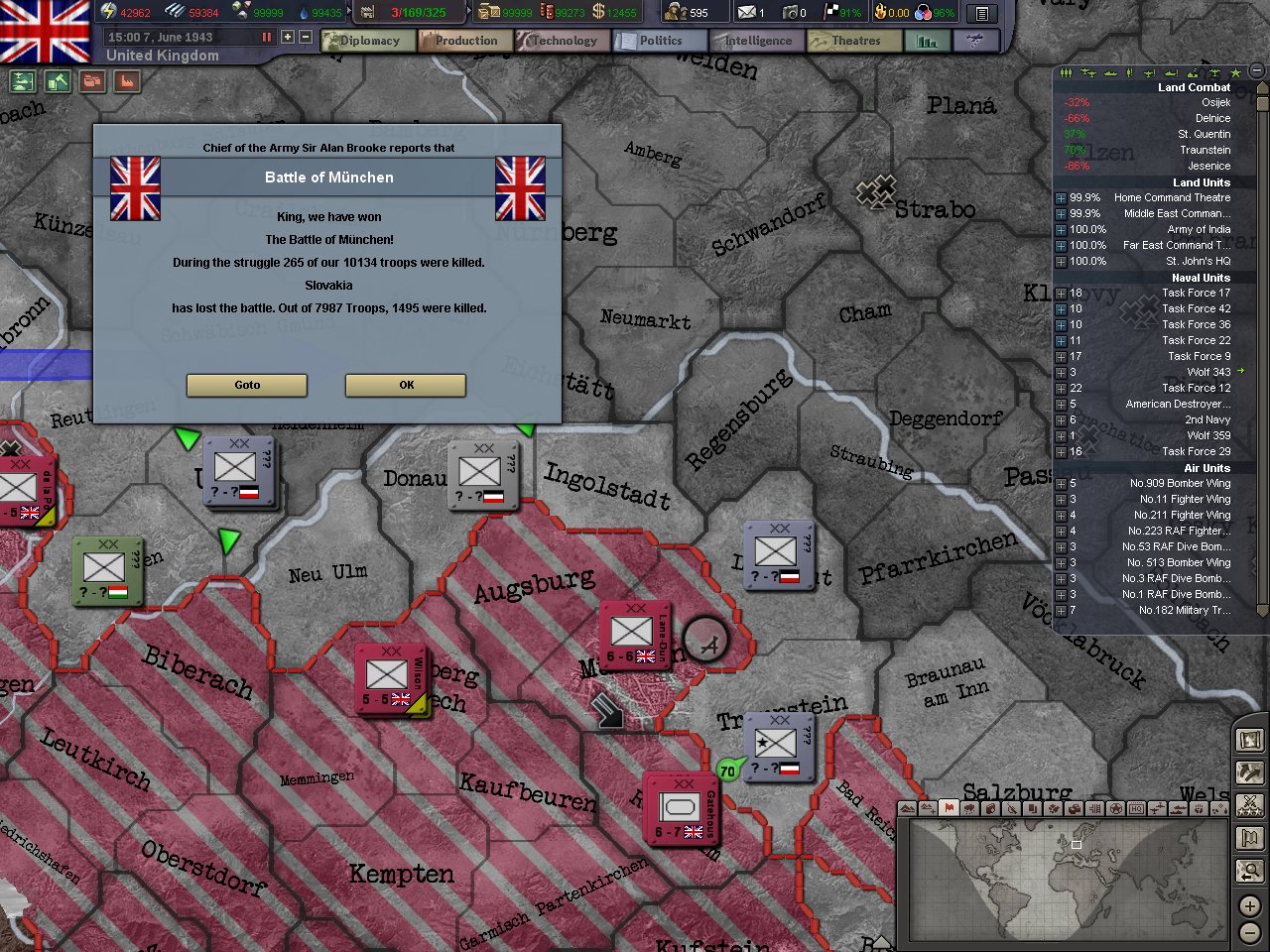
The Germans attempted to retake Munich but were utterly repelled.
A Slovakian division under German command attempted to make the attack and at first seemingly met with success. Their initial patrols and attacks made quick success driving our forces from strong points and down streets. But as the day wore on it began to dawn on the Slovaks that they had been lured into the city as a trap. The Axis division could not be trapped in the city but attacks on it's flanks and supply lines resulted in mass causalities for the enemy,
A Slovakian division under German command attempted to make the attack and at first seemingly met with success. Their initial patrols and attacks made quick success driving our forces from strong points and down streets. But as the day wore on it began to dawn on the Slovaks that they had been lured into the city as a trap. The Axis division could not be trapped in the city but attacks on it's flanks and supply lines resulted in mass causalities for the enemy,
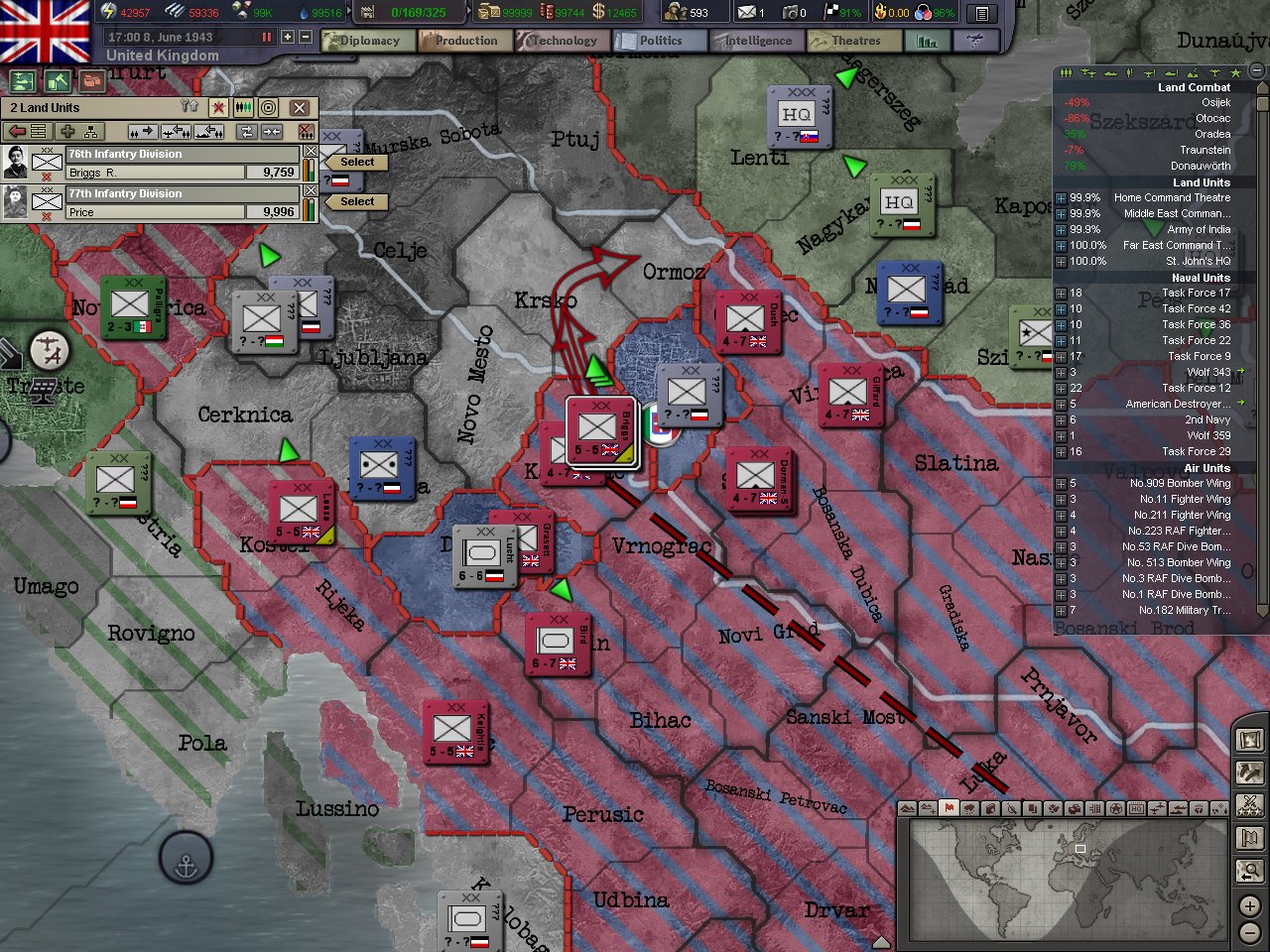
After some jostling of divisions in the Balkans a small operation was launched to finally finish the Battle of Zagreb. The 76th and 77th Divisions would swing north around the flanks of the city encircling and trapping the defenders. The city would then be at the mercy of our forces and months of hard fought fighting would finally come to a bloody end.
Just to the west of the city a German heavy panzer division was still causing us strife. The heavy Tigers and Panzers were damn hard for our PIAT and bazookas to knock out. And without supporting tanks of our own the German panzers were slicing through our lines.
Just to the west of the city a German heavy panzer division was still causing us strife. The heavy Tigers and Panzers were damn hard for our PIAT and bazookas to knock out. And without supporting tanks of our own the German panzers were slicing through our lines.
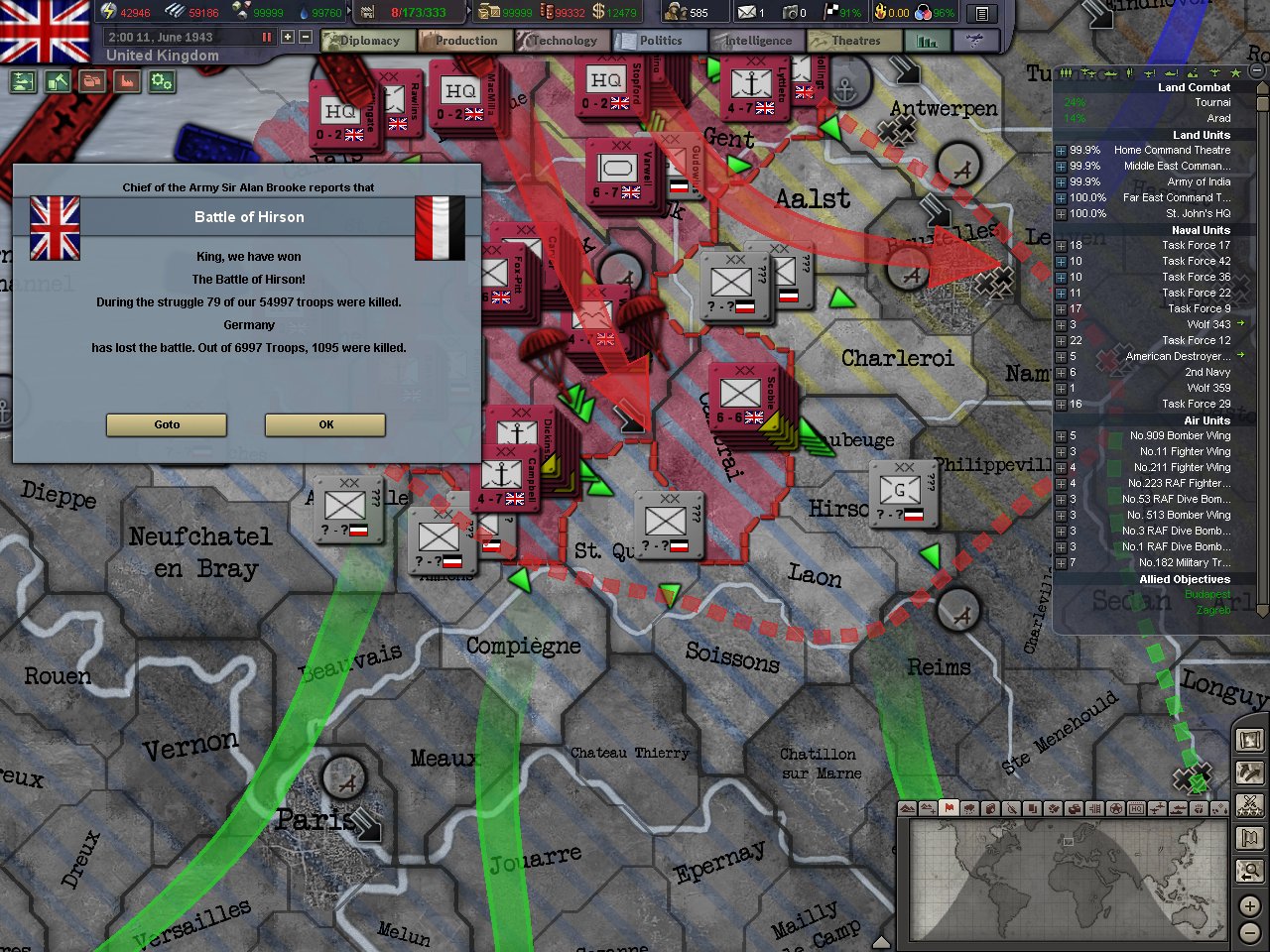
In France. the battle for our first line objective was quickly turning into a rout. With overwhelming numbers and support our forces were slicing through the weak German defenders. Where they would meet us with one or two divisions, we would counter with 4 or 5, and armor support along with fighter bombers too.
Orders were given to the commanders of corps and the two armies that if they saw an opportunity to make an assault and break the German lines then they were to make the attack without delay.
We had our foot in the door, now it was time to smash it open and liberate Europe!
Orders were given to the commanders of corps and the two armies that if they saw an opportunity to make an assault and break the German lines then they were to make the attack without delay.
We had our foot in the door, now it was time to smash it open and liberate Europe!
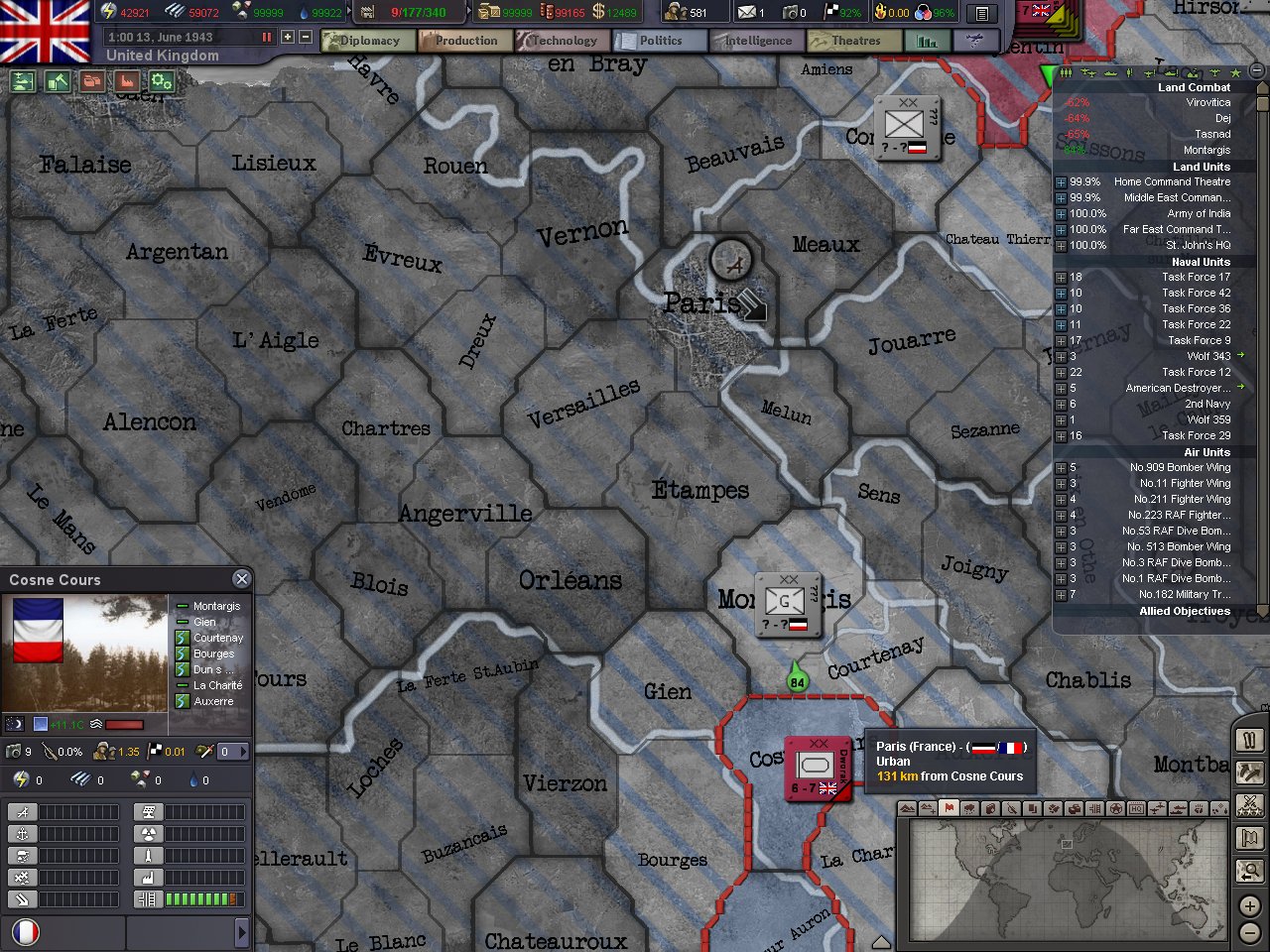
While the breakout to the north was being made possible, the 7th Armored kept rolling.
Their first real form of enemy resistance came when a small garrison division blocked the route north to Paris. The battle would turn into several smaller engagements, with enemy companies engaging squadron size elements and flanking movements being made using the speed of our tanks.
Their first real form of enemy resistance came when a small garrison division blocked the route north to Paris. The battle would turn into several smaller engagements, with enemy companies engaging squadron size elements and flanking movements being made using the speed of our tanks.
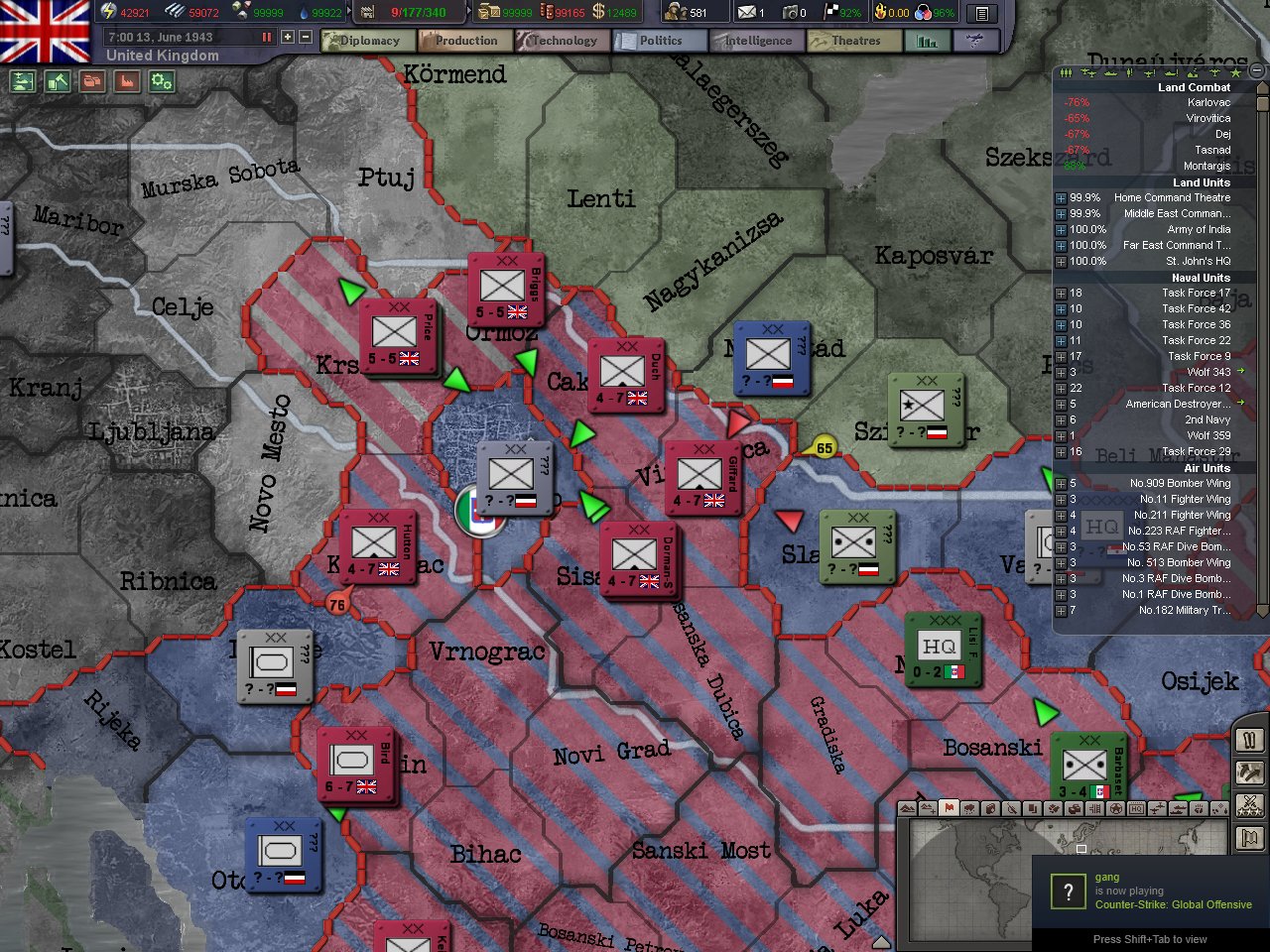
On the 13th of June the encirclement of Zagreb was completed and the attack was launched. When news of our attack reached outside the city, the German 7th Panzer division to the west launched an attack to break through to the city and Croatian and Hungarian divisions to the east and south east also launched attacks to attempt to breakthrough. Only time would tell who would break first, our forces or theirs.
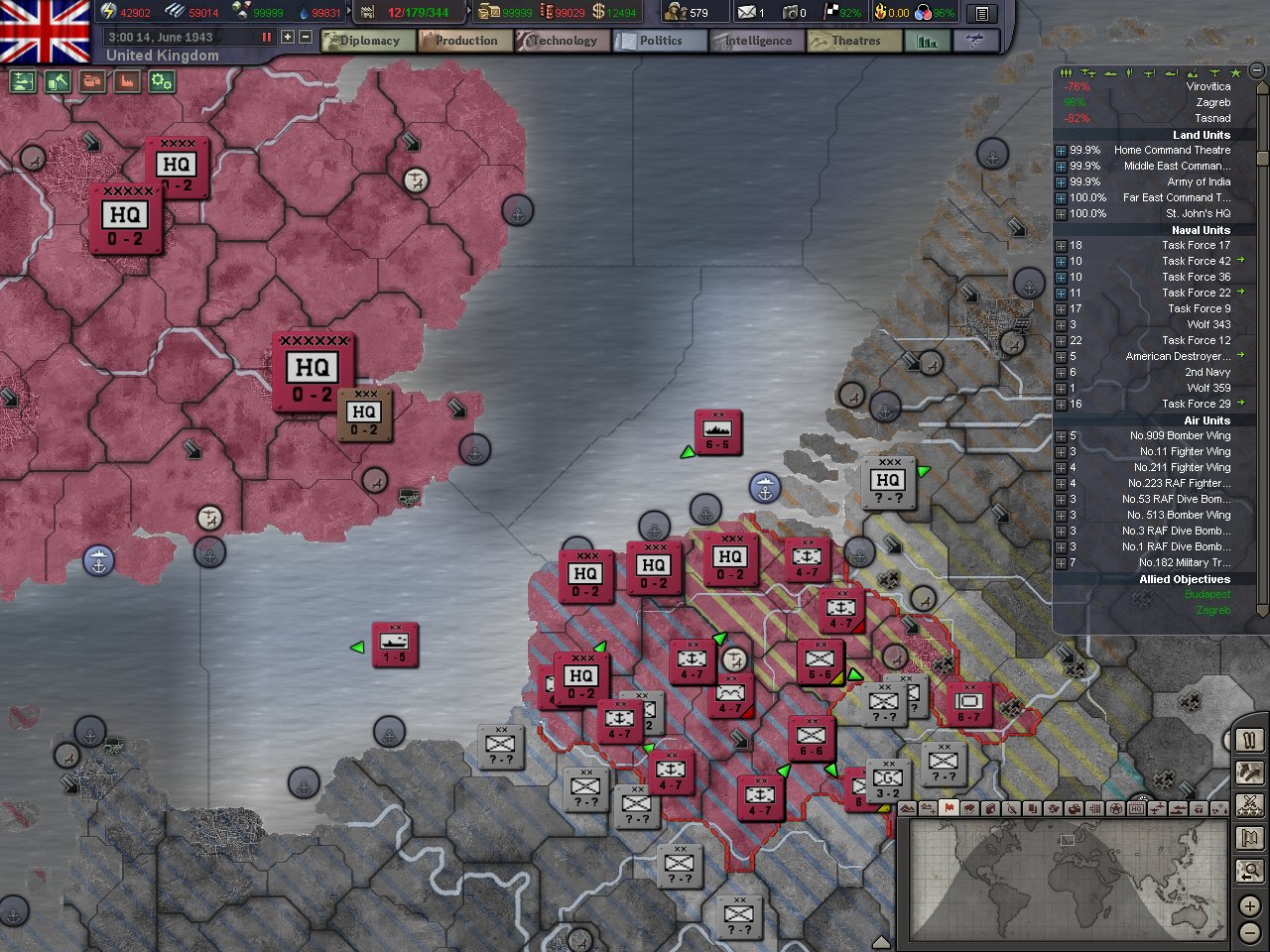
By the 14th of June majority of phase line red had been secured and Royal Navy ships in the channel were returned to port to prevent further damage from the Luftwaffe. The Royal Navy had done it's job by ferrying and supporting the landings, and from now on it was an airforce and army job to take Paris.
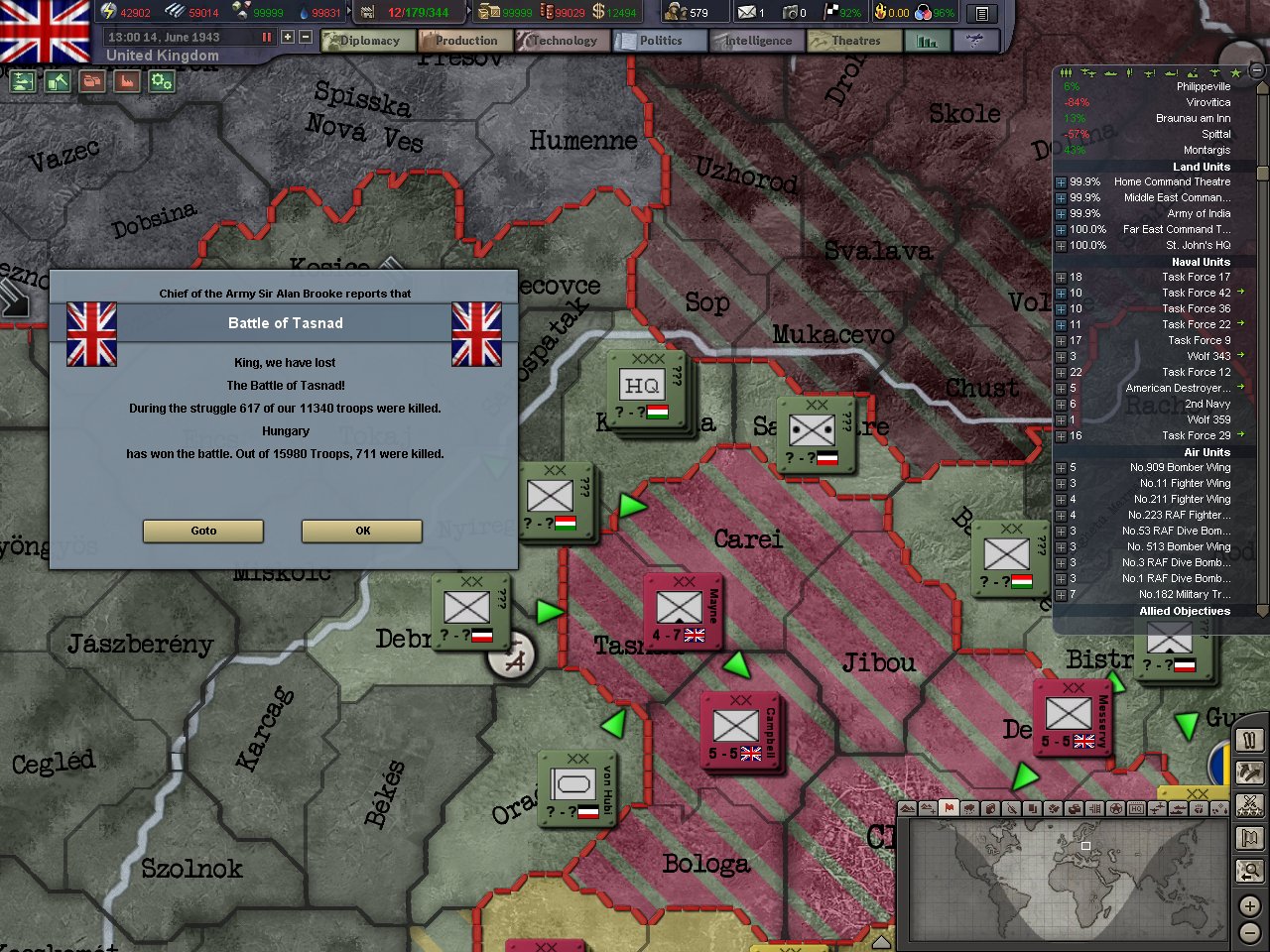
The small gains we had managed to carve out in Hungary were proving to costly to keep. Hungarian forces were punishing our troops in the Carpathian Mountains and outnumbered us as well. The situation in the Carpathians was almost the complete opposite to that in France. In France we had the numbers and options for support, in Hungary the Axis had the numbers and the support.
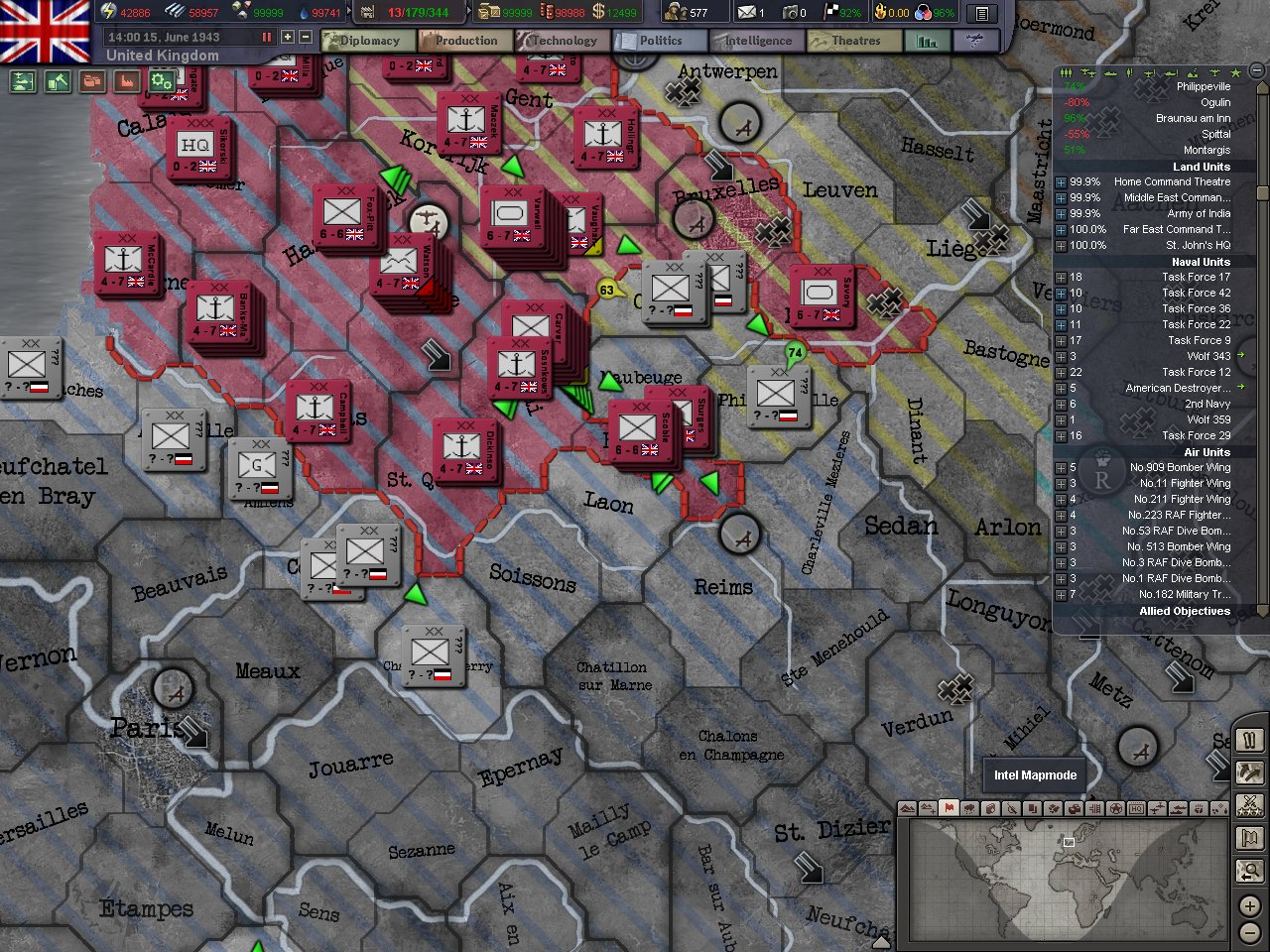
Back in France an advance in strength was made towards Reims. The Germans had formed a thin line along a river a hundred kilometers north of Paris and our commanders didn't fancy making a frontal assault when their eastern flank was open. As our troops were making a wide advance past the German right flank we were also taking this opportunity to surround a corp just outside Brussels, and a day later on the 16th the encirclement was complete by an armored division.
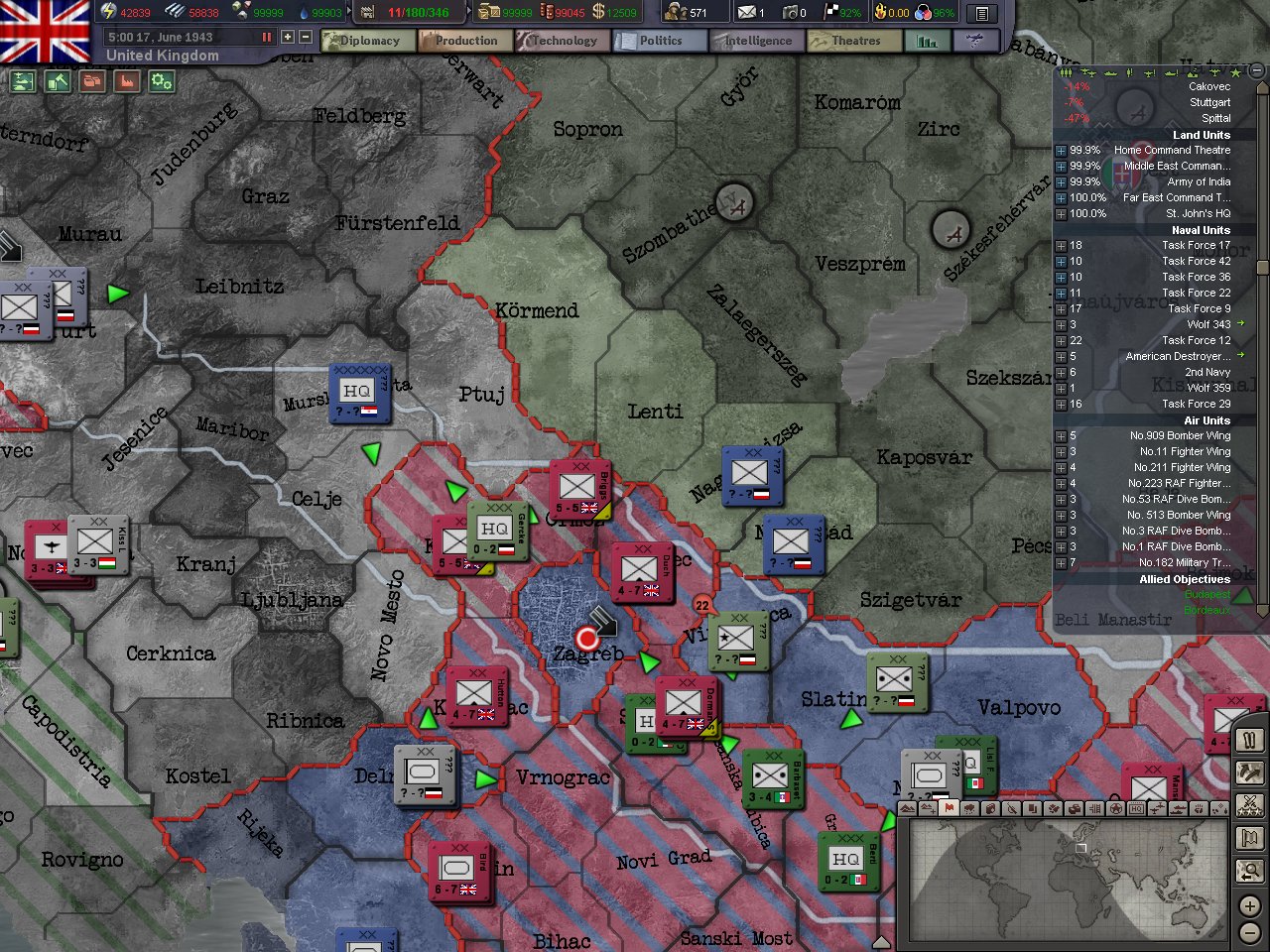
The good news from Brussels was then followed by more good news in Croatia. The defenders of Zagreb, after weeks of back and forth fighting for the city had finally given up and our forces were advancing in. The capture of the city didn't solve all of our problems on the front but it did make for some good news among long casualty lists.
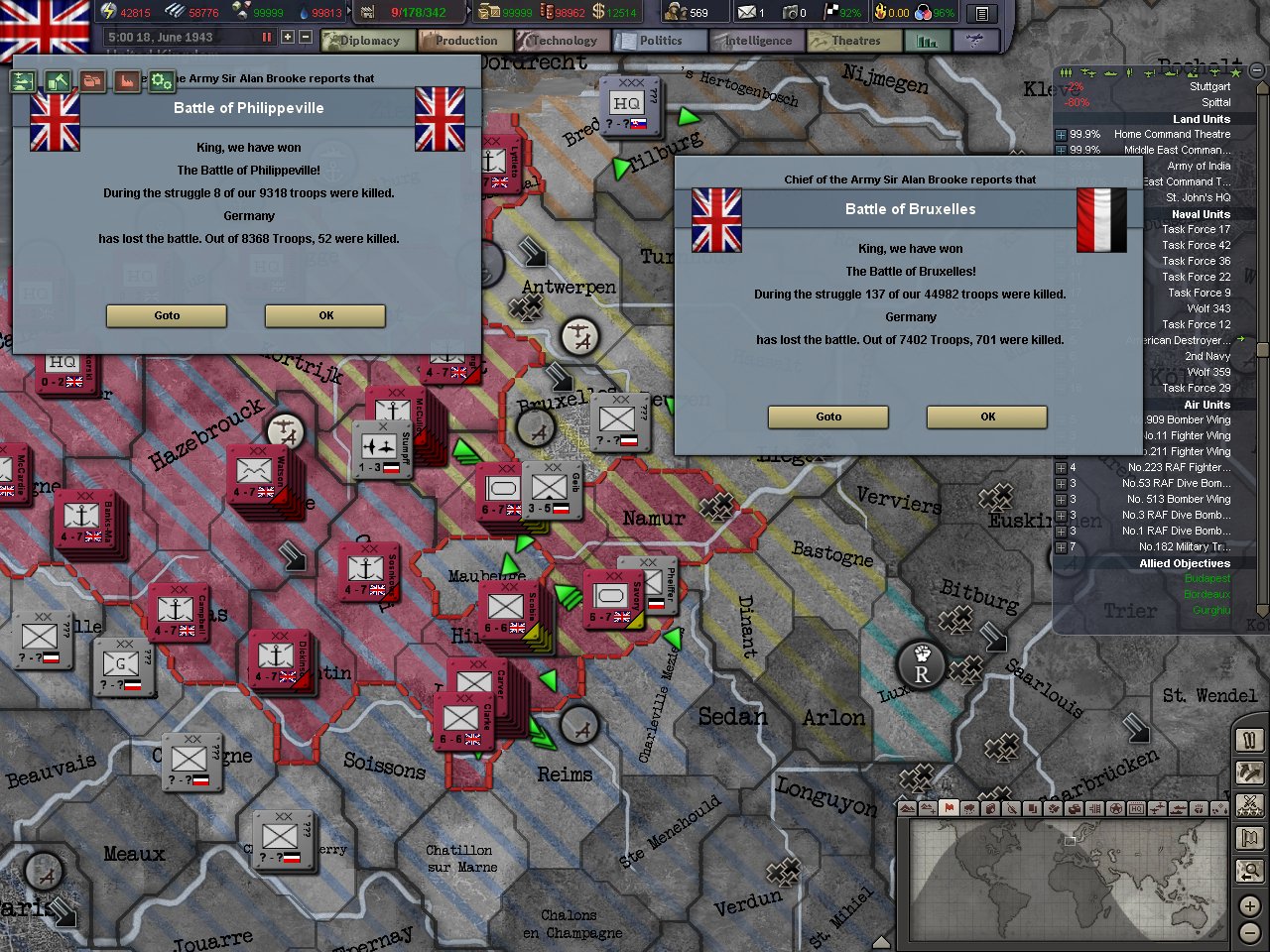
The encirclement and capture of three German divisions was completed in France. With this small pocket gone our forces could now flow easily along roads and on towards Reims and to the Rhine and out flank Paris.
Operation Juno's main plan of attack was now changed for a general breakout in France. Troops would still form a line along the Rhine River but if the opportunity presented itself they were given freedom to cross into Germany and continue the advance.
Operation Juno's main plan of attack was now changed for a general breakout in France. Troops would still form a line along the Rhine River but if the opportunity presented itself they were given freedom to cross into Germany and continue the advance.
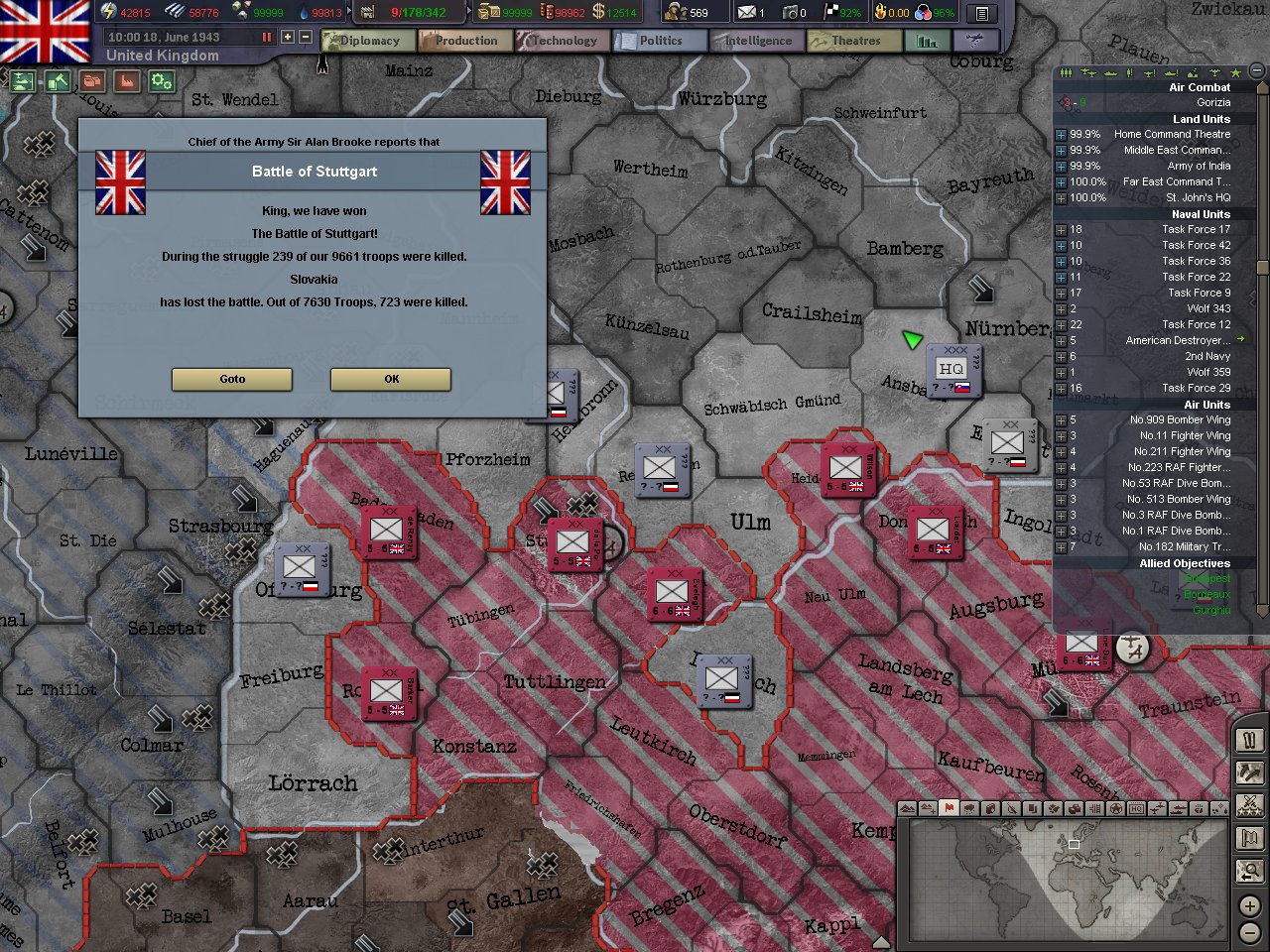
A German attack to retake Stuggart was repelled and the two cities of Stuggart and Munich were firmly in our control.
Germans were now getting a taste of what it was like to live under occupation, just like they had done to half of Europe.
Germans were now getting a taste of what it was like to live under occupation, just like they had done to half of Europe.
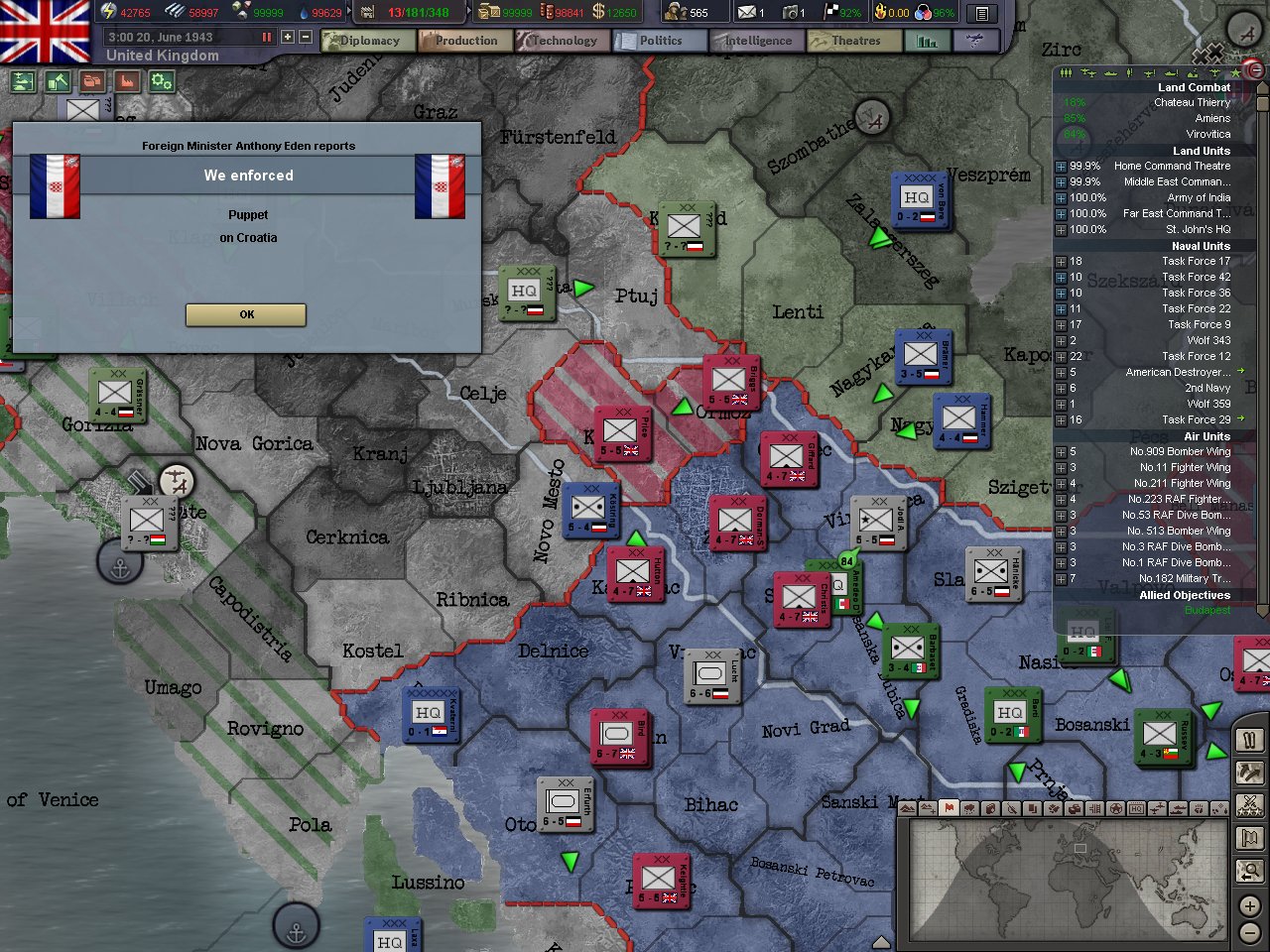
Three days after the Battle of Zagreb finally finished, Croatia officially surrendered on June 20th 1943.
Many Axis units would now find themselves behind enemy lines and without adequate support. Command in the Balkans hoped this would see a turn of fortune in the area. As even though we had knocked Croatia out of the war, Axis counter offensives from Hungary were proving to be difficult to handle and were costing us men and territory.
Many Axis units would now find themselves behind enemy lines and without adequate support. Command in the Balkans hoped this would see a turn of fortune in the area. As even though we had knocked Croatia out of the war, Axis counter offensives from Hungary were proving to be difficult to handle and were costing us men and territory.
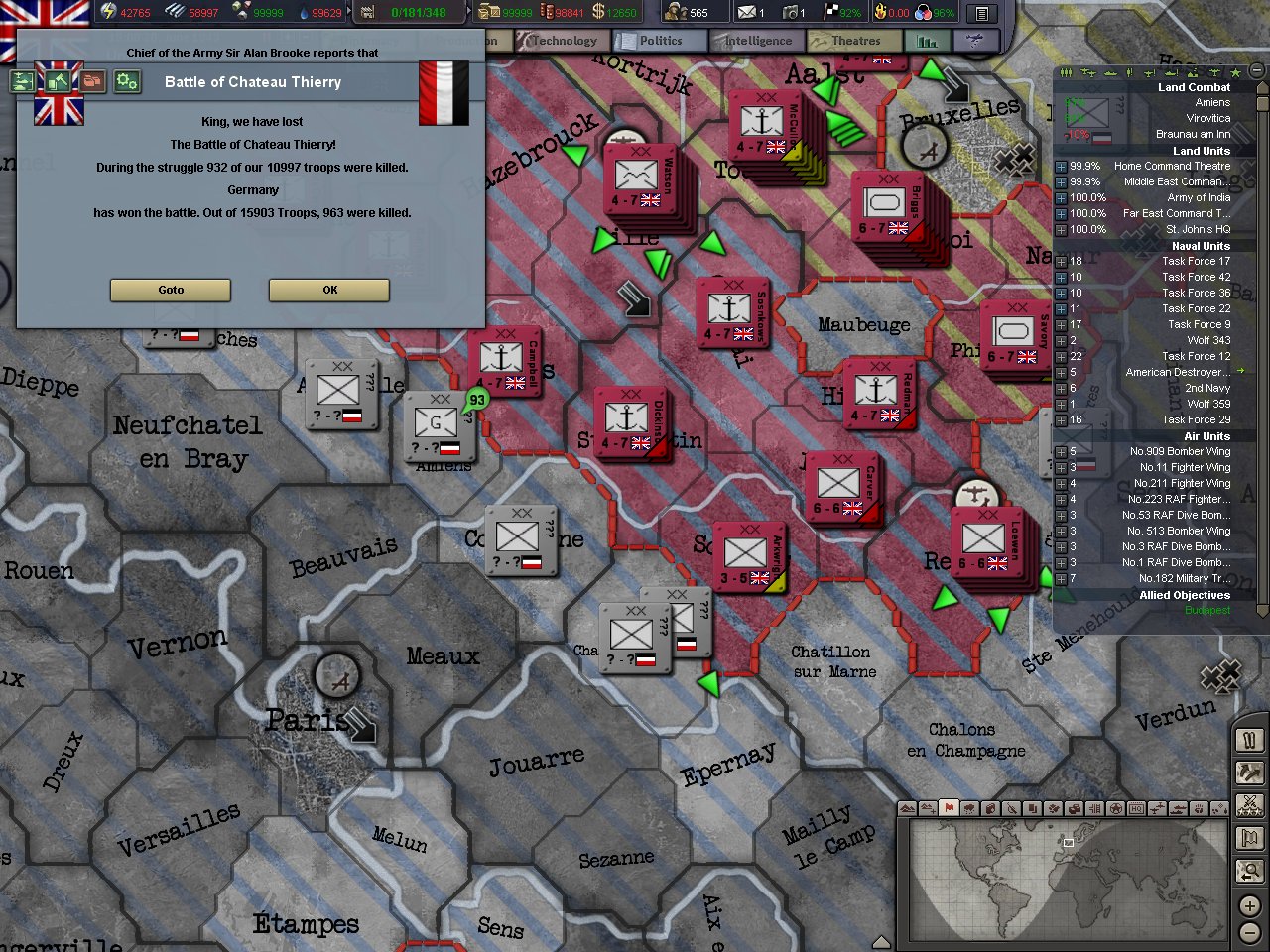
Back in France we had maneuvered two divisions into positions away from the rivers that intersected the area. Attacks were launched at Amiens and at Chateau Thierry and while our troops were defeated at Chateau Thierry hard, our forces managed to breakthrough at Ameins and we now had a route around the German defensive line.
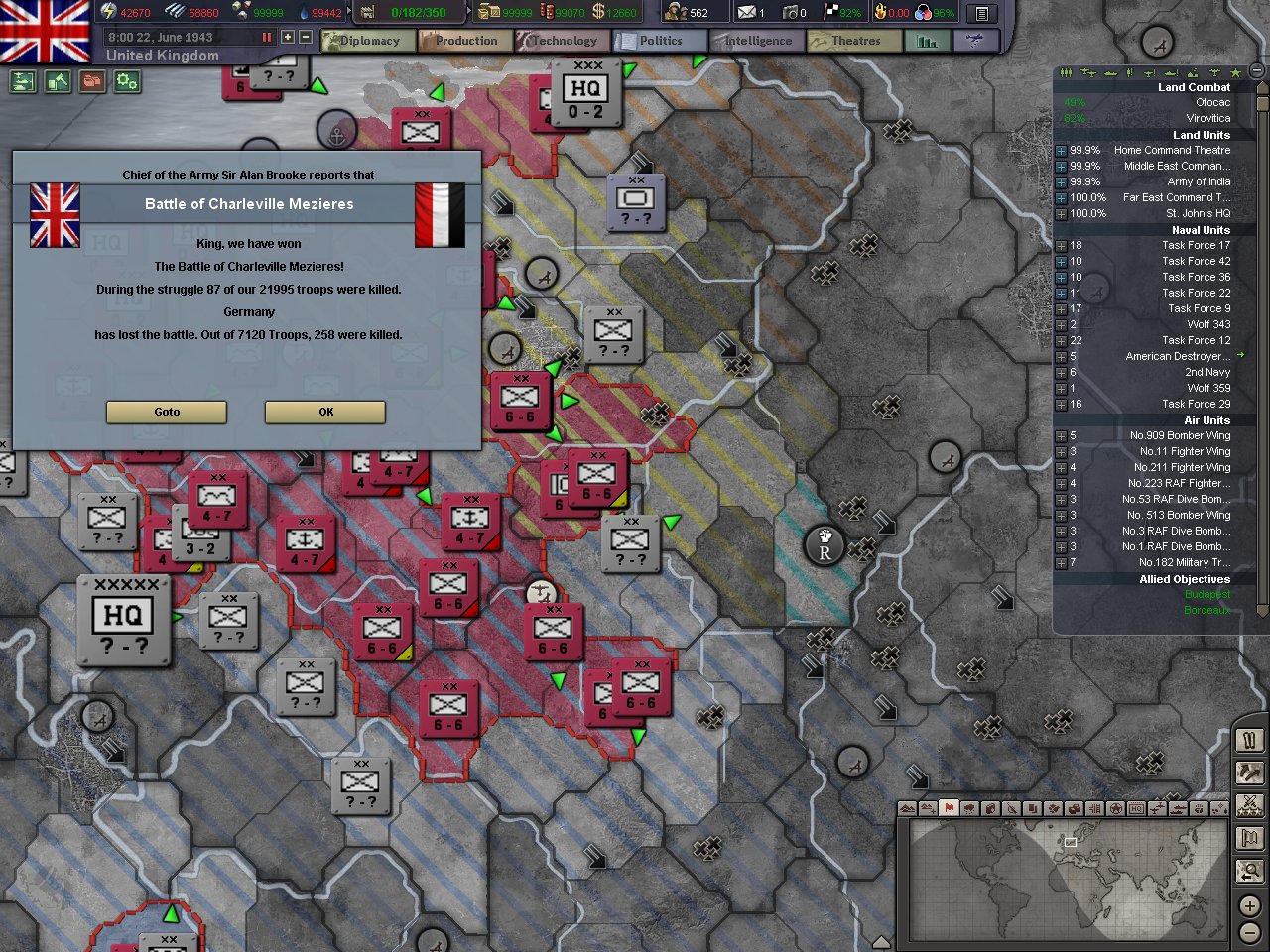
In western Europe, the situation was plainly desperate for the Axis. Their forces were spread thin and favored a defensive line around Paris. Enemy formations to our east were scattered and not in positions to mutually support each other. Our divisions were able to bring their overwhelming firepower and numbers to bear and we had a steady advance east on our hands. Soon the first of the European city capitals, Brussels, would be liberated from the grip of the Gestapo!
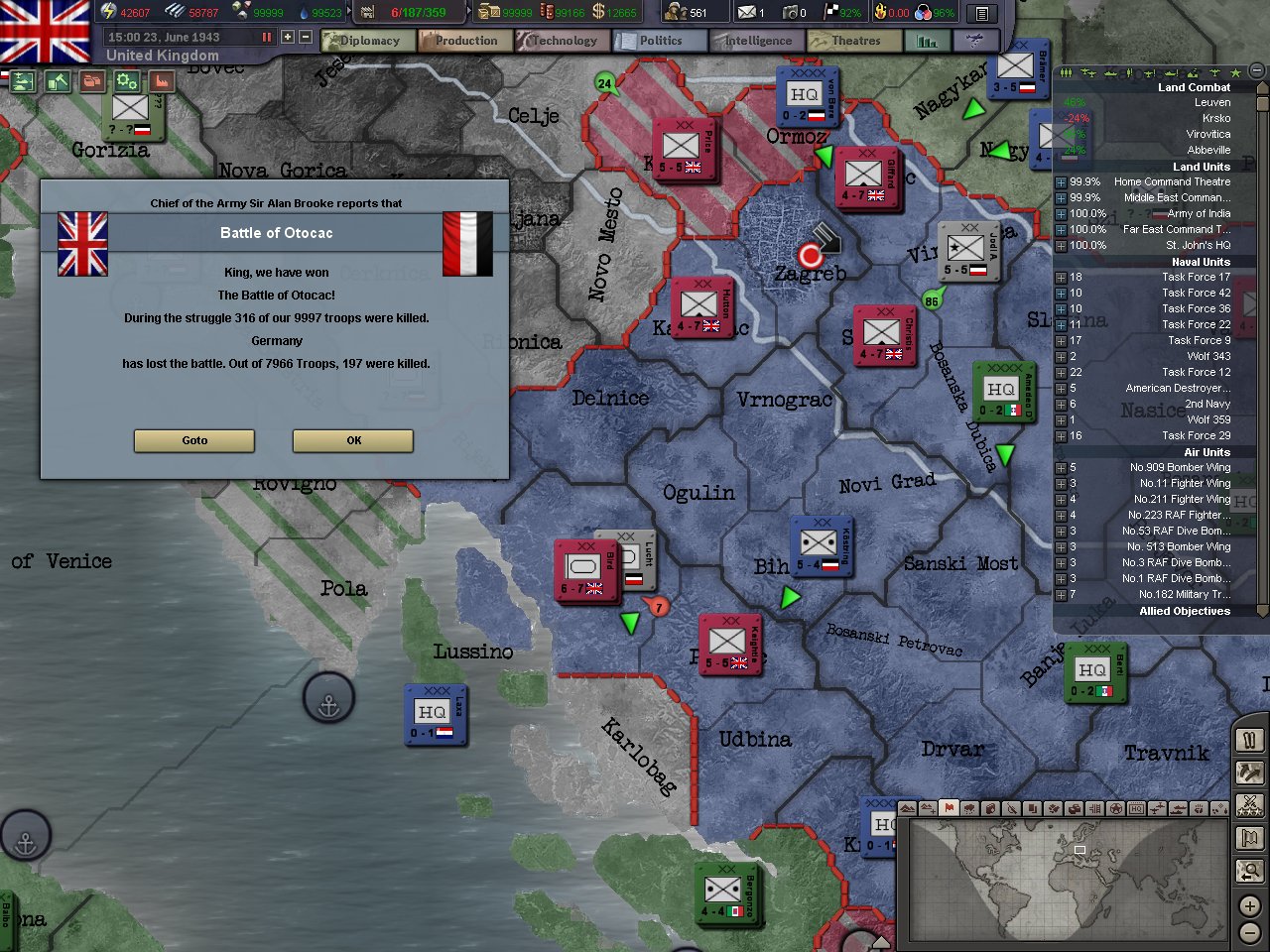
On the 23rd of June we finally were able to bring up some armor support to help our troops deal with the 7th Panzer division in Croatia. After feeding men into a meat grinder we managed to force it back to the coast where we could hopefully trap it and destroy it for good.
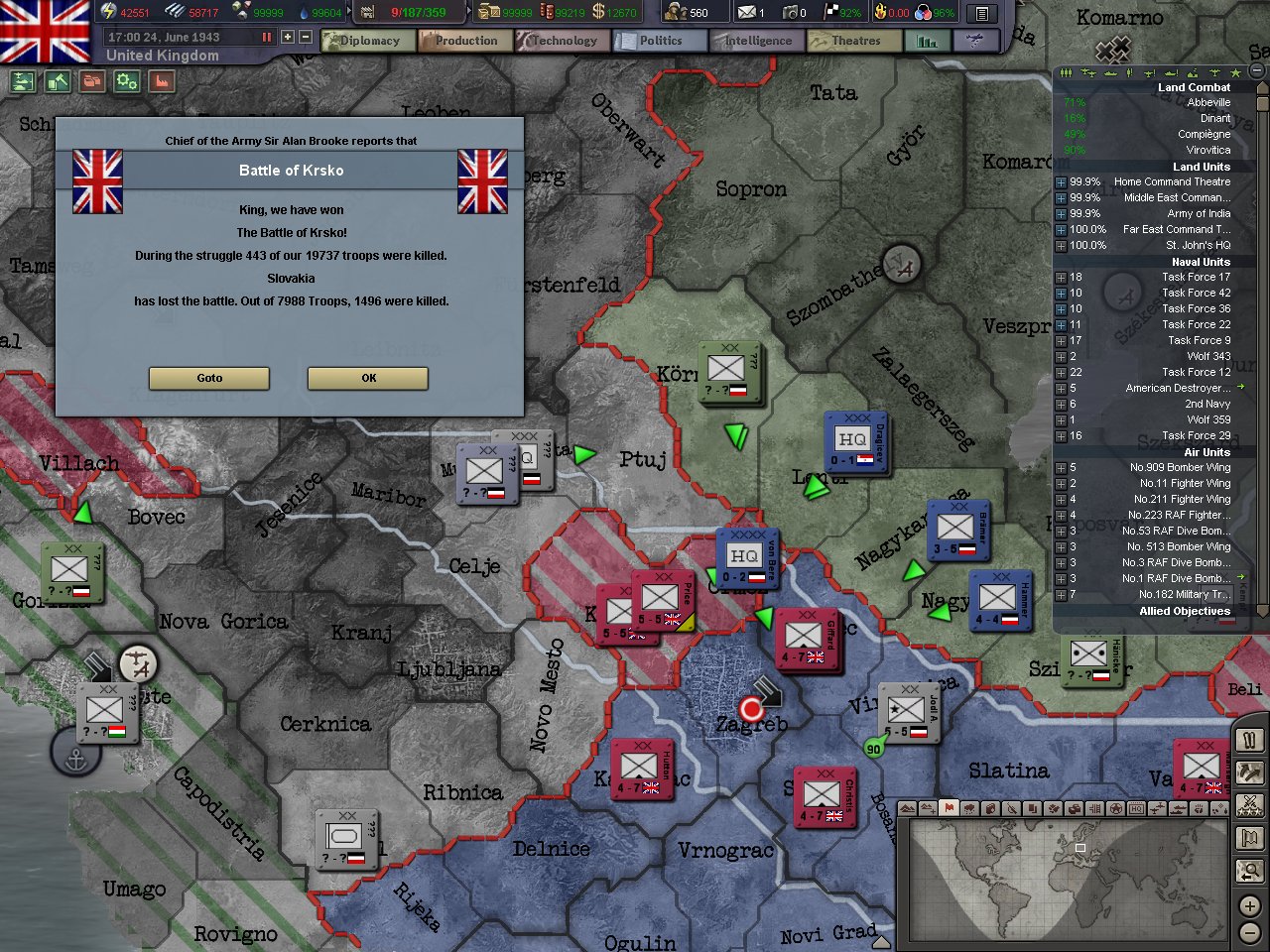
Our goal in the Balkans was now forming a steady line and holding under attacks from superior Axis formations. The Axis had smaller supply lines and easier access to support. All of our supplies had to be brought in via ships, sometimes as far away as Athens in Greece. While the RAF was being spread very thin from having to support the invasion of France and the campaign in the Balkans.
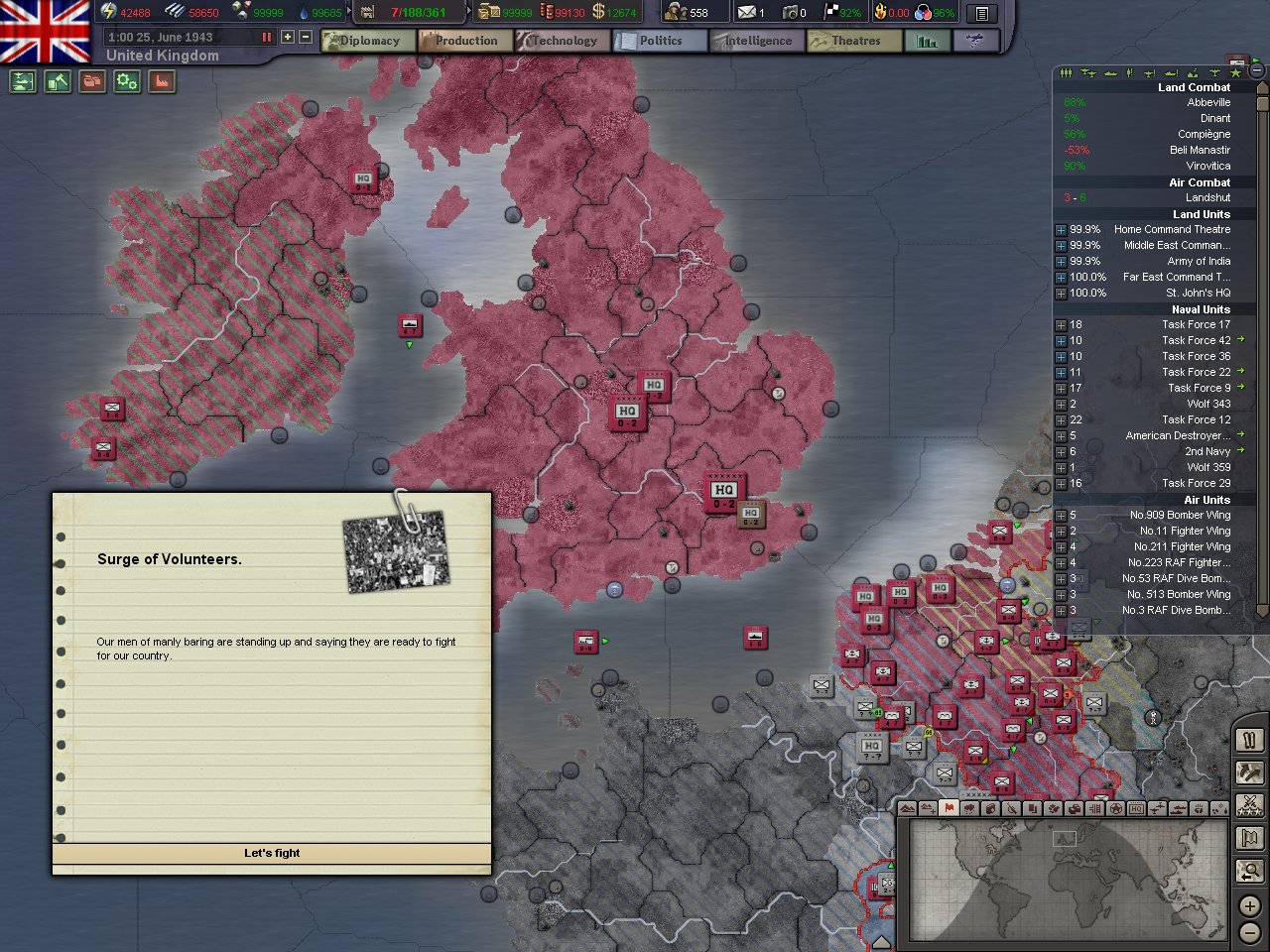
As our forces closed in on Paris from the north and south, and our troops entered Brussels to cheering crowds. A wave of patriotic fever swept through the nation and recruiting posts and army barracks were overwhelmed by the number of young men and women who wanted to server.
The men would be excellent replacements for the bitter fighting in Greece and the Balkans. Though more realistically these young men now entering training were more likely to be sent to east of Suez to fight the Japanese. The women all joined the Auxiliary Territorial Service, many drove supply trucks and helped count supply stores. Many others flew planes carrying mail and orders around the Empire, like the famous Canadian, Marion Orr, who was making a name for herself on the Home Front flying in conditions no man would dare.
The men would be excellent replacements for the bitter fighting in Greece and the Balkans. Though more realistically these young men now entering training were more likely to be sent to east of Suez to fight the Japanese. The women all joined the Auxiliary Territorial Service, many drove supply trucks and helped count supply stores. Many others flew planes carrying mail and orders around the Empire, like the famous Canadian, Marion Orr, who was making a name for herself on the Home Front flying in conditions no man would dare.
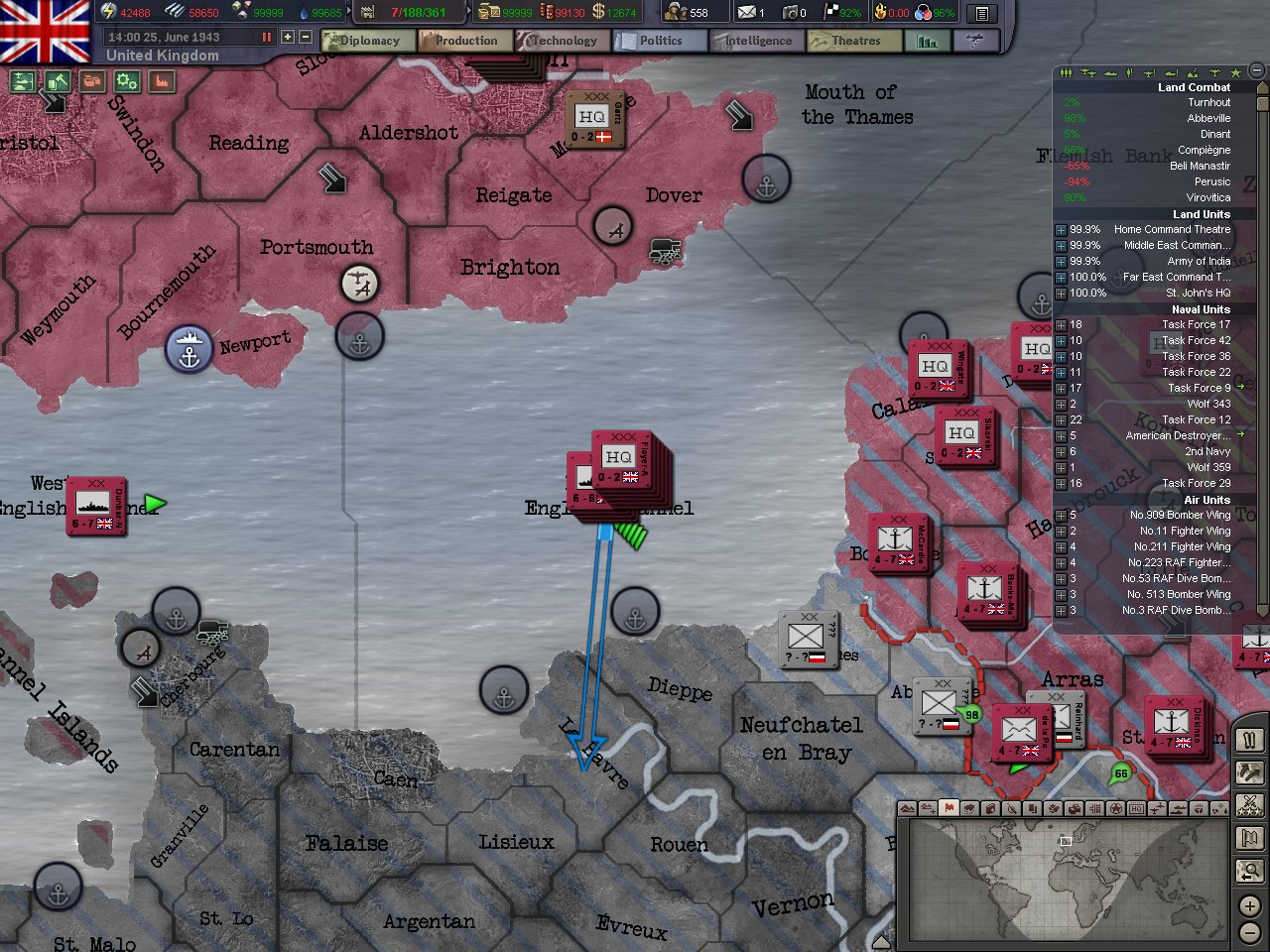
As more trained men came available to GHQ in London, jobs would be found for them. Supplies were already becoming a problem in the cramped docks in Calais and Dunkirk, a third landing was given the go ahead. A corp of fresh infantry was landed west of the town of Dieppe and behind the main German defensive line. The goal for these troops was to surround Paris and the Germans defending it from the west and help open up more ports for the flow of supplies.
As the landing took place attacks were ordered towards Paris, the 7th Armoured were now within 100 kilometers of the city from the south, and from the east our Marines and troopers were only a few battles and routed German divisions away from the city of light.
As the landing took place attacks were ordered towards Paris, the 7th Armoured were now within 100 kilometers of the city from the south, and from the east our Marines and troopers were only a few battles and routed German divisions away from the city of light.
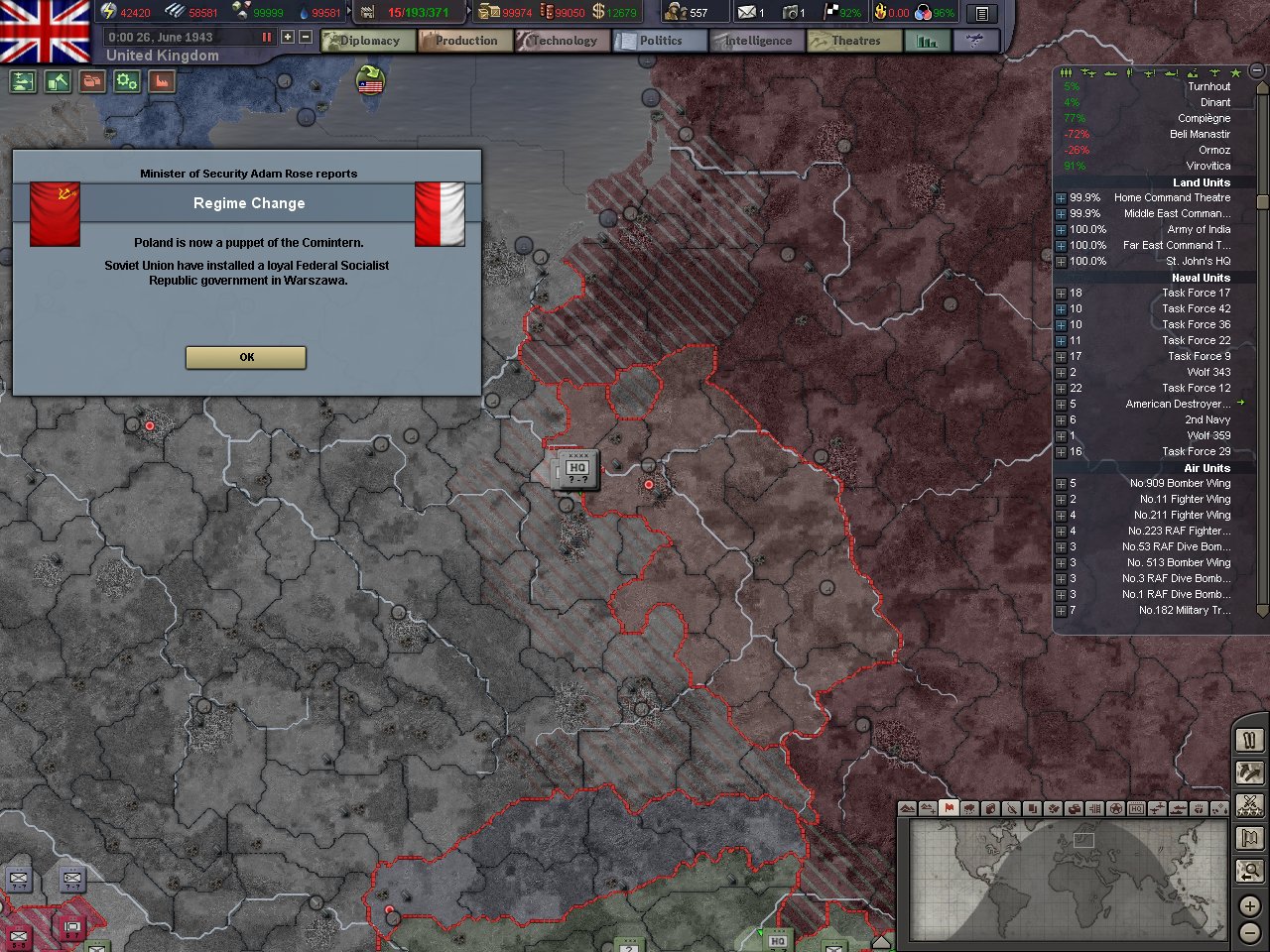
As our men were preparing to assault towards Paris, the Soviet Union made a 'regime change' in Poland and the nation became a puppet to the USSR. The Soviets had made rapid gains while our boys had been busy fighting through thick hedgerows and through determined German resistance. The Soviets were now likely within 400 kilometers of the city and the weak German line could surely not hope to stand up to the Soviets. Intelligence reports had said that the Soviets had an overwhelming advantage in terms of numbers in every category. Information on Soviet tactics, on the strategic,operational and tactical levels was noted as we obtained information, and our military minds began to form ideas for potential operations.
No matter what happened in the future after the war, the focus our military men had to have their minds and heads, so said the King, was on taking Berlin. The Soviets could not be allowed to swallow up all of Europe and if they took Berlin before us that is what exactly would happen.
No matter what happened in the future after the war, the focus our military men had to have their minds and heads, so said the King, was on taking Berlin. The Soviets could not be allowed to swallow up all of Europe and if they took Berlin before us that is what exactly would happen.
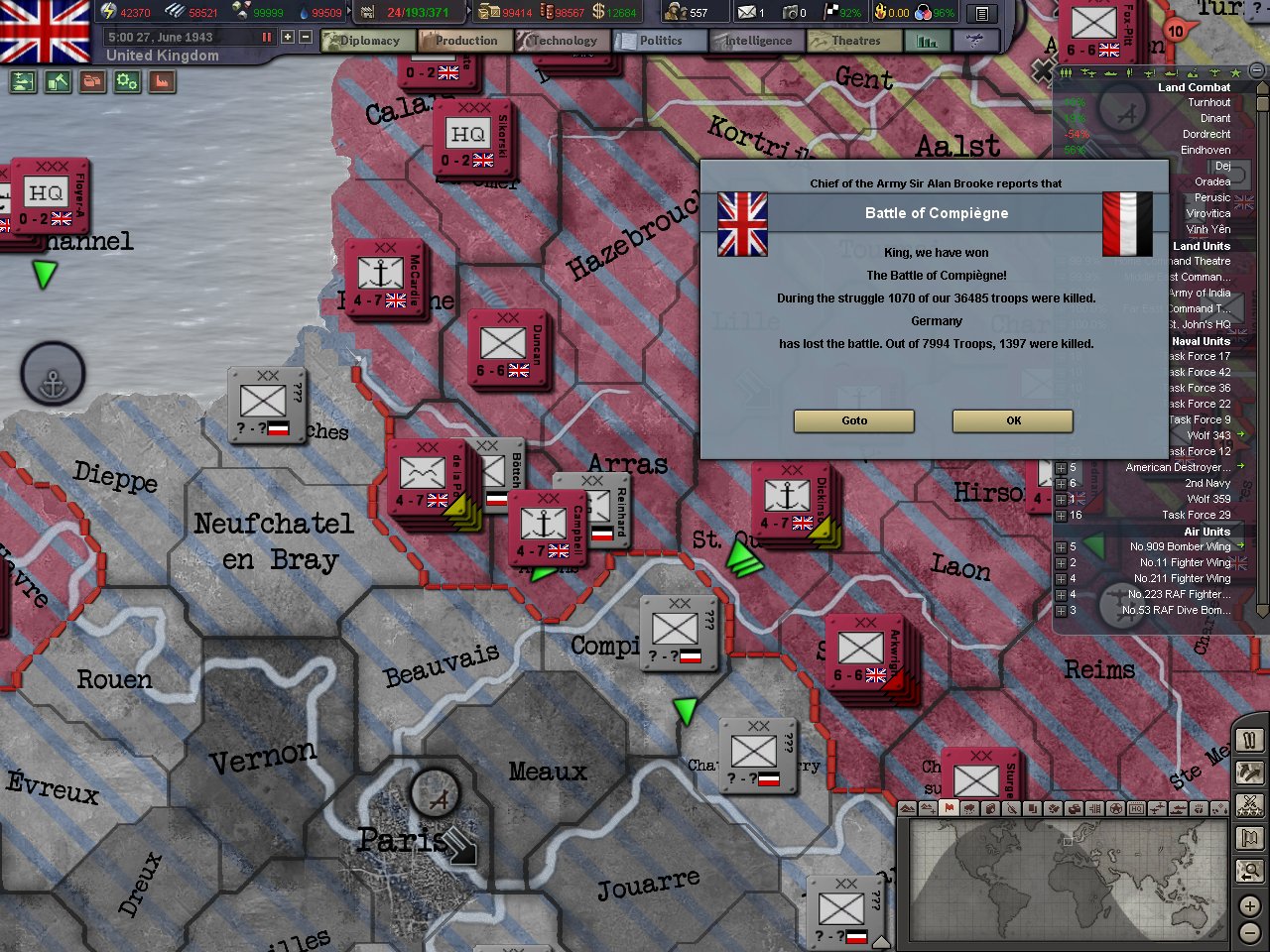
Our brave Royal Marines paid a heavy toll opening up the direct road to Paris. Forcing back the German defenders along the river was not easy and the rivers in France would be running red with the blood of young Britons for many years to come.
Further to the east in France our men crossed over into the Netherlands, but at a heavy cost. Forcing a crossing over the upper part of the Rhine cost us nearly 600 men to the German 150. But nonetheless our troops had gotten forces cross the river and were making their way across en-mass.
Further to the east in France our men crossed over into the Netherlands, but at a heavy cost. Forcing a crossing over the upper part of the Rhine cost us nearly 600 men to the German 150. But nonetheless our troops had gotten forces cross the river and were making their way across en-mass.
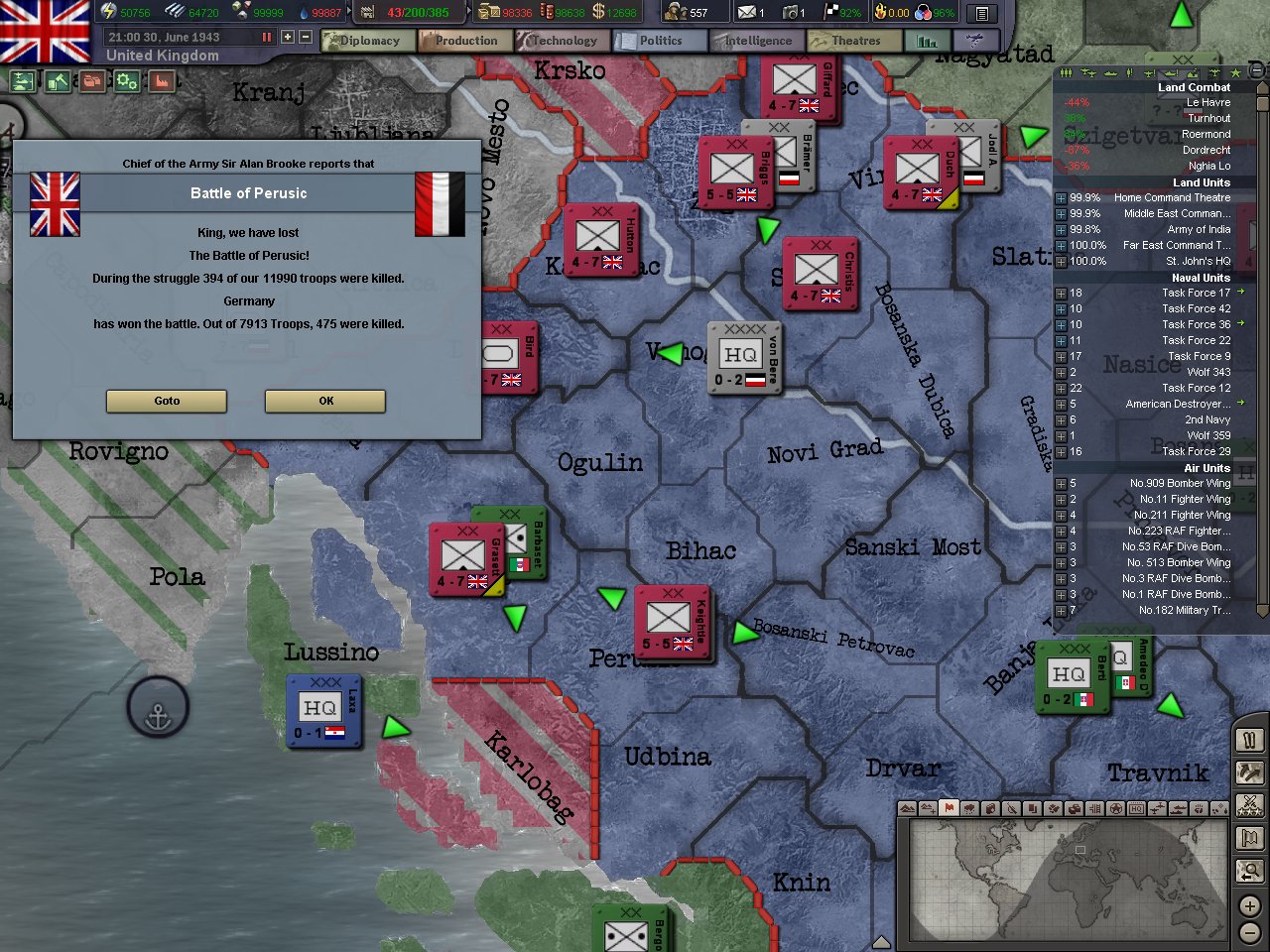
The end of June brought great news. Several hundred kilometers behind our lines and far from support, the 7th Panzer division surrendered to our forces. The brave men of the 7th Panzer had fought valiantly against us and no one could say they had done less than what was expected of them. The survivors were embarked and sent to Egypt to POW camps, and their equipment was sent to help supply the Italian and our other allied armies that were lacking supplies.
In the Far East another attempt was made to force the Hanoi river. This one met with similar results as the last, even overwhelming numbers could not break the stalemate and only caused more useless death.
In the Far East another attempt was made to force the Hanoi river. This one met with similar results as the last, even overwhelming numbers could not break the stalemate and only caused more useless death.
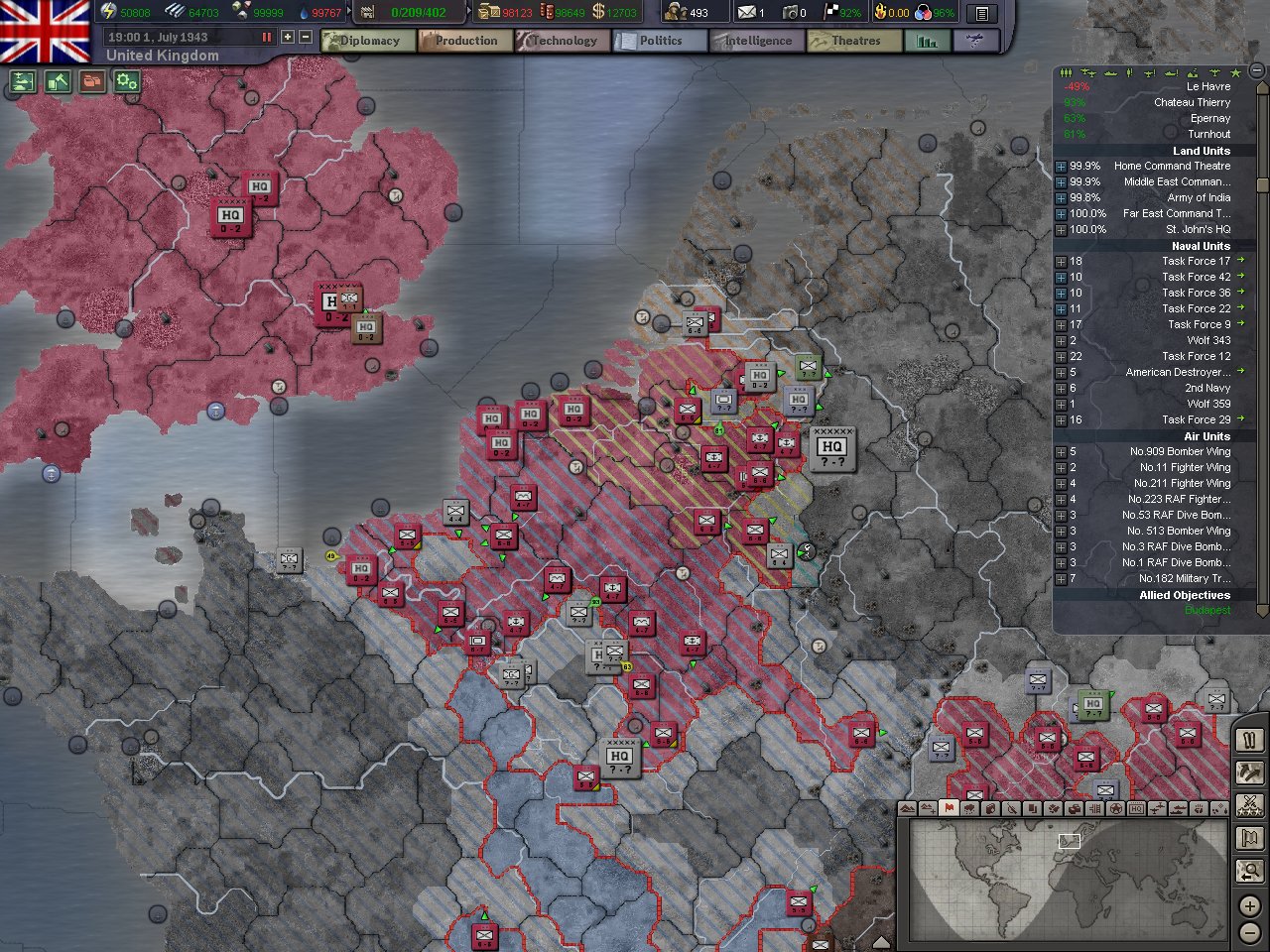
The situation in France was now beyond what Operation Juno was expected to have done by the end of June. Just over a month since landing on the beaches of France, our troops had entered Paris, Brussels and were closing in on Amsterdam. The 7th Armored Division, having made a drive from the Alps to Paris, had made it to the city first and were greeted by the mayor and what seemed like the whole city. The 7th Armored would forever now be known as the 7th 'Paris' Armored, for their brave and daring race across France.
We also had troops moving down the Normandy cost towards Brest, troops moving towards the Rhine to link up with our troops in Germany and divisions moving towards Bordeaux. A war of maneuver was on and the clock was running on the race for Berlin.
We also had troops moving down the Normandy cost towards Brest, troops moving towards the Rhine to link up with our troops in Germany and divisions moving towards Bordeaux. A war of maneuver was on and the clock was running on the race for Berlin.
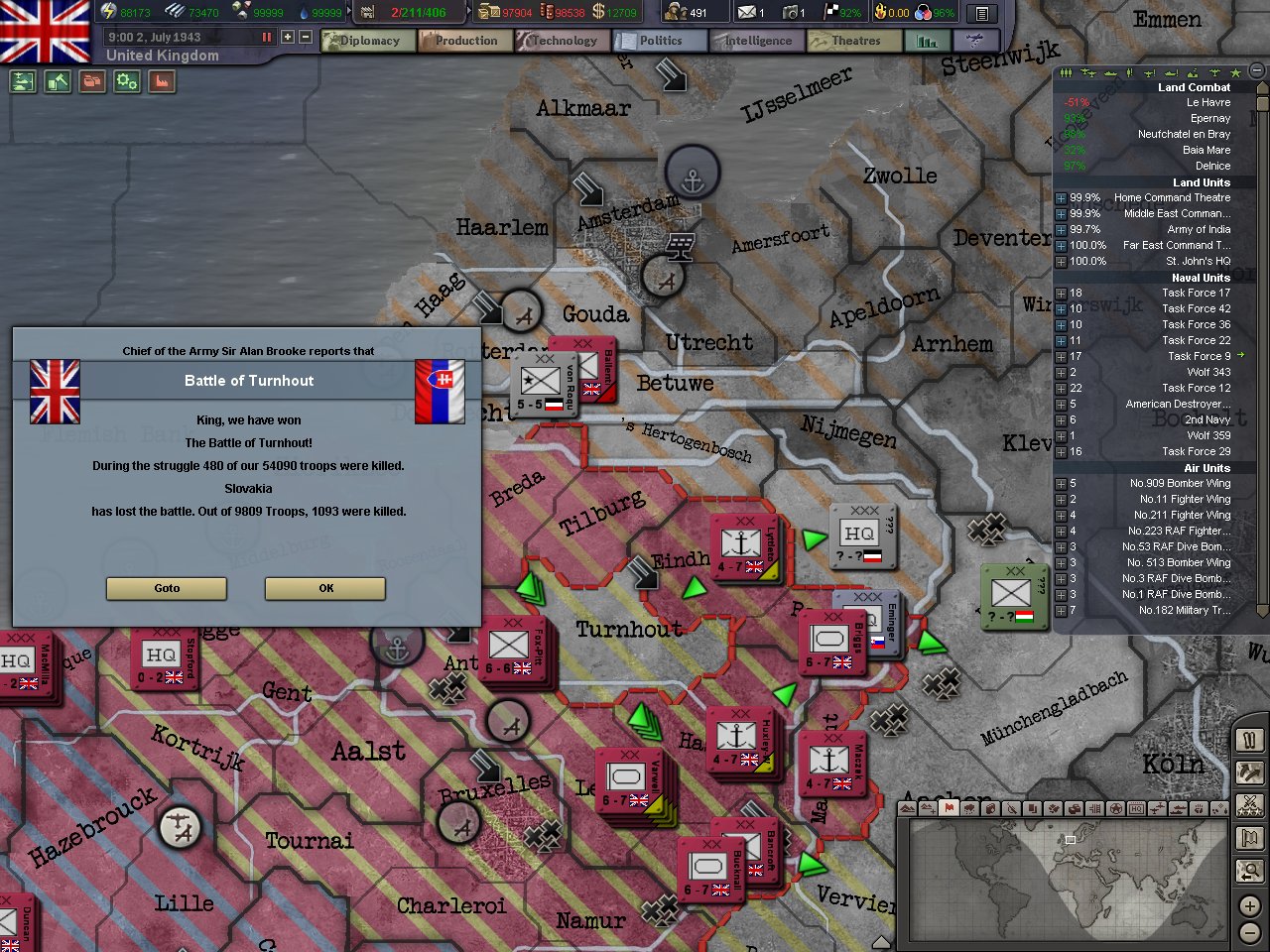
On the 2nd of July three battles came to an end in France.
Two encirclement were destroyed and almost 20,000 prisioners would begin the journey to the Home Islands and we forced a German division back away from Paris.
Two encirclement were destroyed and almost 20,000 prisioners would begin the journey to the Home Islands and we forced a German division back away from Paris.
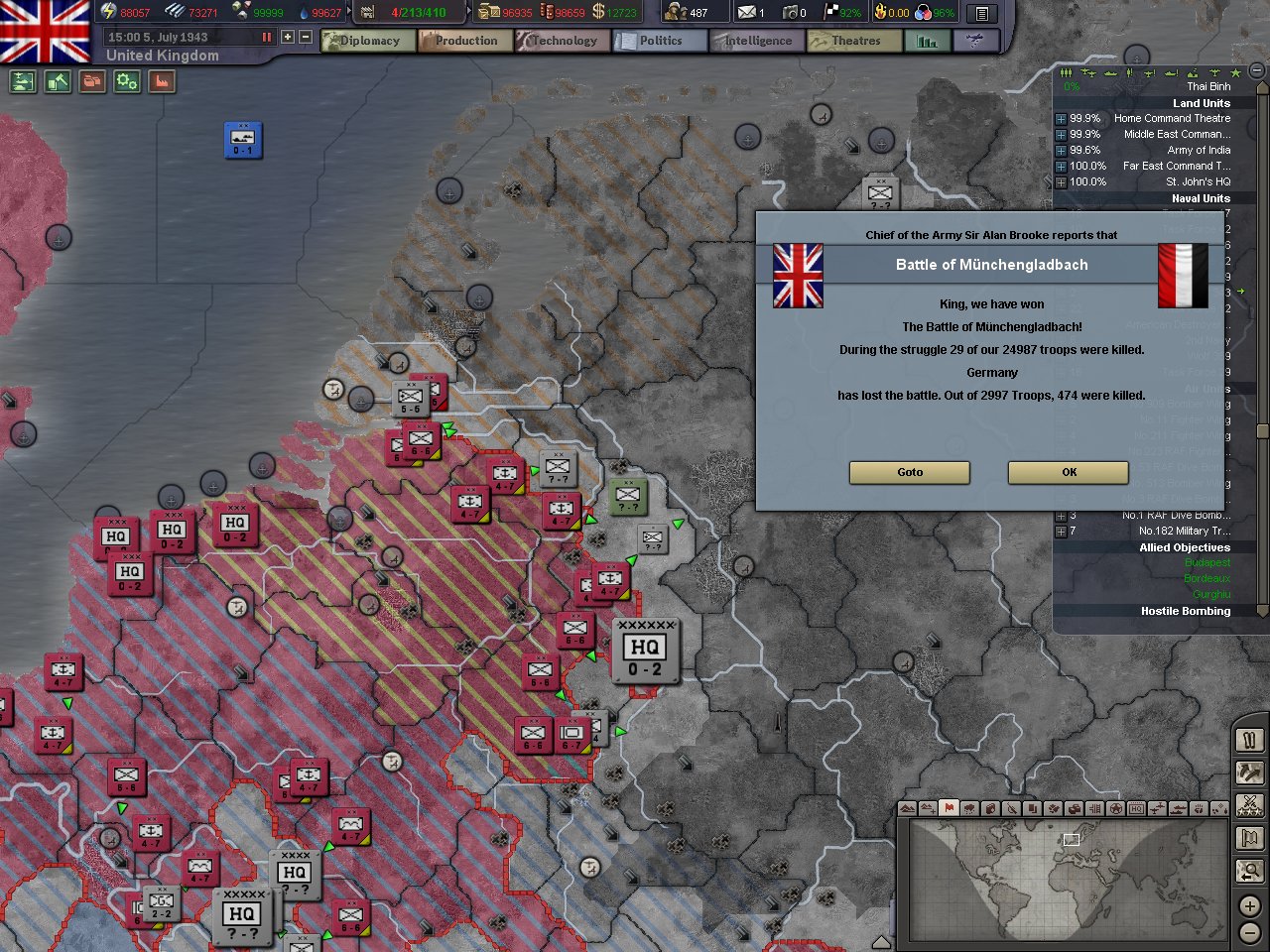
We now had almost two corps across the Rhine river near the Dutch border. These troops would make up the drive for Berlin and also be the element that would come down on the Germans around Munich and Stuggart.
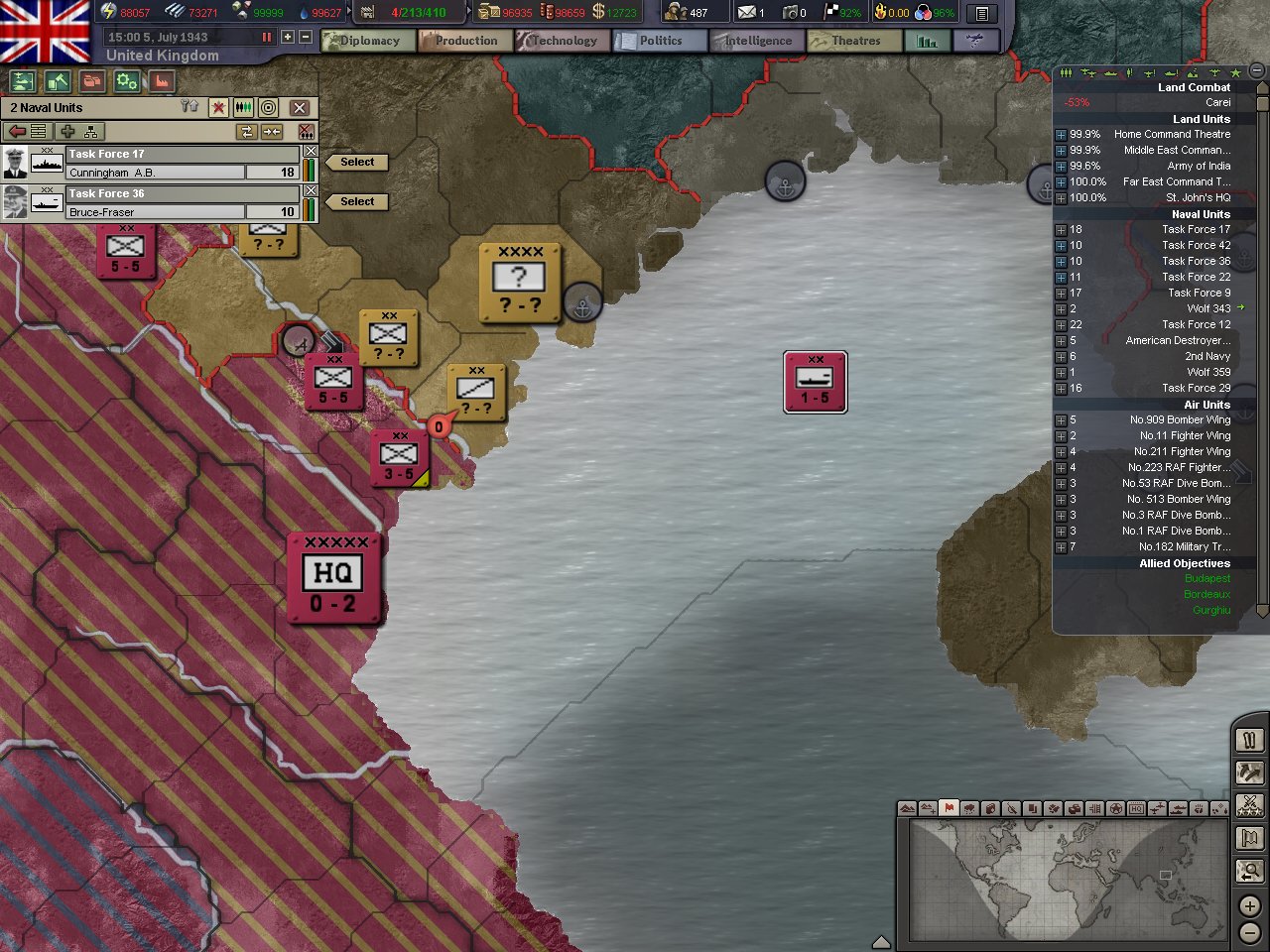
In the Far East the Royal Navy was brought into action to help break the stalemate.
The Royal Navy had spent most of the war in the Far East in port and only patrolling where they could easily receive support. In Europe the RN might have rode rough shot across the waters but east of Suez, the Japanese were the masters of the sea. And only with recent American victories had that impression started to change and our admirals gotten bolder.
The support of the Royal Navy at this stage did little to help the advance. The Japanese were just simply to well dug in on the river banks and even the big guns of our battleships couldn't pound them out of their trenches.
The Royal Navy had spent most of the war in the Far East in port and only patrolling where they could easily receive support. In Europe the RN might have rode rough shot across the waters but east of Suez, the Japanese were the masters of the sea. And only with recent American victories had that impression started to change and our admirals gotten bolder.
The support of the Royal Navy at this stage did little to help the advance. The Japanese were just simply to well dug in on the river banks and even the big guns of our battleships couldn't pound them out of their trenches.
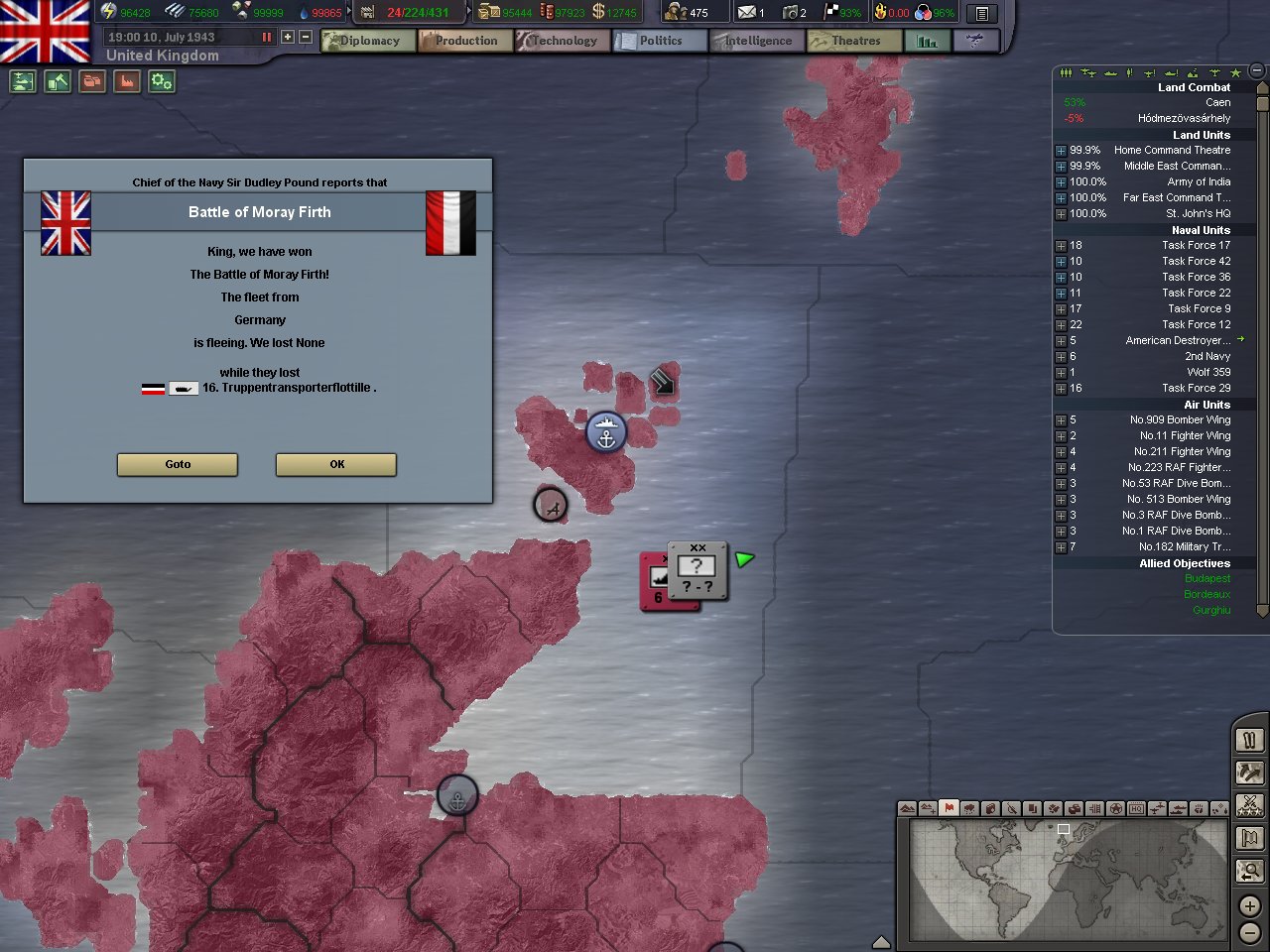
In very strange news, a destroyer flotilla patrolling for u-boats happened across a small German landing flotilla off the coast of Scotland. Their purpose was never found out as they were destroyed and no survivors could be picked up. Their mission was a mystery even to MI5 and 6. Whether they were simply trying to land and surrender, land commandos and disrupt our war effort. Or even sabotage our rocket facility in Scotland or our nuclear research was never found out. Their mission was to be a mystery until we we could get into the German war files.
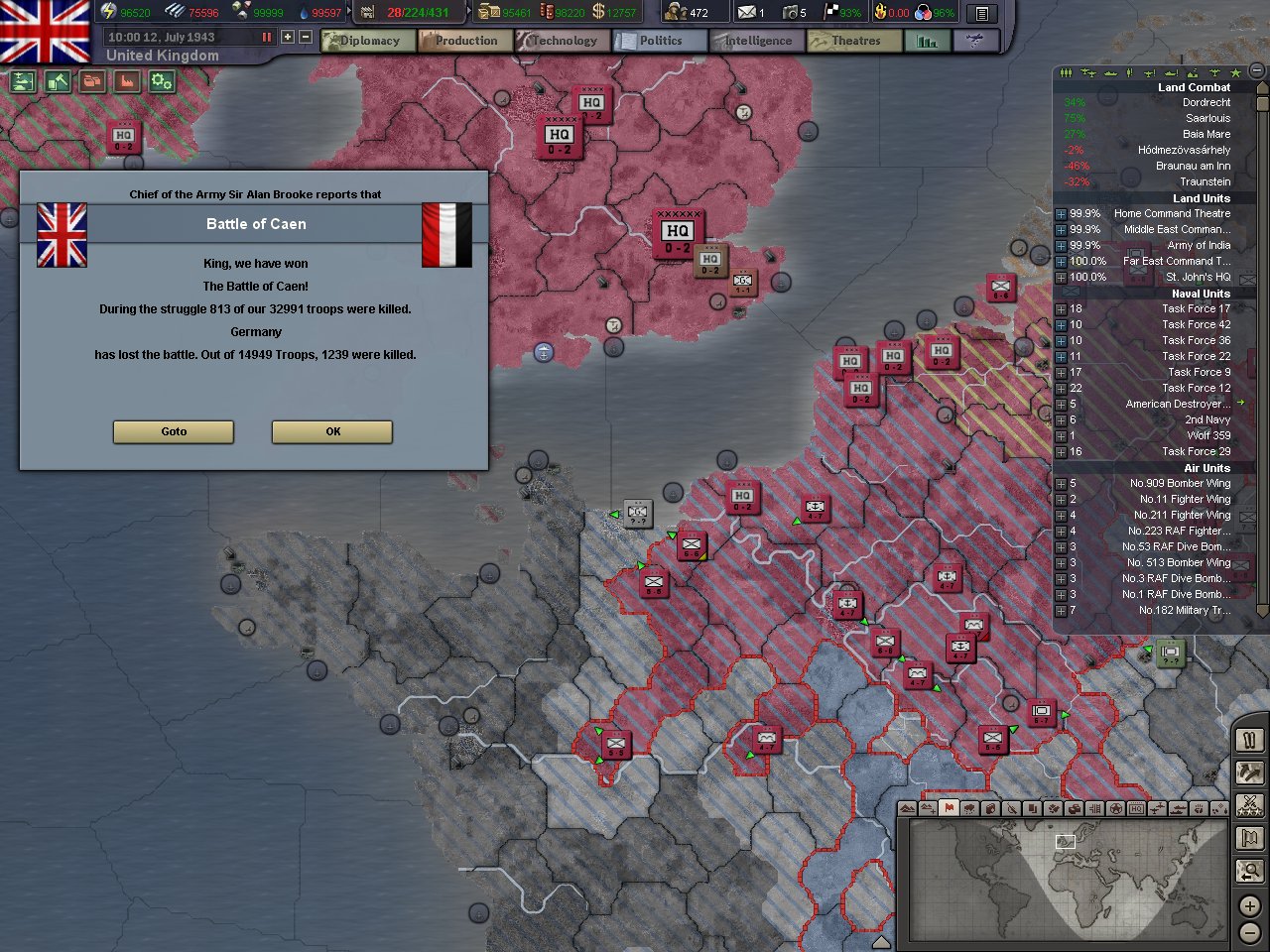
German resistance in France was now all but broken. Any divisions retreating west had ceased to exist as fighting units and the ones that had managed to make it to the east and towards Germany were being chased day and night. Our troops were close to Bordeaux and would soon be in Caen and Cherbourg with its deep water harbor.
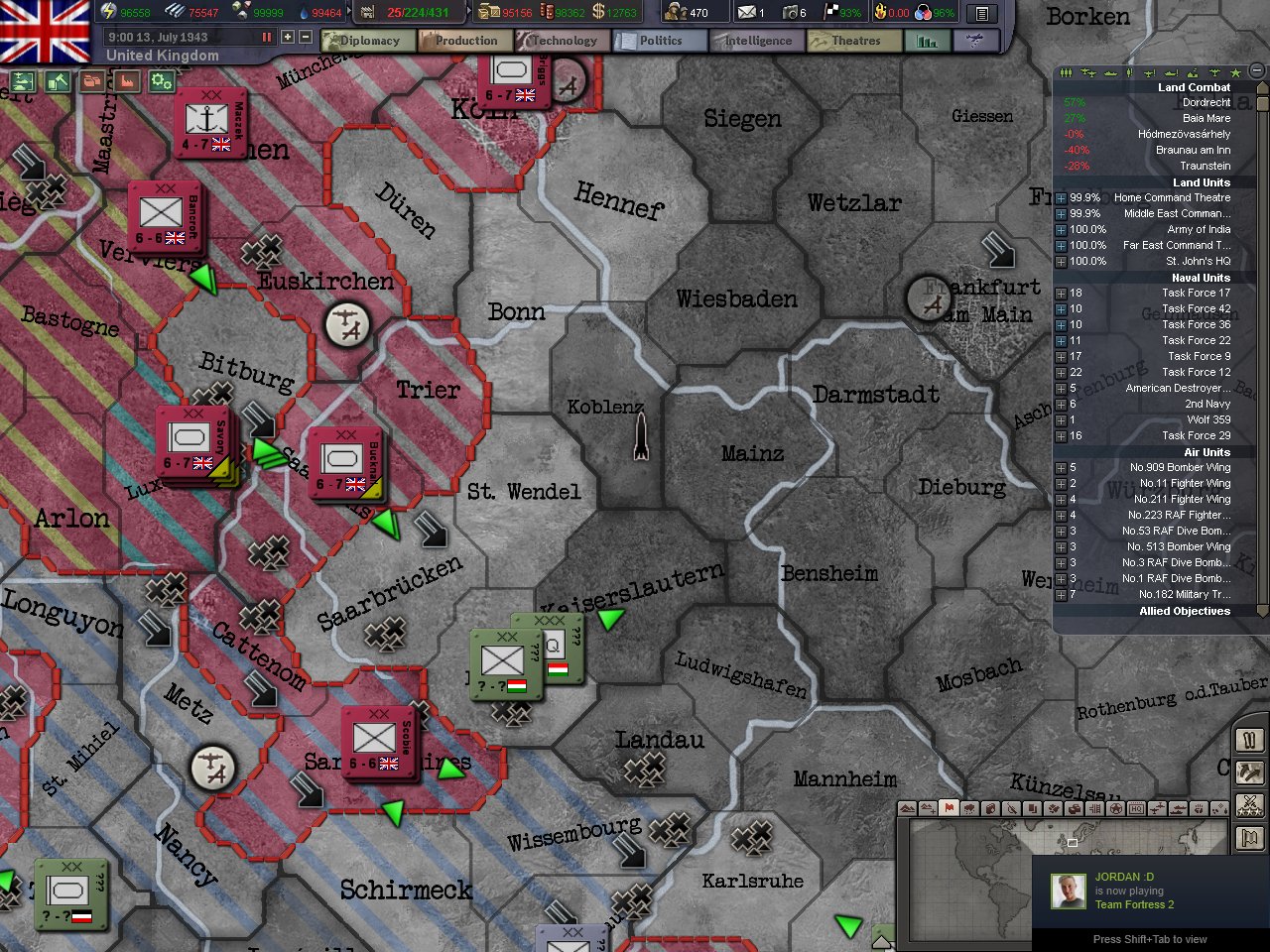
It had come to the attention of MI5 that the Germans had a rocket facility west of the city of Frankfurt, and as several armoured divisions began to near the facility. Suspected MI5 spies appeared at the front to make sure that any surviving German scientific research made its way to the proper hands and didn't disappear.
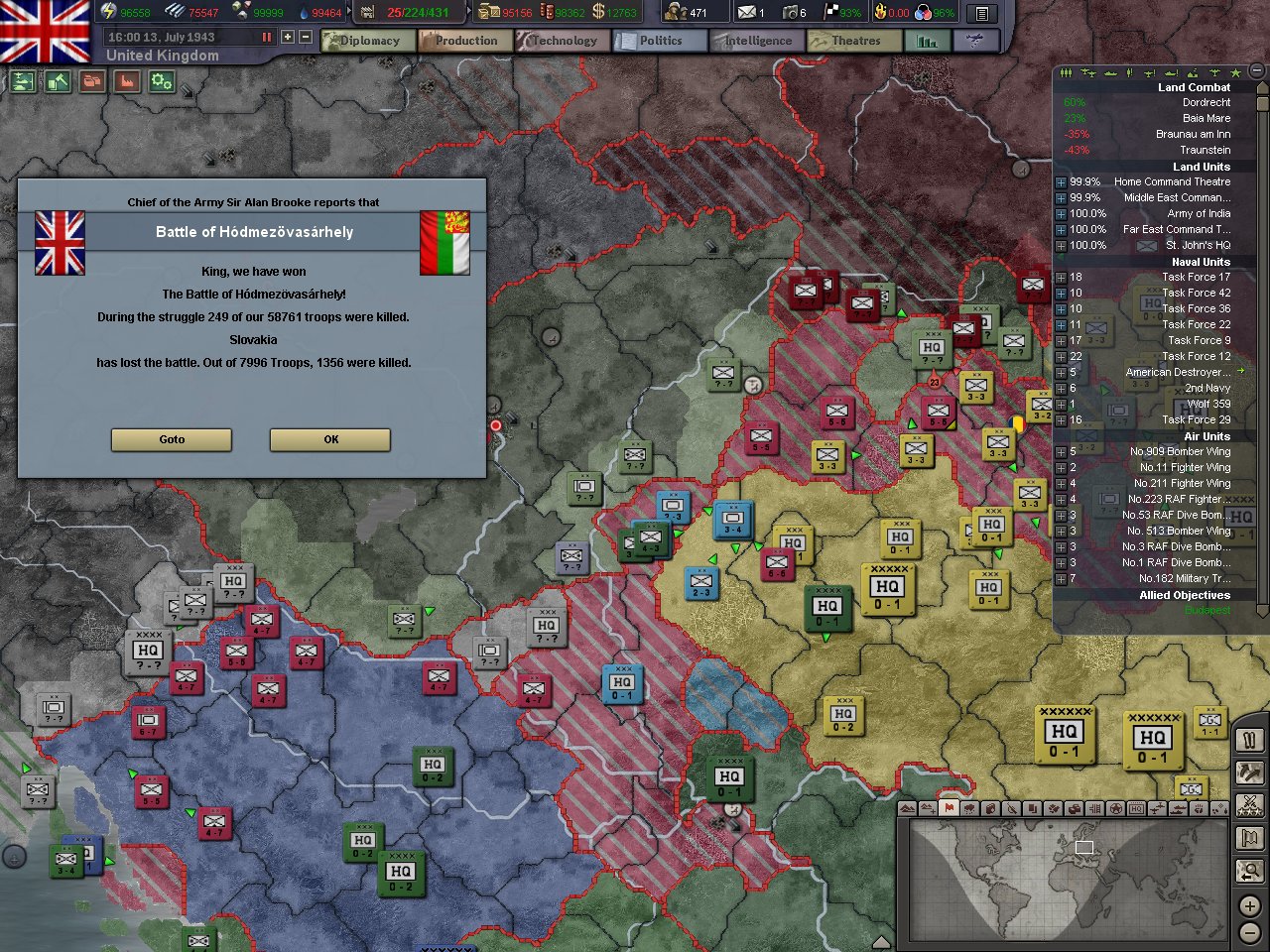
For a change finally a victory came out of the Balkans. A Slovakian division made several reckless attacks on our lines and was repulsed with bloody losses. The Soviets had also finally made some offensive moves in the sector and helped us complete an encirclement of several Hungarian divisions.
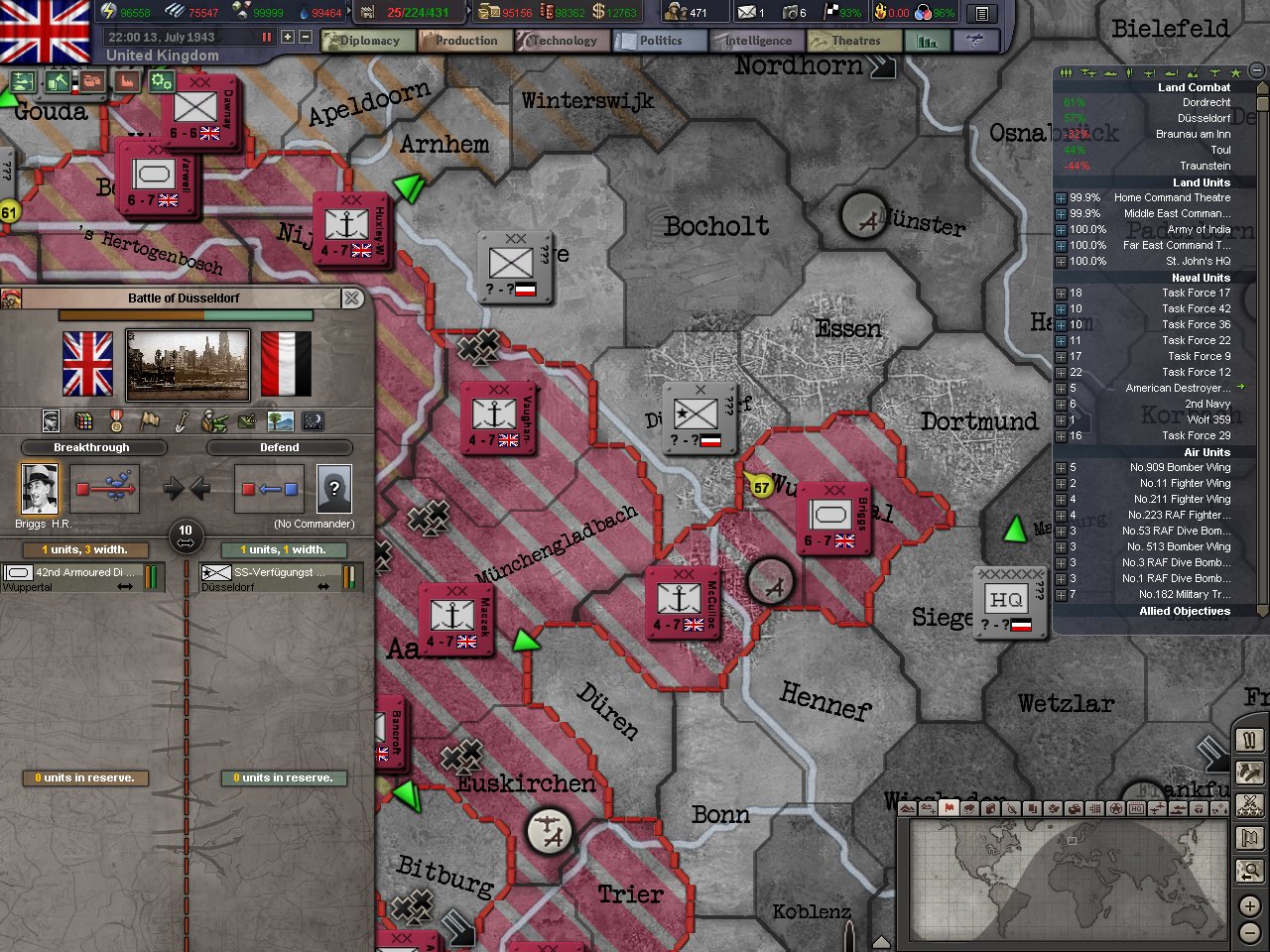
The so called 'Highland' 42nd Armoured division reached the outskirts of the city of Dusseldorf and commenced attacking the city. The city lay on a strategic position across a river and could present a very stiff obstacle on our path to Berlin if the Germans could hold it. But the SS division inside the city had apparently been deserted by its commander and without a cohesive command structure was easy pickings for our experienced tankers.
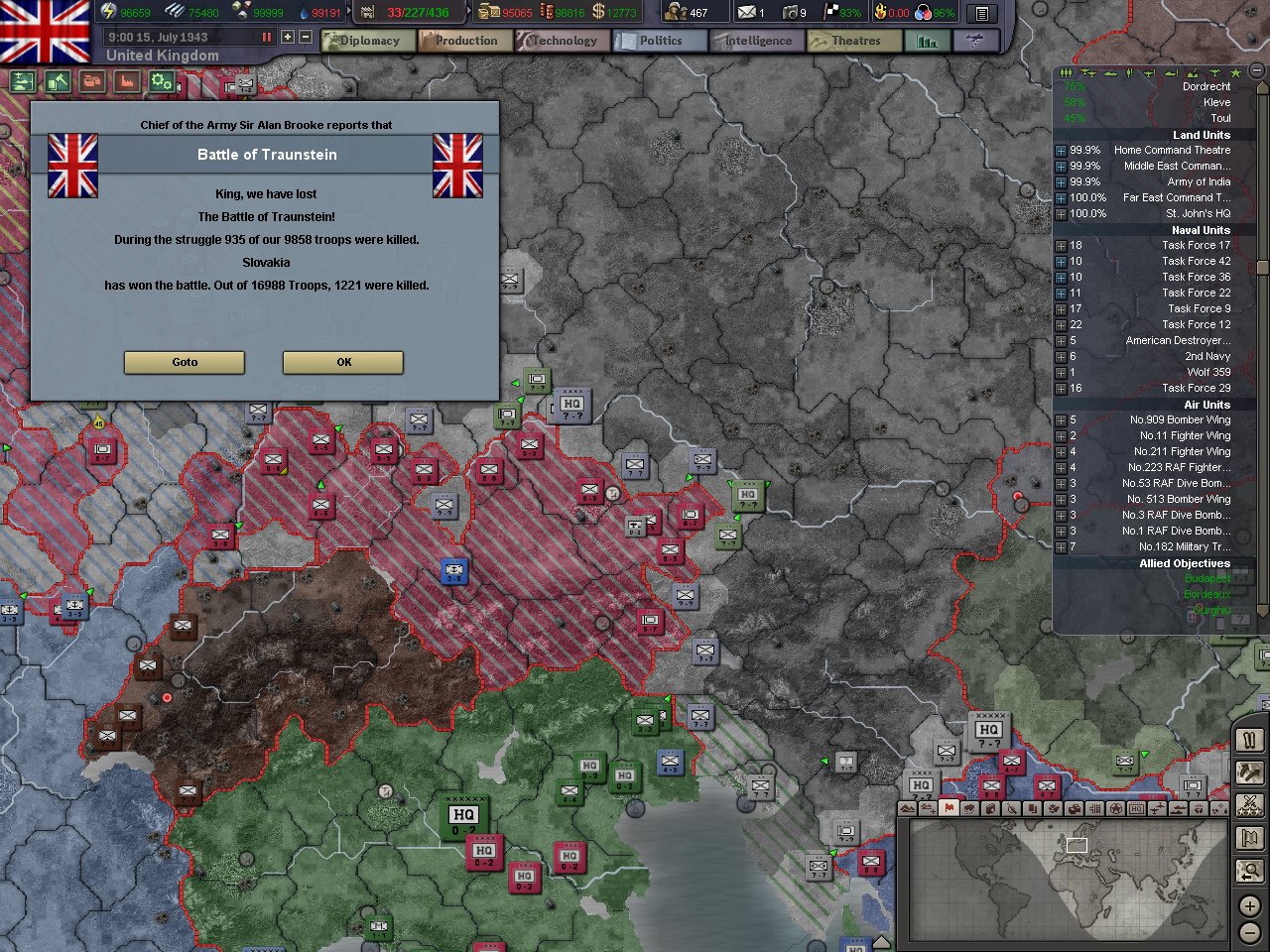
Even though our troops had formed almost one cohesive front from the Italian Alps to the city of Amsterdam, our troops were still not indestructible. Slovakian's and Germans fought us to a bloody stand still and halted our advance in the sector.
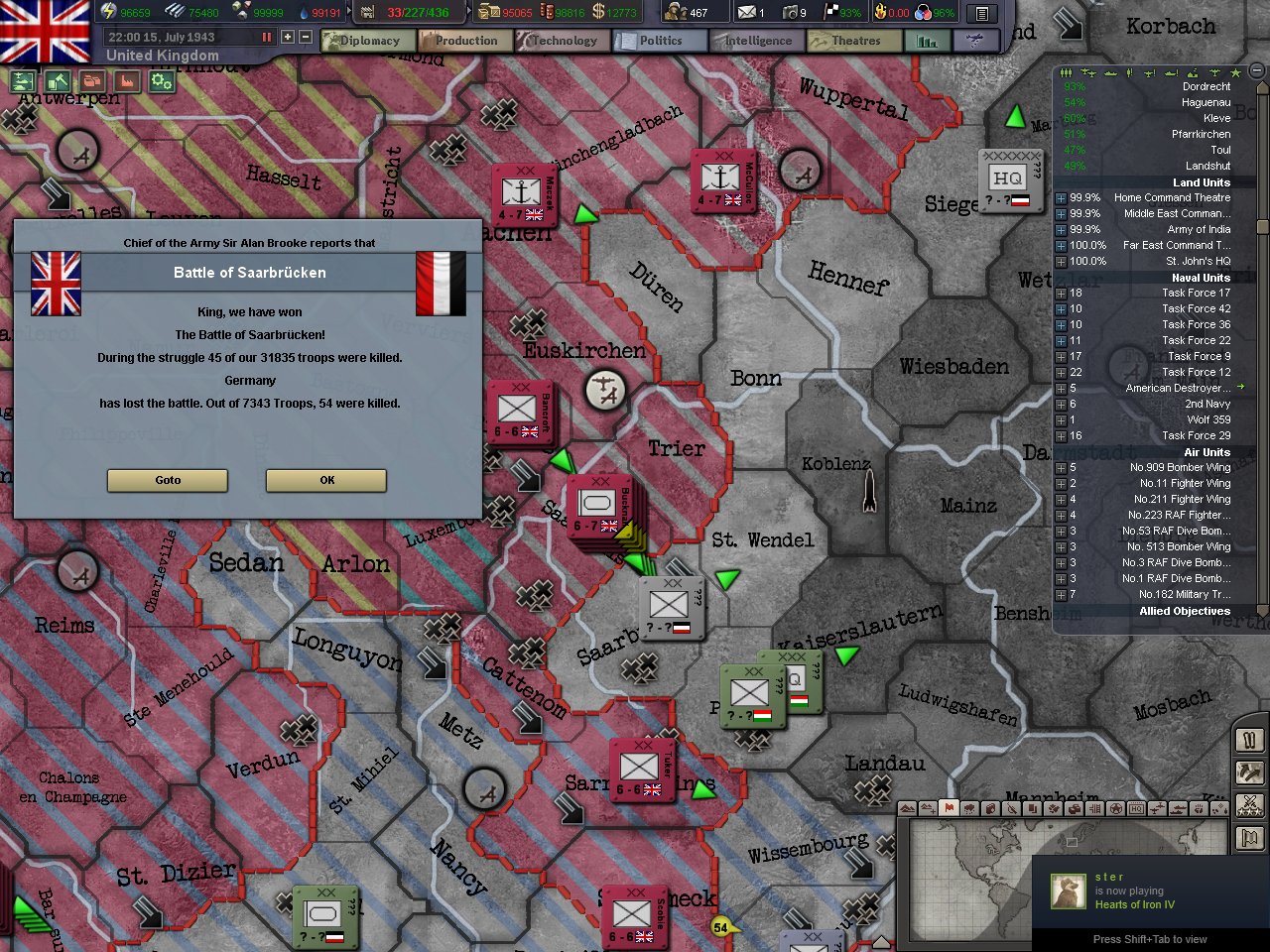
A massive armored and infantry spearhead smashed through the historic Saarbrucken region in Germany and forced the Germans back with light casualties. The operation to take the Saarbrucken was typical of our operations now, pin the enemy with infantry, hit their flanks with armor and more infantry. Repeat until in Berlin.
And as our troops fought across the Rhine and through the Netherlands our forces could not go fast enough. The Soviets were within 300 kilometers of Berlin and had an easier path, not to mention a shorter distance to cover.
And as our troops fought across the Rhine and through the Netherlands our forces could not go fast enough. The Soviets were within 300 kilometers of Berlin and had an easier path, not to mention a shorter distance to cover.
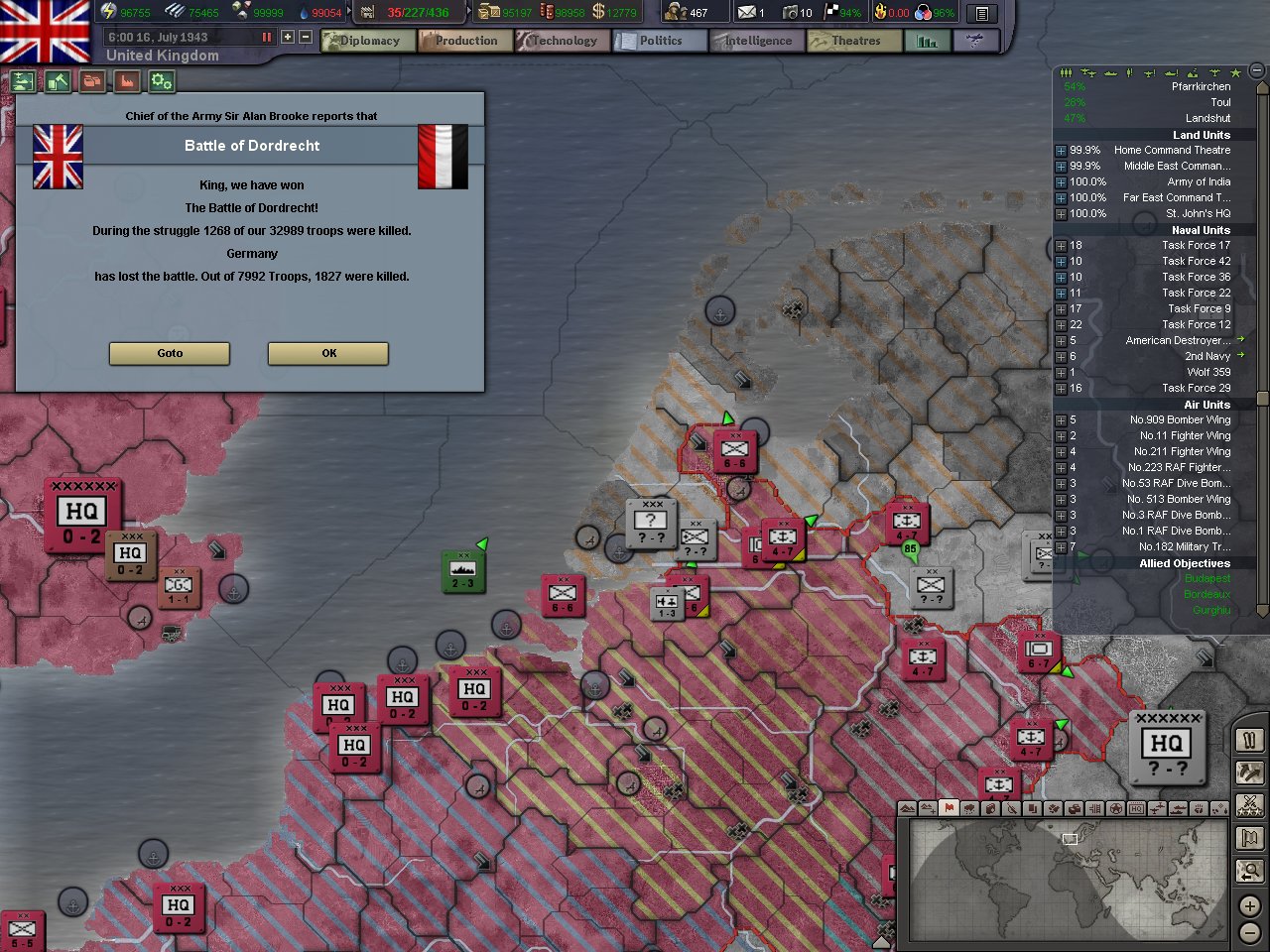
German forces in France had been forced back east and to the north. Two Waffen SS divisions had fallen back to the north and were making a stand around the Scheldt Estuary and were making us pay. Taking the Scheldt would open up the ports of Antwerp and several smaller harbors.
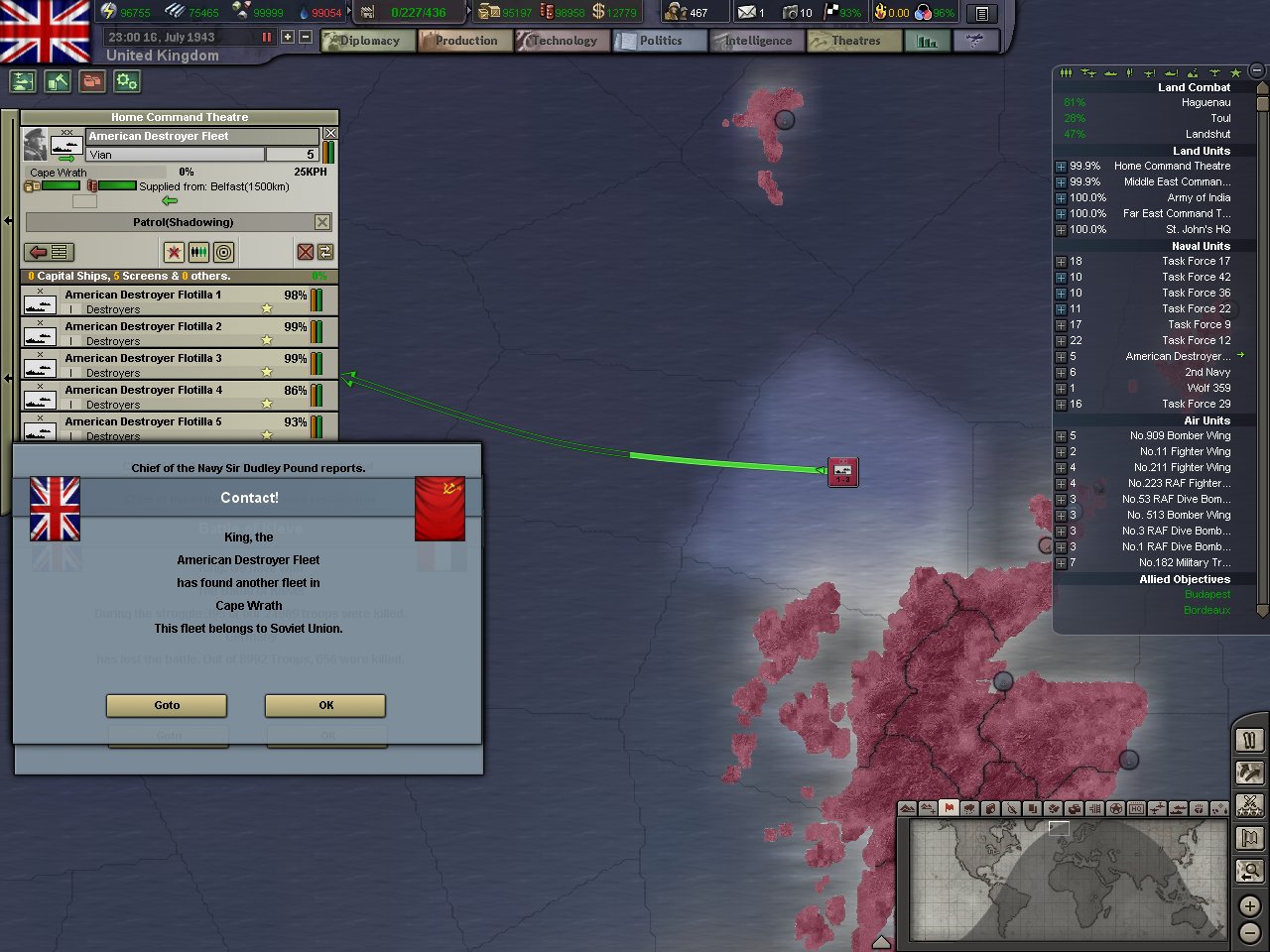
Like the German landing ships that were found off the coast of Scotland, a Soviet fleet was found lurking off the northern end of Scotland. The only reason that GHQ and the government could think of them being there was either dropping or picking up spies, or attempting to get a look on ships in Scapa Flow.
A show of force of several capital ships and a carrier were sent north and the Soviet fleet was prodded and followed back east towards the Baltic Sea.
A show of force of several capital ships and a carrier were sent north and the Soviet fleet was prodded and followed back east towards the Baltic Sea.
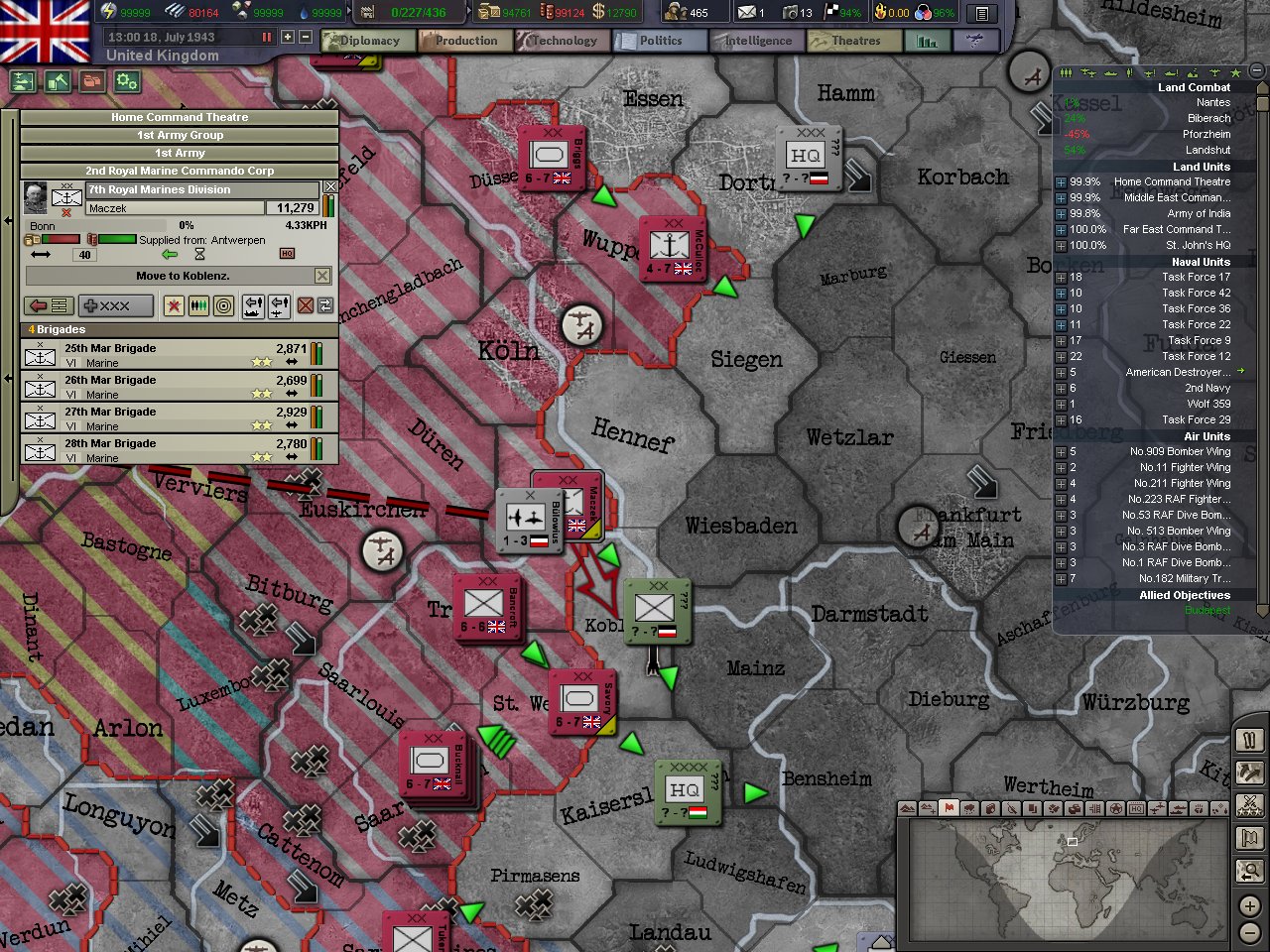
The men of the 7th Marines took the German rocket site at Koblenz after a short but brief fight against the troops holding it. MI5 operatives were quickly on the scene and policing up documents and anything and anyone that might be of a sensitive nature.
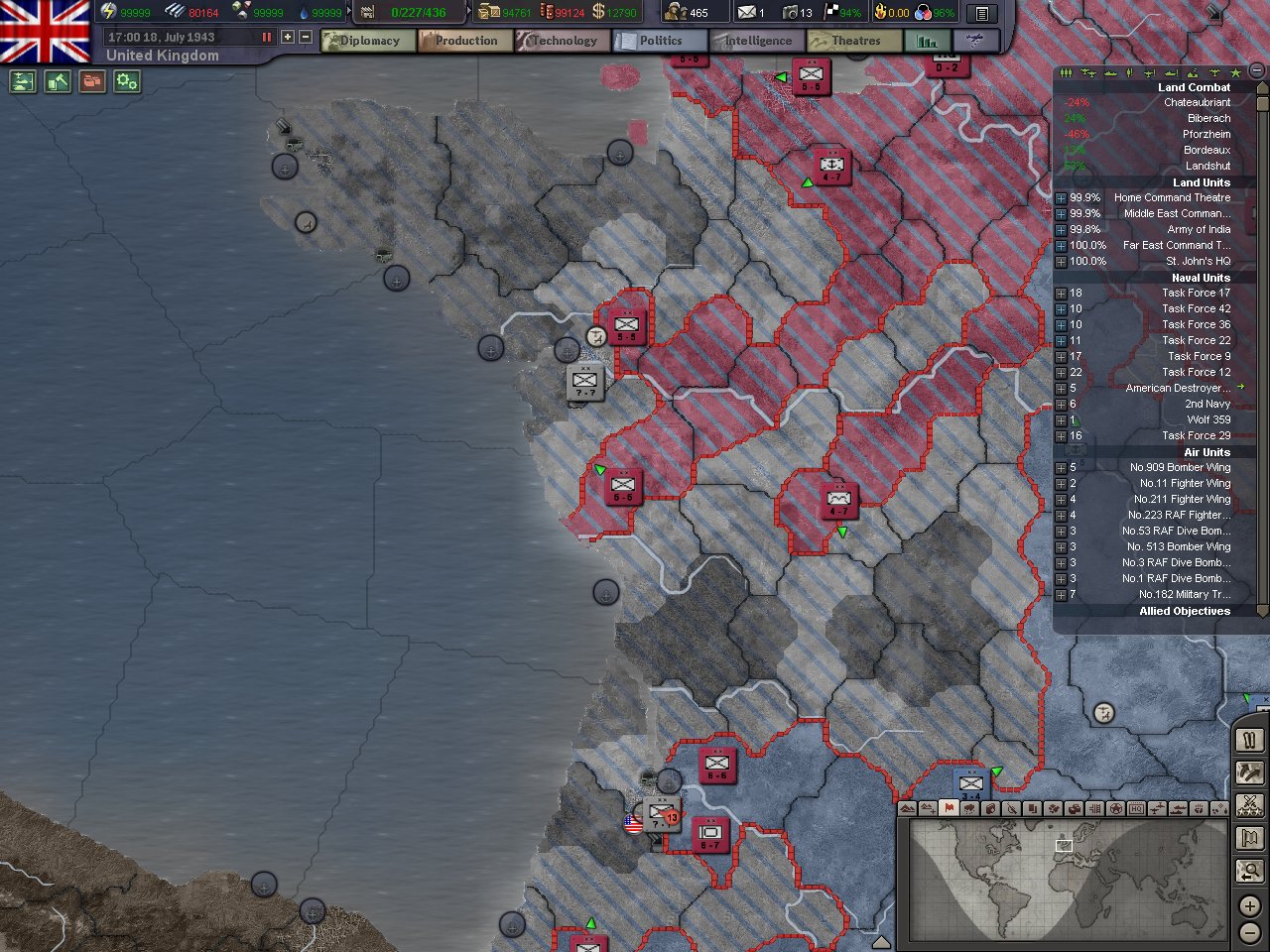
On the western coast of France two German divisions were dug into the cities of Bordeaux and Nantes, and dared us to dig them out. Assaults on Bordeaux were repelled with heavy losses, reinforcements were brought up from the Pyrenees and tanks would move around the city to fully surround it. Finally taking the city would cost 1,500 men and almost one hundred tanks. But the city finally fell after a week of fierce combat. Taking Nantes would take a week more but would only cost us eight hundred men.
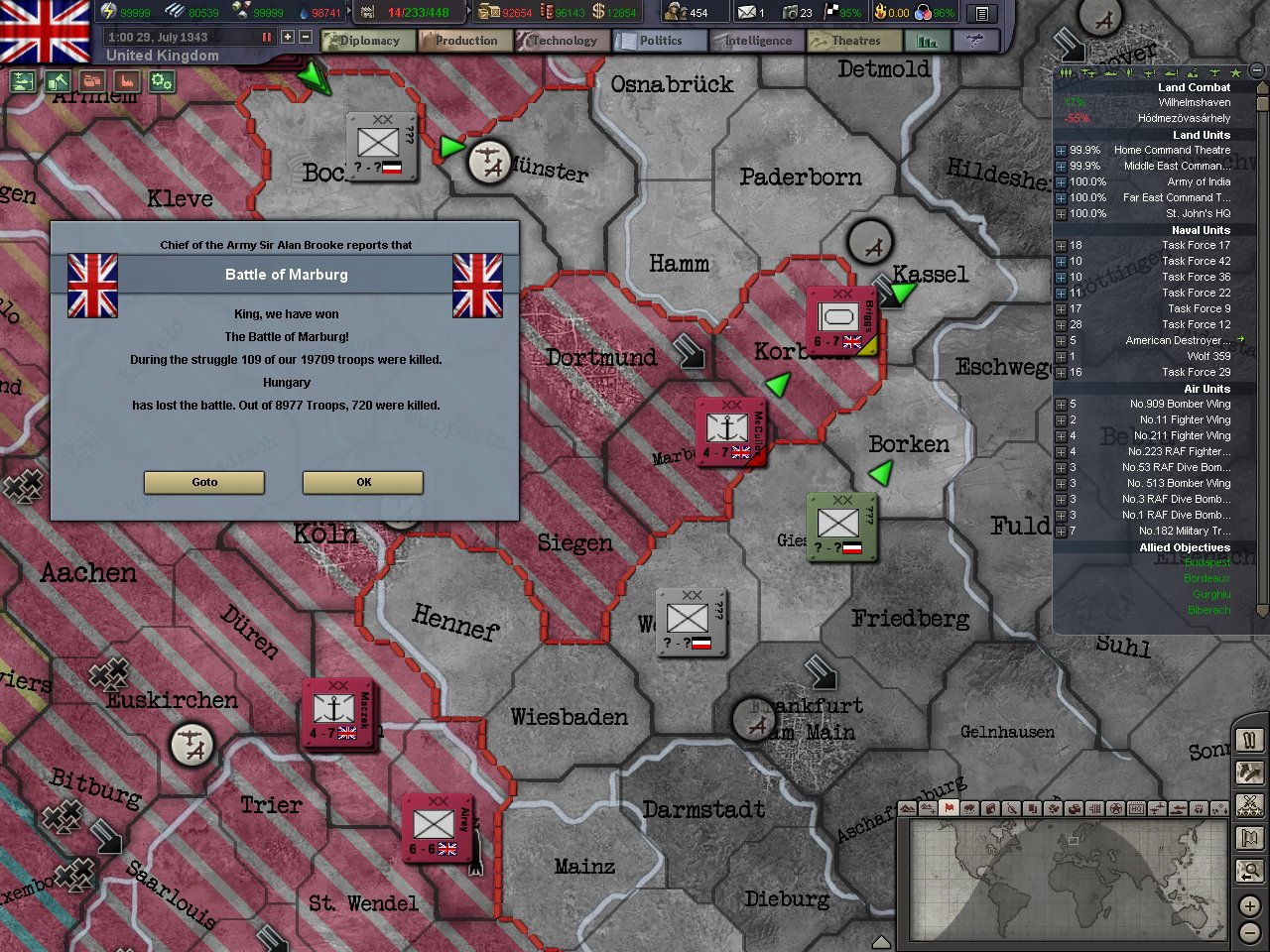
In Germany a Commando division and an armoured division were given the task of being the point of the spear for the entire army in Europe. These two divisions would be tasked with carving a path to Berlin that reinforcements could follow.
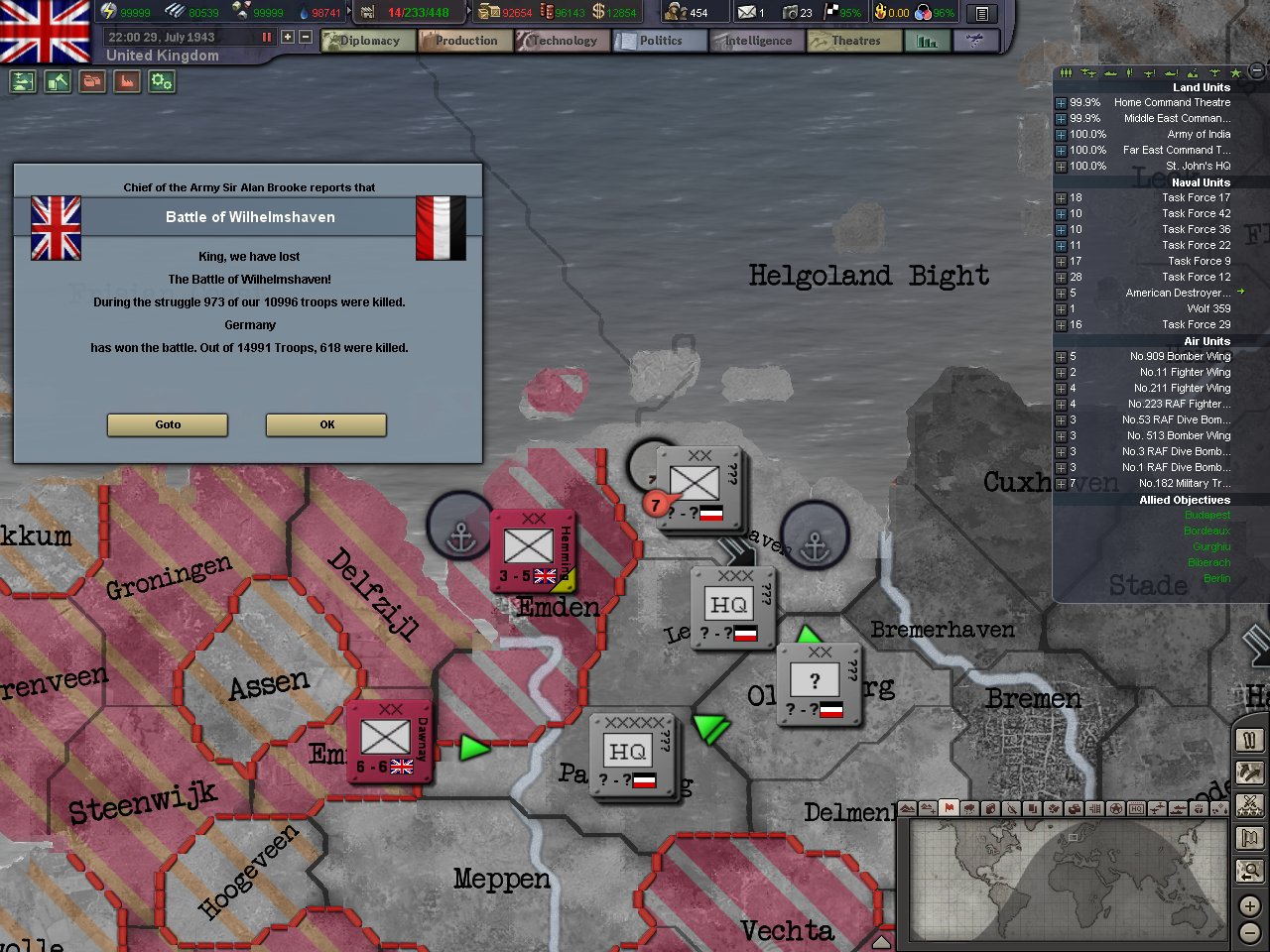
The last few days of July were bloody.
In the Balkans our forces were supporting an attack into Hungary with Greek forces and would be thrown back into Romania with 1,253 Empire men lost and almost 2,000 Greeks. It was a terrible day.
In Germany, several divisions were forming a defensive line infront of several major ports that were used for U-Boats. The goal, our intelligence supposed, was to stop our advance in the north and then plug in the gaps to the south as they reformed their army.
In the Balkans our forces were supporting an attack into Hungary with Greek forces and would be thrown back into Romania with 1,253 Empire men lost and almost 2,000 Greeks. It was a terrible day.
In Germany, several divisions were forming a defensive line infront of several major ports that were used for U-Boats. The goal, our intelligence supposed, was to stop our advance in the north and then plug in the gaps to the south as they reformed their army.
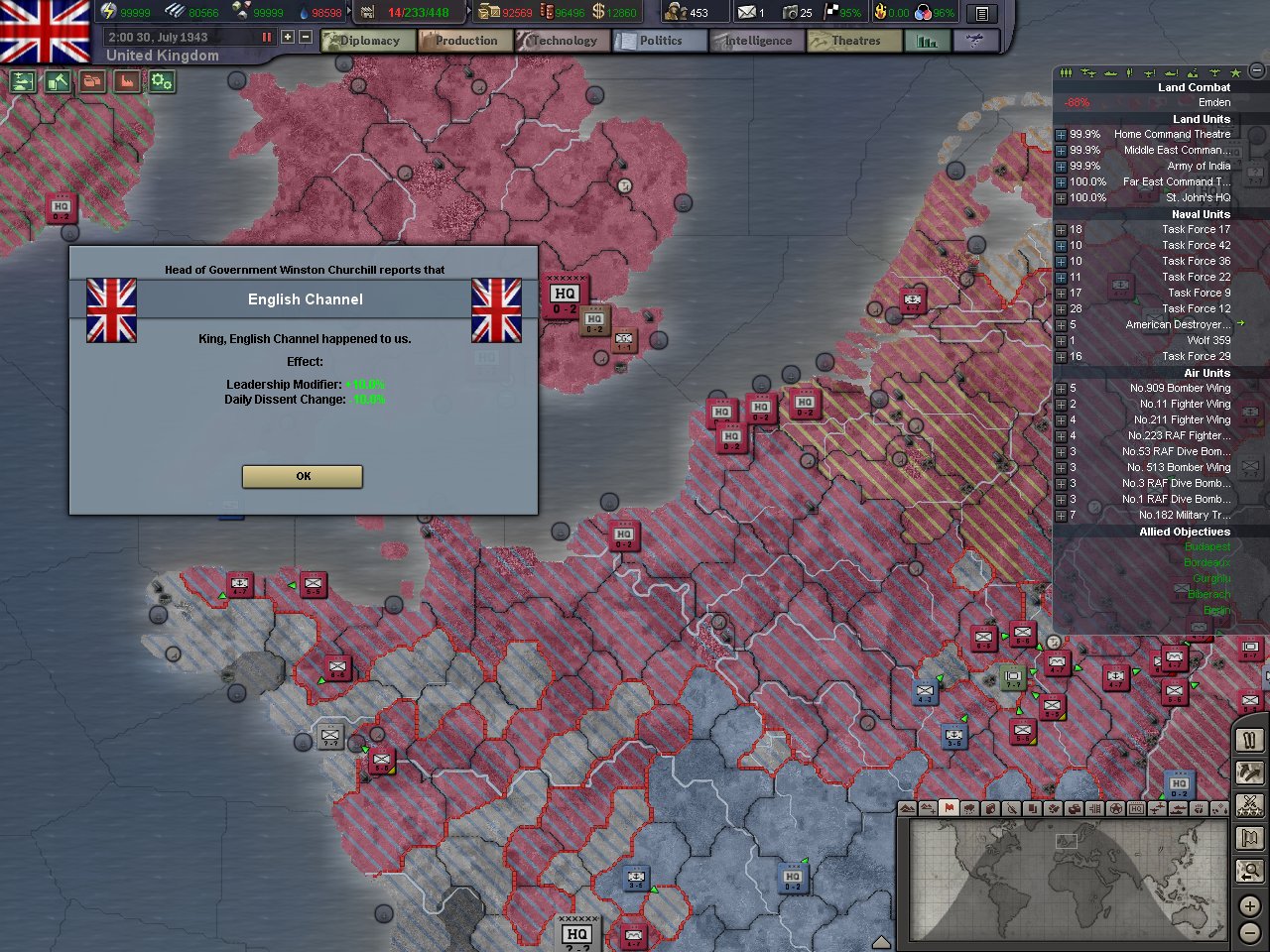
With Bordeaux secured and Brittany about to be secured, majority of France had been liberated from Nazi hands. Cities were free, there were no curfews and martial law was finally repealed. Life was returning to France.
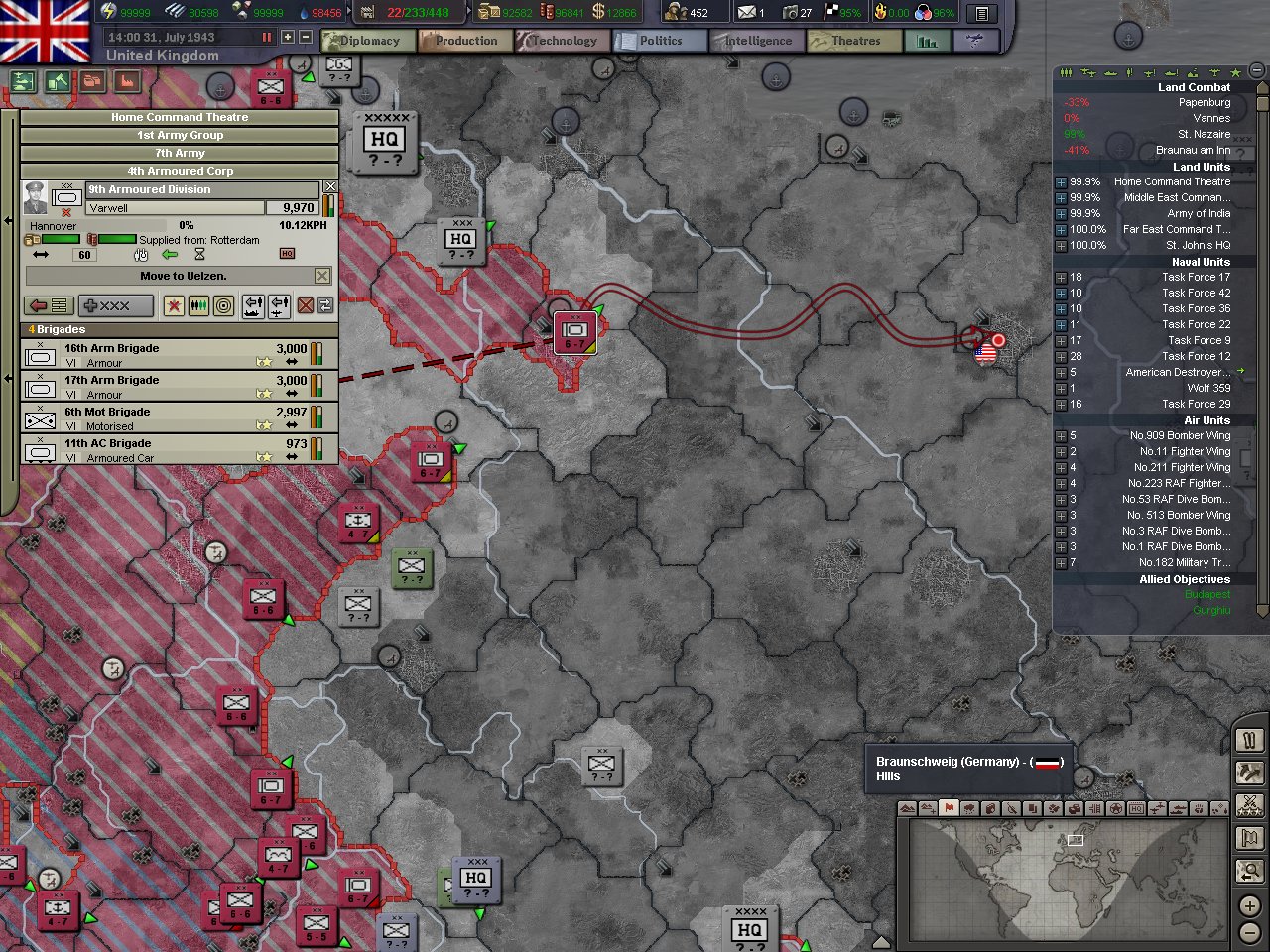
In a stunning series of events, the 9th Armoured Division was only 228 kilometers from Berlin. The 9th was the farthest east unit of our forces but the 42nd Armoured was close behind and ready to support the attack on Berlin. Soviet forces were only 208 kilometers and were about to hit the German defensive lines around the Seelow Heights. The race was coming into the final stretch.
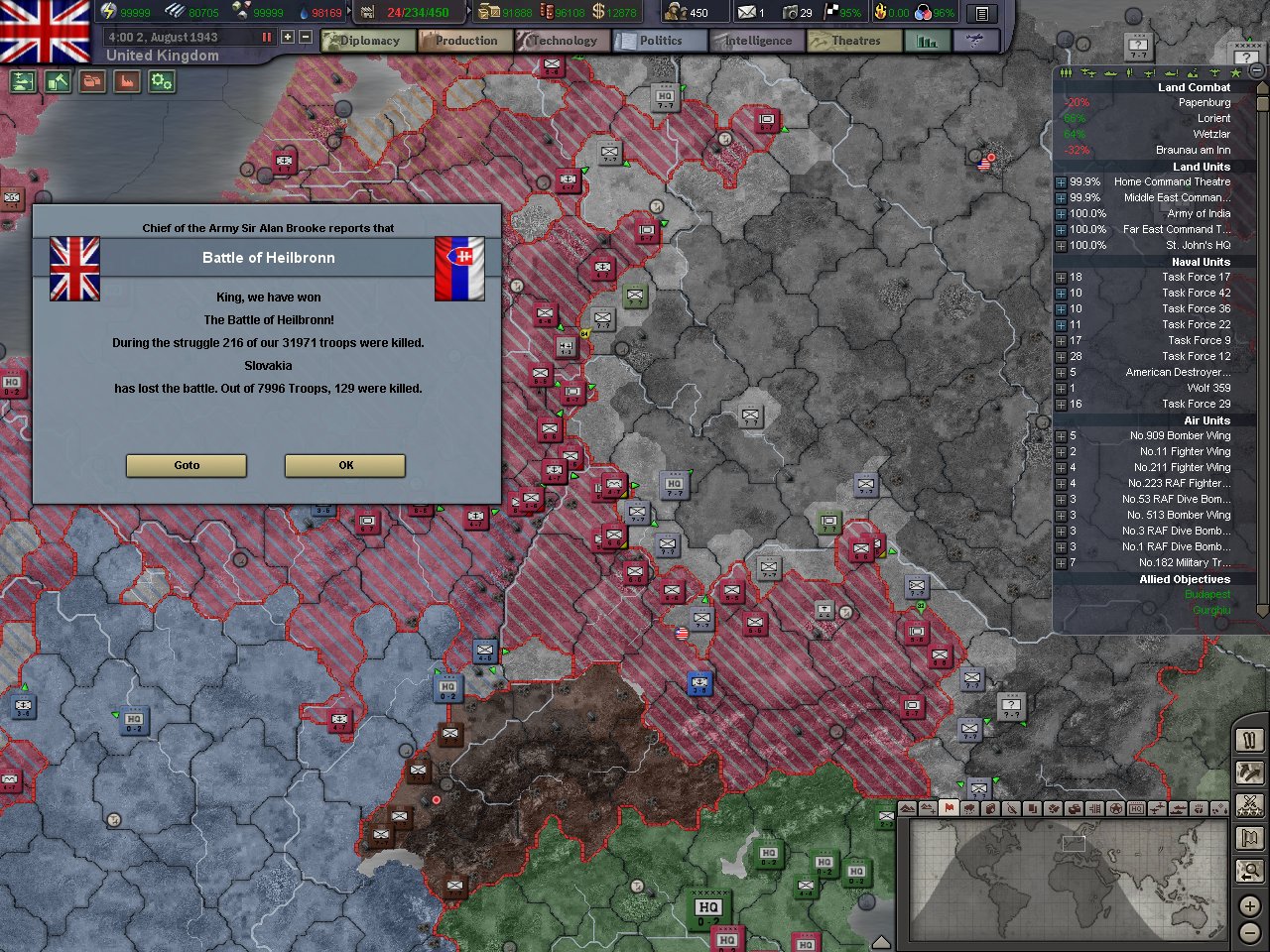
Our forces from France were now linking up in force with our troops in the Alps. Finally reinforcements were arriving and help was now on hand to push the Axis forces out of the Alps for good.
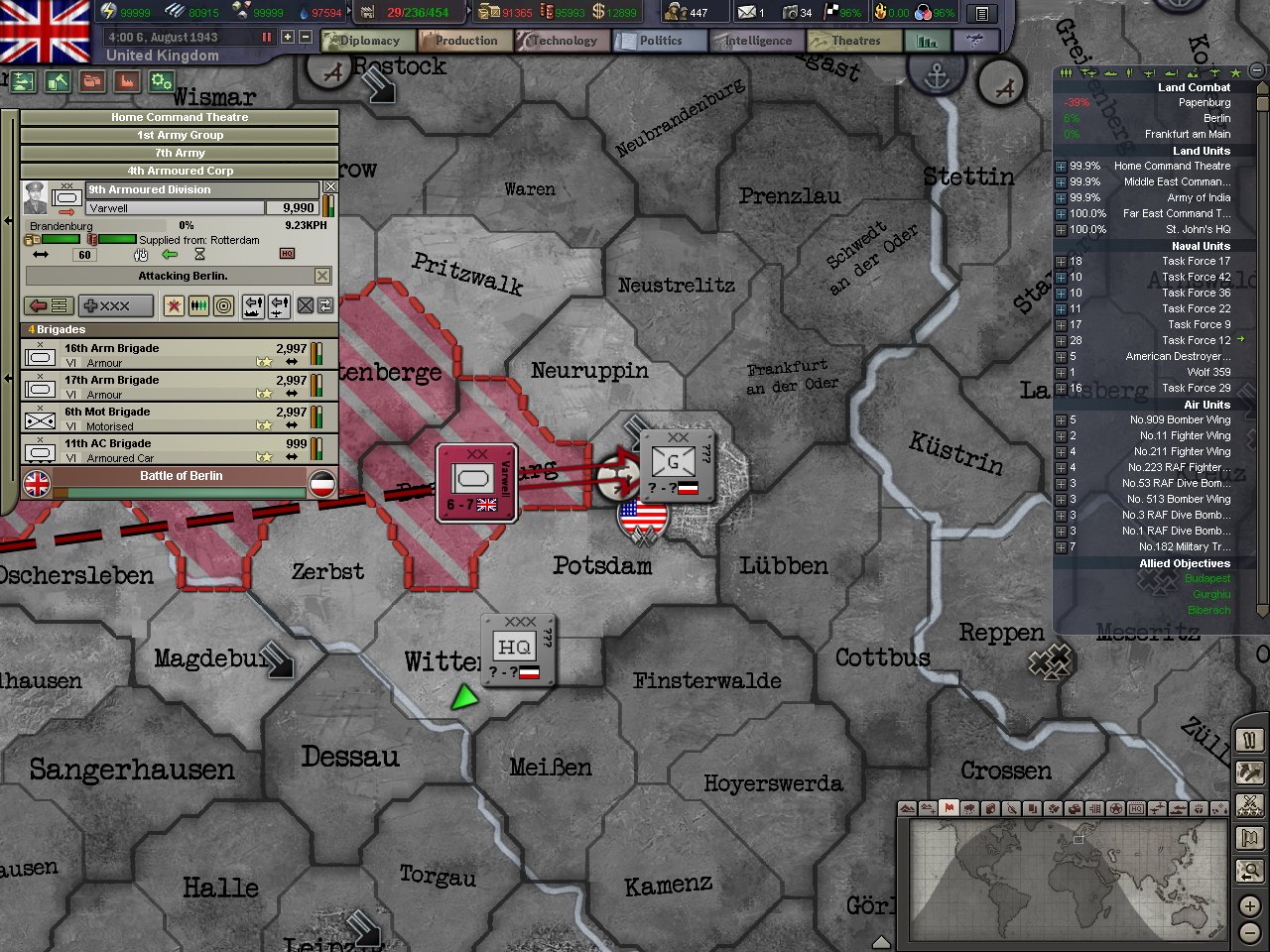
Six days after the 9th Armoured broke out from our lines in Germany, advance units of the division began the attack on Berlin. Initial probing attacks were not promising however but with the Guards Armoured coming up on the flank of the 9th. More tanks would hopefully be the thing to take the city.
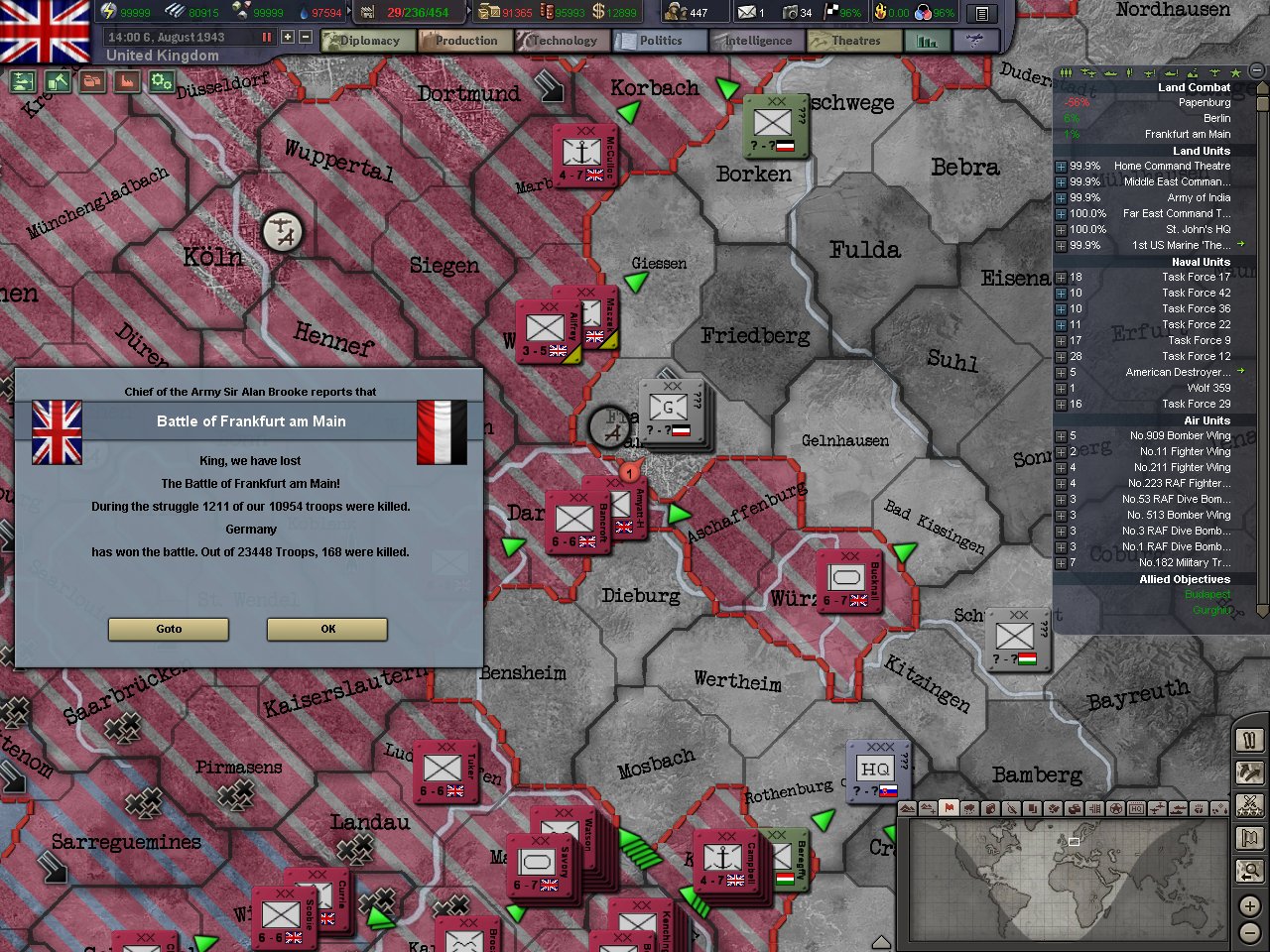
While tankers began to attack Berlin, infantry were making an assault onto the city of Frankfurt. Troops coming across the river to the south hoping to take the city from an angle the Germans would not suspect, were slaughtered. Further attacks were halted and more troops were ordered to surround the city from the north and further east.
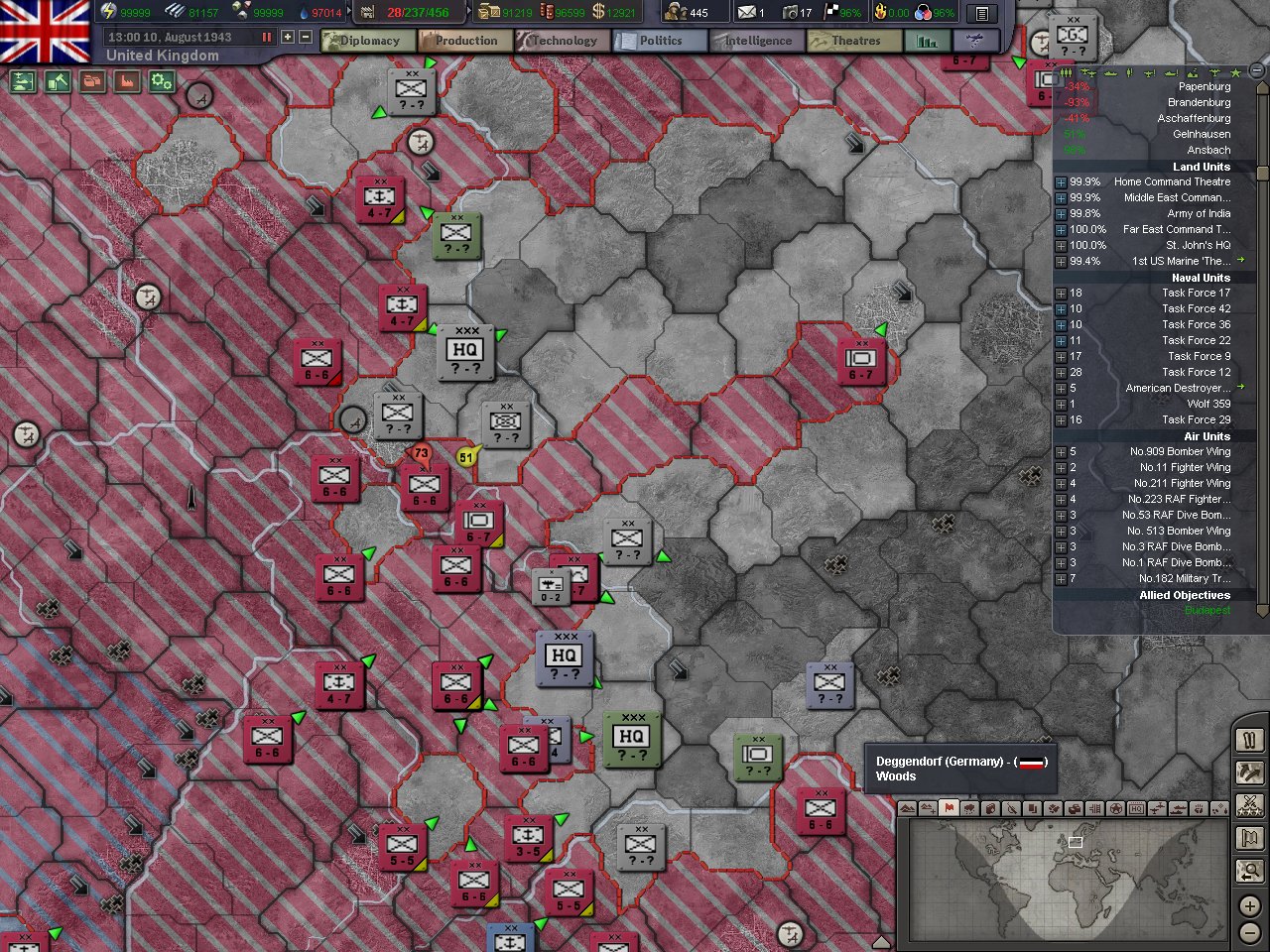
The situation on the 10th of August across the front in Germany was a diverse one.
Two armoured divisions were at Berlin and assaulting the city, and a third one was moving to add their weight to the attack. Three German divisions around the city of Frankfurt were fighting like beasts and inflicting severe causalities on our forces. In the Alps, some Axis divisions were still dug in on mountain sides and did not plan on being moved.
Even with the possible end in sight, the Germans and their small group of allies were fighting like madmen.
Two armoured divisions were at Berlin and assaulting the city, and a third one was moving to add their weight to the attack. Three German divisions around the city of Frankfurt were fighting like beasts and inflicting severe causalities on our forces. In the Alps, some Axis divisions were still dug in on mountain sides and did not plan on being moved.
Even with the possible end in sight, the Germans and their small group of allies were fighting like madmen.
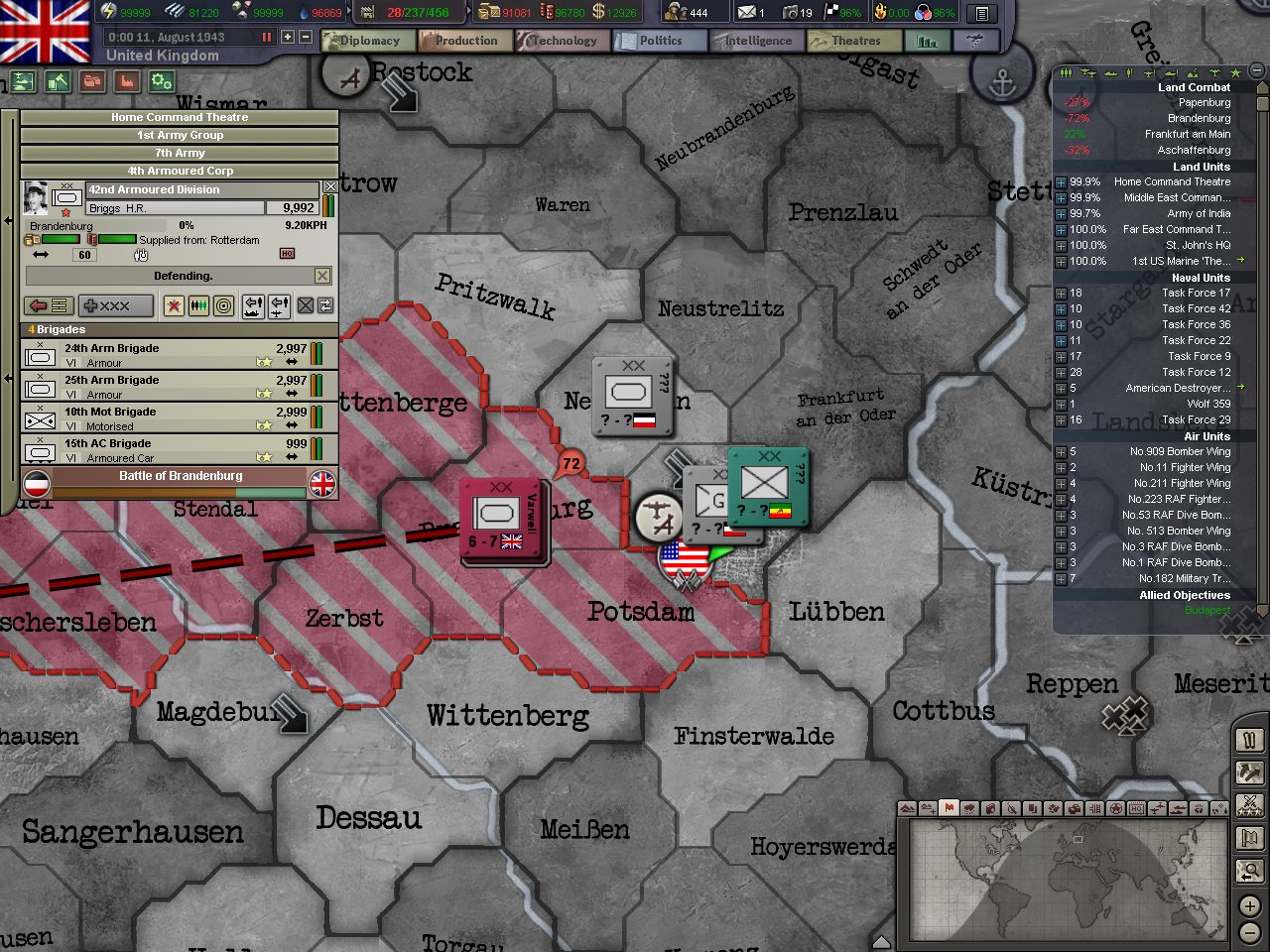
As the situation around Berlin continued to develop, something strange came into the fight.
An Ethiopian infantry division marched into the fight. Ethiopia, who had been knocked out of the war officially, in one of our first major operations, was now marching to defend the Nazi capital of Berlin. What a strange war this was becoming.
An Ethiopian infantry division marched into the fight. Ethiopia, who had been knocked out of the war officially, in one of our first major operations, was now marching to defend the Nazi capital of Berlin. What a strange war this was becoming.
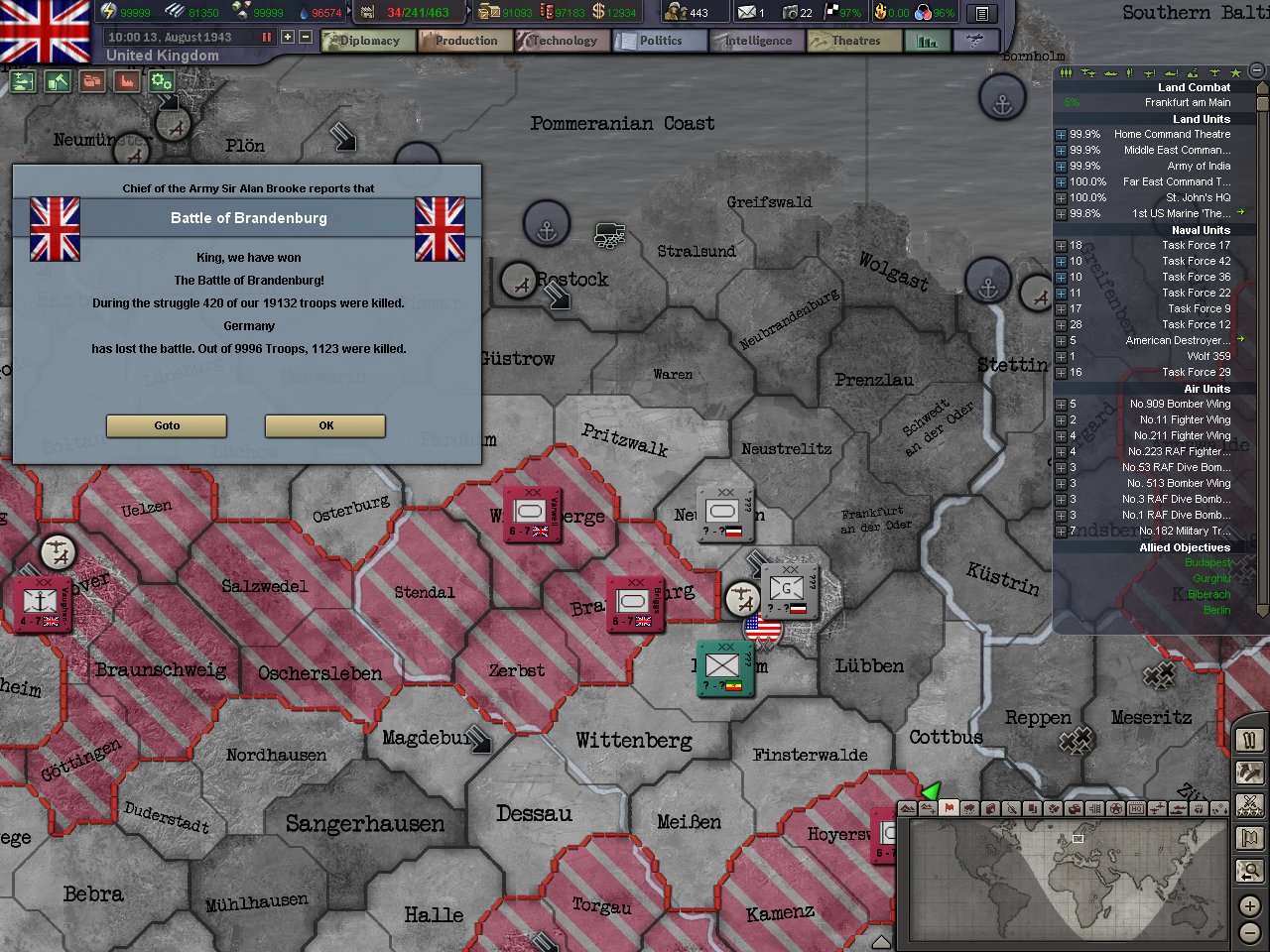
A German light panzer division's attack was repelled, and by now three of our armored divisions were in position around Berlin. The 42nd and Guards Armored would lead the assault, the 42nd from the west and the Guards from the east. The attack would have to be made quick as our tank crews could hear sounds of the Soviets battling their way through a German defensive line.
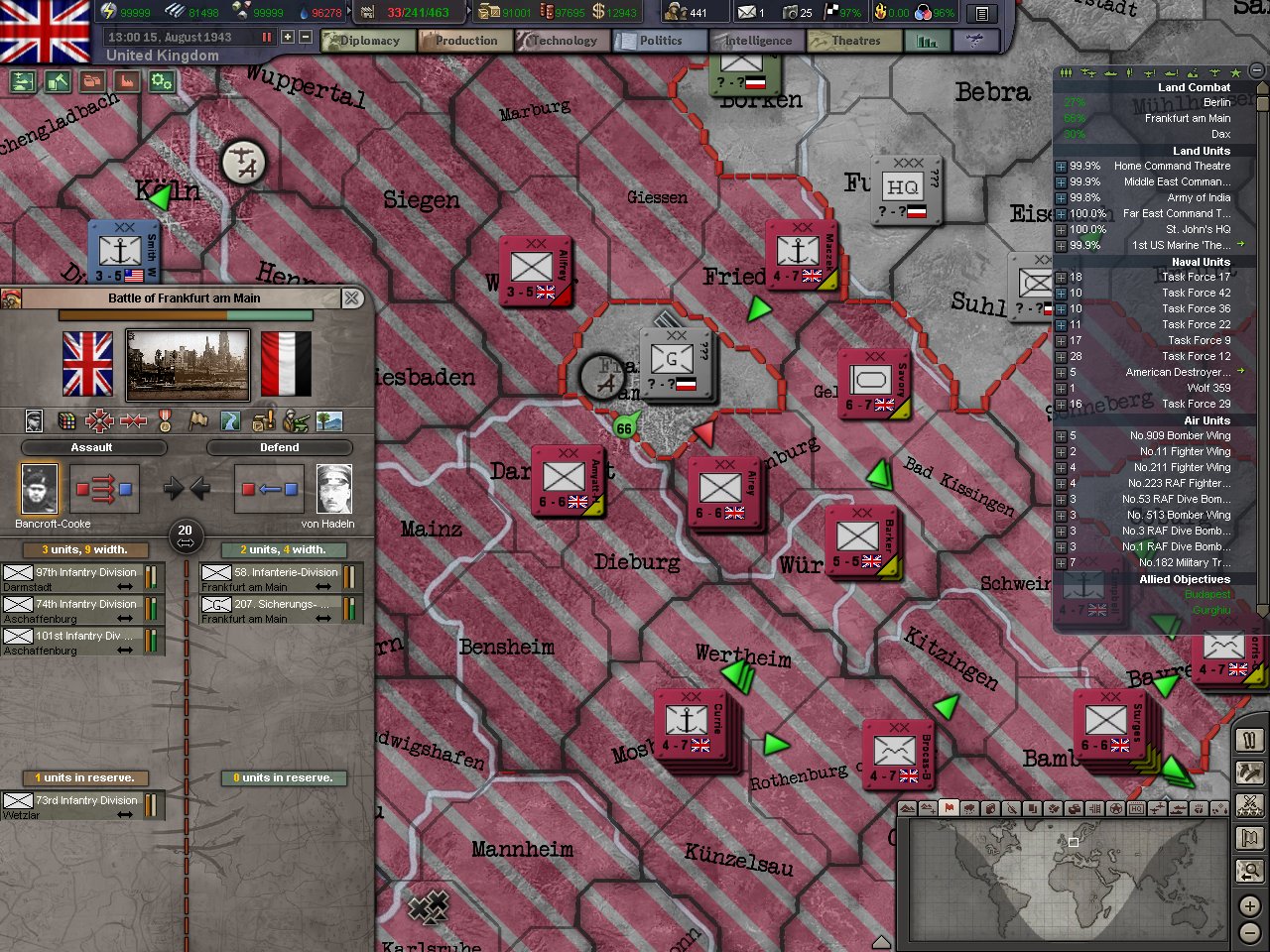
The city of Frankfurt was surrounded and pleas for the two German divisions inside to surrender was met by only gun shots and shouts to bugger off. The fight in Frankfurt would be to the death and would see some of the most brutal fighting of the war. The battle would only last two days but would cost us almost two thousand men and two thousand on the German side.
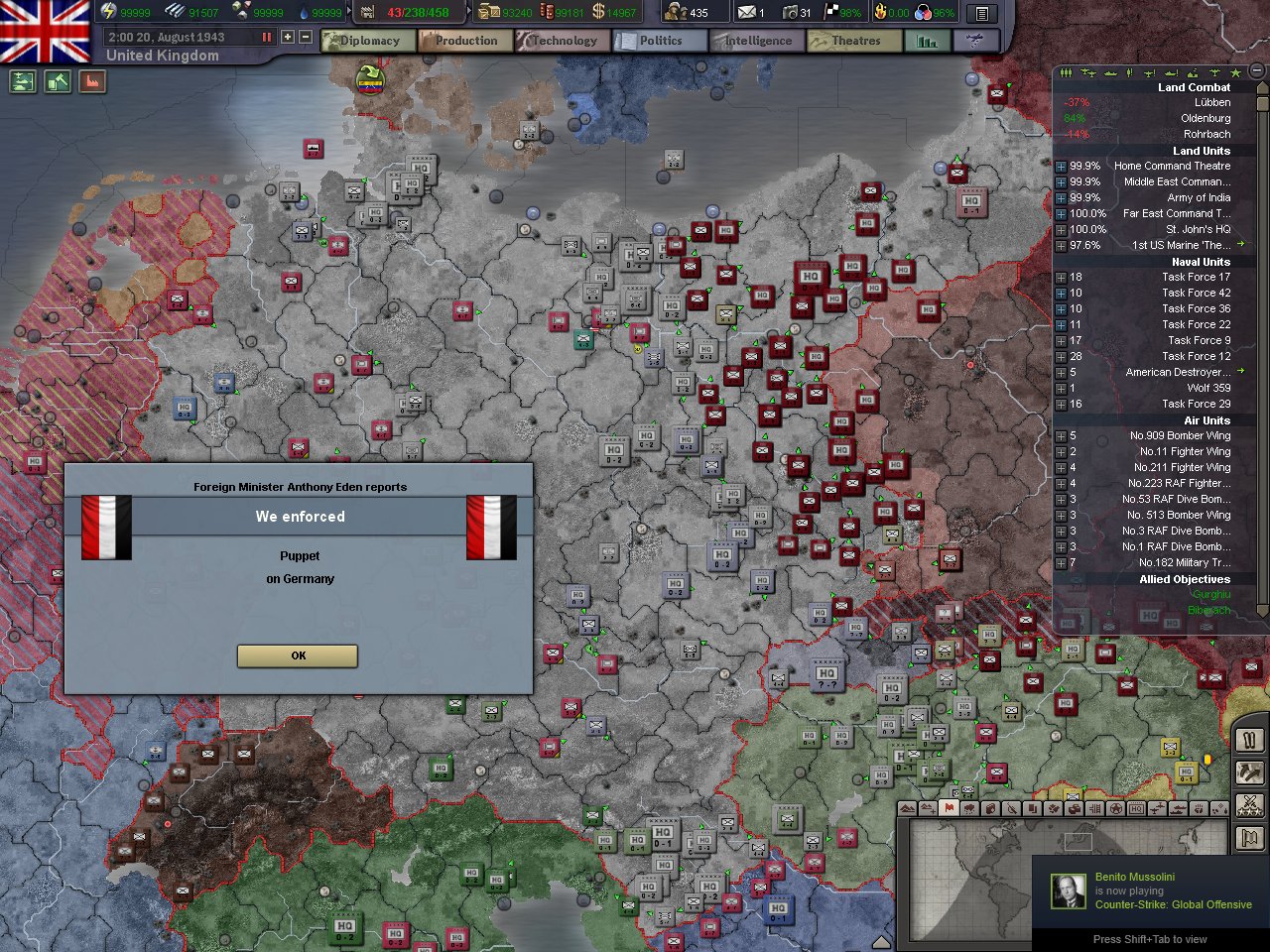
And finally, on August the 20th, the 42nd Armored Division entered the center of Berlin, took the Reichstag and captured the city.
In comparison to other battles in Europe and during the war, The Battle of Berlin was comparatively small scale. The 42nd and Guards would only lose 600 while the Germans would lose 900. Rear elements of the Guards actually had to turn advance scouts of Soviet divisions away and told them that the British Empire was here and Berlin was ours.
In comparison to other battles in Europe and during the war, The Battle of Berlin was comparatively small scale. The 42nd and Guards would only lose 600 while the Germans would lose 900. Rear elements of the Guards actually had to turn advance scouts of Soviet divisions away and told them that the British Empire was here and Berlin was ours.
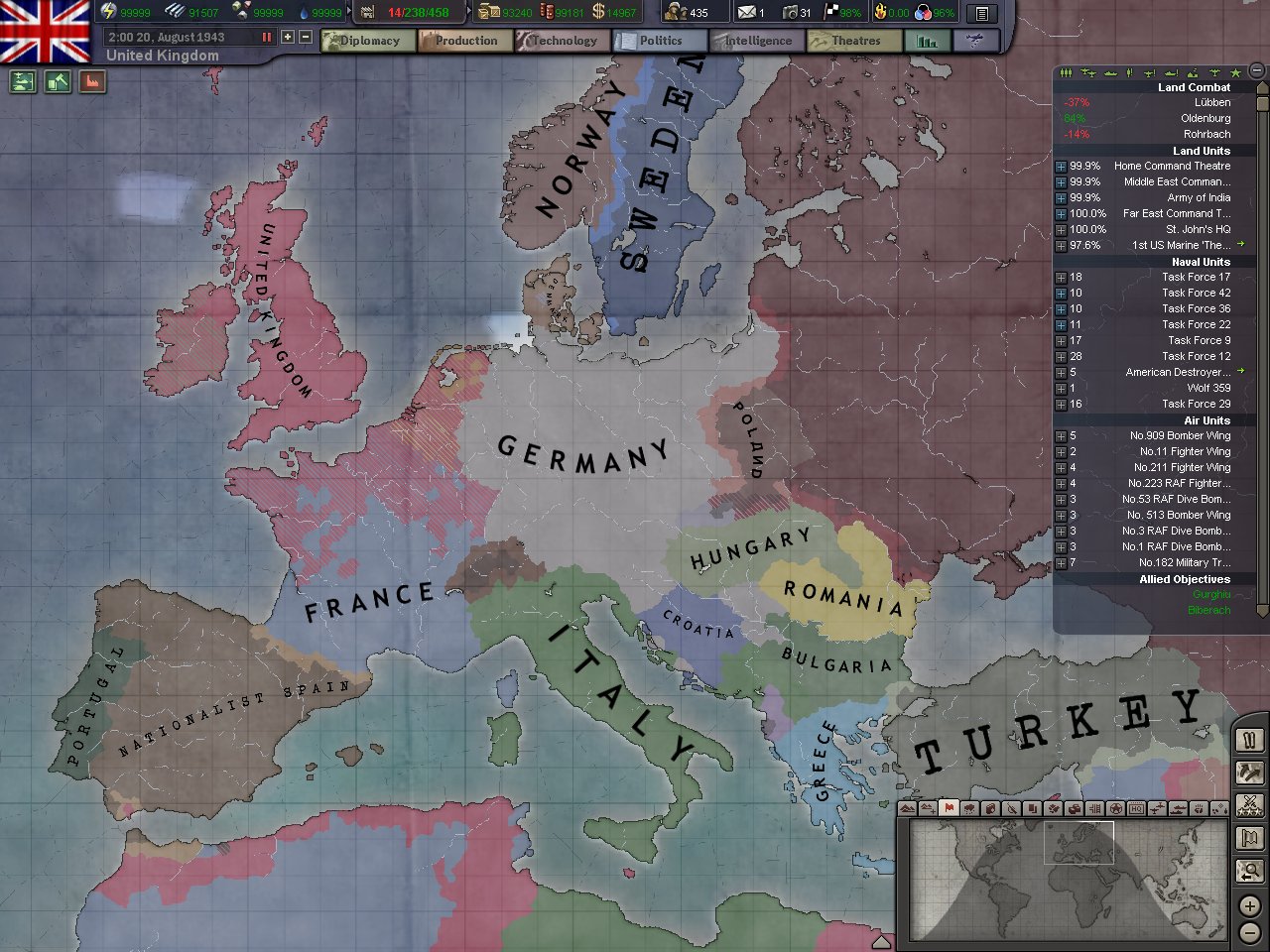
The war in Europe was now over. After four years of warfare across African deserts, Greek mountains, the hills of Italy, hedgerows of France and plains of Germany. It was over. At least in Europe.
The war was far from over in the Far East and many corps that had just finished fighting in Europe would be reorganized and sent out east to help finish the fight. The elite units of the Paras and the Commandos were two of the most likely units that would be going.
Divisions would be left to occupy and help rebuild Germany to get the nation back on its feet. It would take time to redistribute and reorganize the several armies in Europe. Deployment orders would surely come but for now the troops would have a few weeks off. Some units had been fighting for three years straight while others had only been in combat a few brief months.
No matter how combat experienced the soldiers were,there was plenty of fight left to come to the east.
The war was far from over in the Far East and many corps that had just finished fighting in Europe would be reorganized and sent out east to help finish the fight. The elite units of the Paras and the Commandos were two of the most likely units that would be going.
Divisions would be left to occupy and help rebuild Germany to get the nation back on its feet. It would take time to redistribute and reorganize the several armies in Europe. Deployment orders would surely come but for now the troops would have a few weeks off. Some units had been fighting for three years straight while others had only been in combat a few brief months.
No matter how combat experienced the soldiers were,there was plenty of fight left to come to the east.




